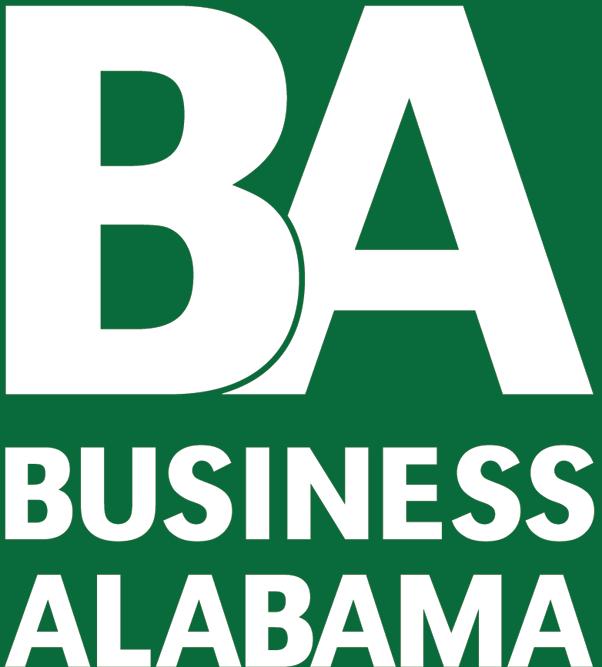




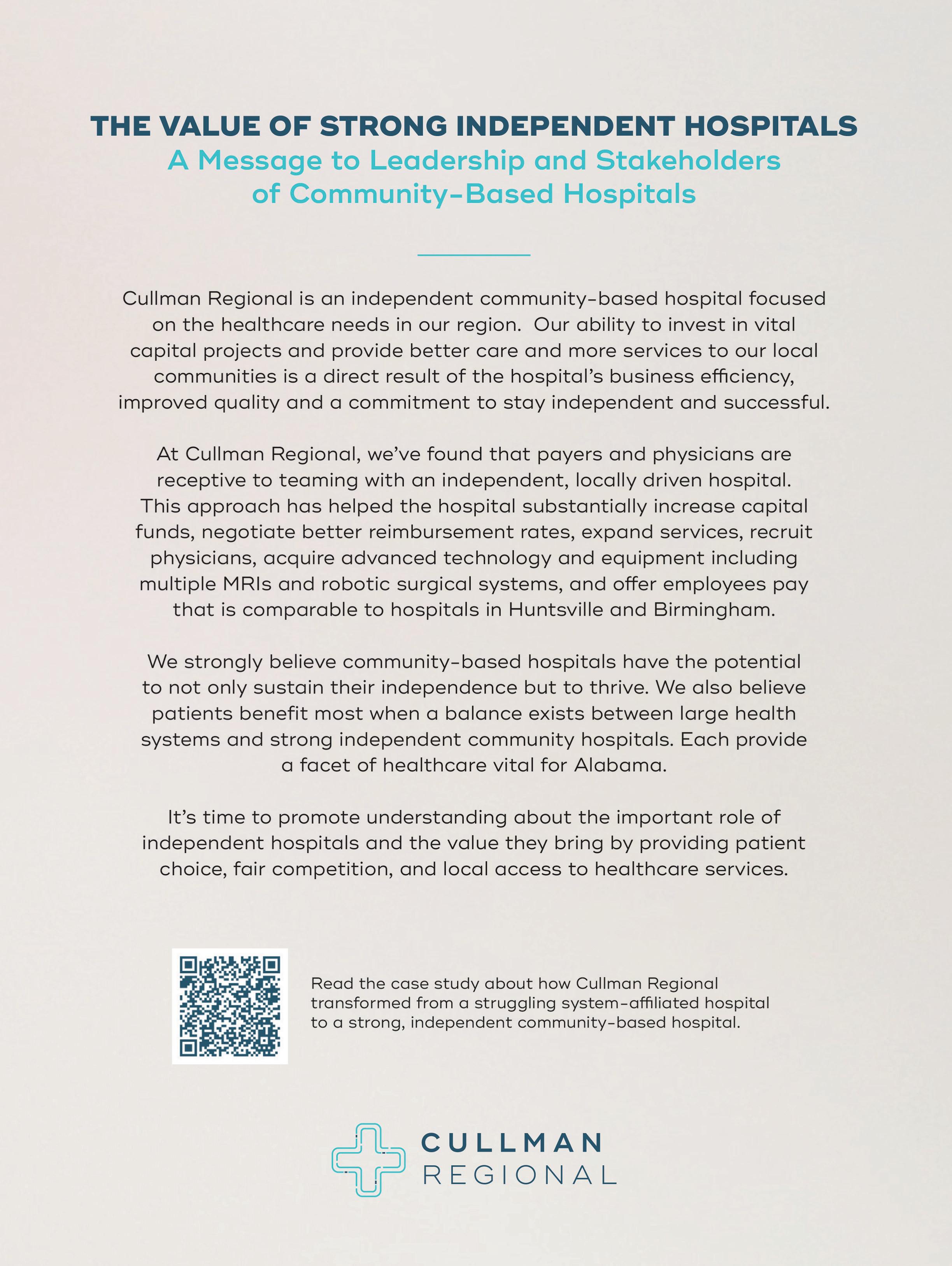

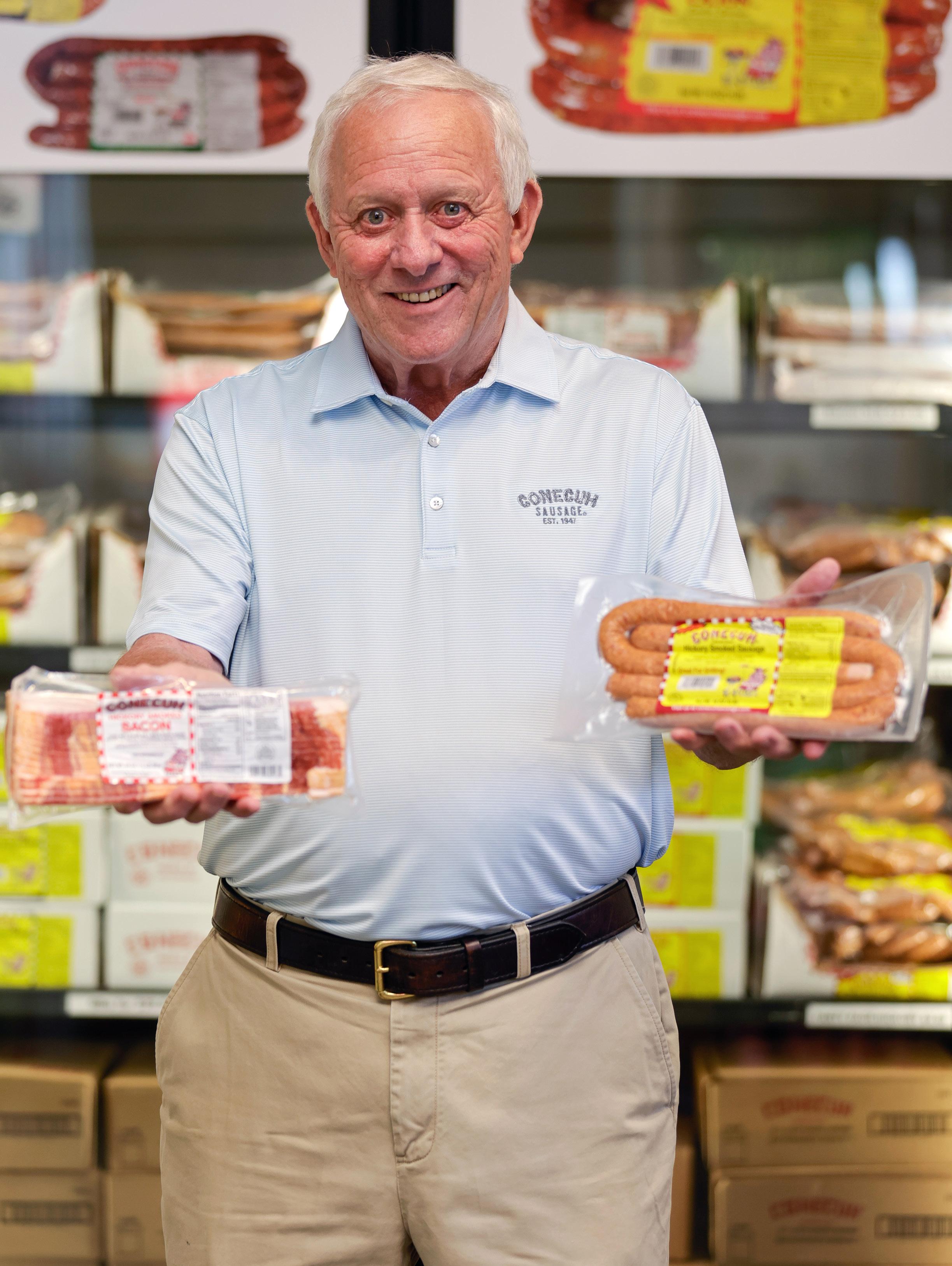
John Crum Sessions and his family have been making Conecuh Sausage in Evergreen for more than 75 years. The Alabama company with an international following is still going strong and moving to nearby Andalusia. Photo
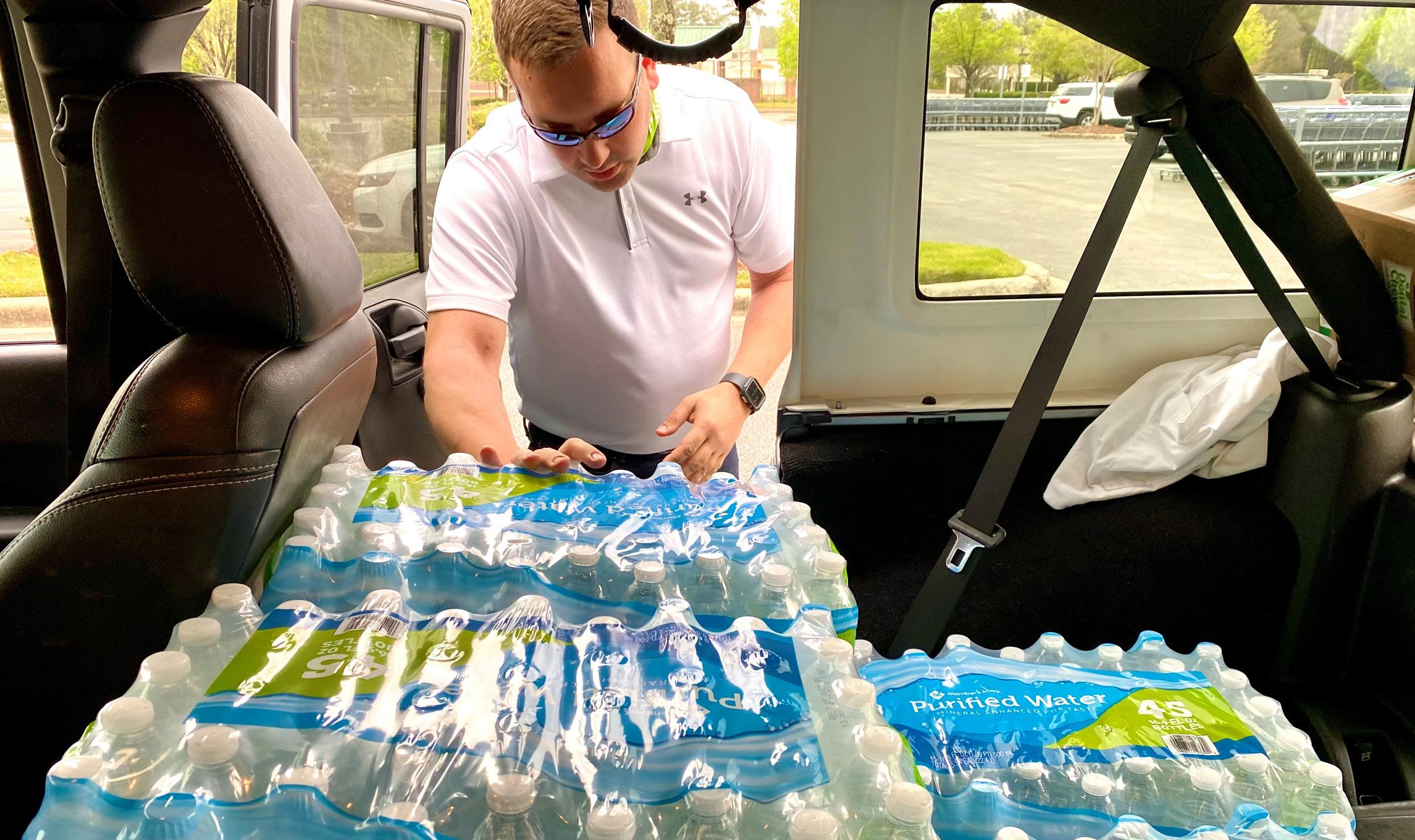

27: In the wake of disaster, Regions provides both banking support and a helping hand.
15: UAB’s acquisition of the St. Vincent’s hospitals is one of three recent ownership changes.
74: Radio Products Corp. perfected the art of fine tuning for radios.

On the Cover:
Scott Saunders, general manager at Troy-based KW Plastics, a plastic recycler that transforms trash into reusable resins. Photo by Stew
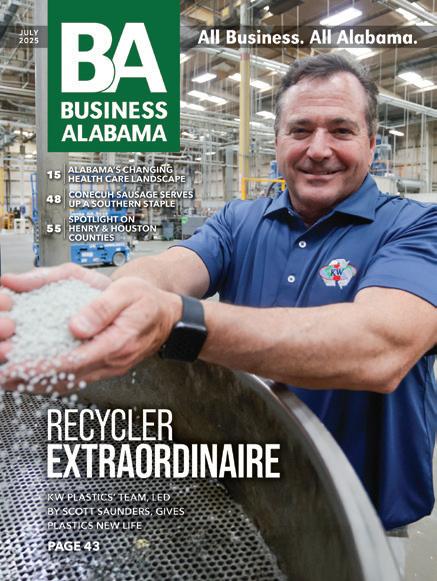


Volume 40 / Number 7
PUBLISHER
Walker Sorrell / wsorrell@pmtpublishing.com
ASSISTANT PUBLISHER
Stephen Potts / snpotts@pmtpublishing.com
EXECUTIVE EDITOR
Alec Harvey / alec@pmtpublishing.com
EDITOR
Erica Joiner West / ewest@pmtpublishing.com
COPY EDITOR
Nedra Bloom / nedra@pmtpublishing.com
ART DIRECTOR
Vic Wheeler / ads@pmtpublishing.com
DIGITAL EDITOR
Abby Parrott / abby@pmtpublishing.com
ACCOUNTING
Keith Crabtree / acct@pmtpublishing.com
ACCOUNT EXECUTIVES
Birmingham: 205-802-6363
Lee Mills / Ext. 102 / lmills@pmtpublishing.com
Carrie Hicks / Ext. 111 / carrie@pmtpublishing.com
DIRECTOR OF INTEGRATED MEDIA & EVENTS
Sheila Wardy / swardy@pmtpublishing.com
ADMINISTRATIVE
Rachel Mayhall / rmayhall@pmtpublishing.com
BIRMINGHAM OFFICE
3324 Independence Drive / Homewood, AL 35209 205-802-6363
MOBILE OFFICE
166 Government Street / Mobile, AL 36602 251-473-6269
CORPORATE
T.J. Potts, President & CEO
Thomas E. McMillan, Partner & Director
Business Alabama is published monthly by PMT Publishing Co., Inc. Copyright 2025 by PMT Publishing Co., Inc. All rights reserved. Reproduction in whole or in part without written permission prohibited.
Letters to the editor are welcome.
Moving? Please note US Postal Service will not forward magazines mailed through its Bulk Mail unit. Four to six weeks before moving, please send old mailing label and new address to Business Alabama, P.O. Box 43, Congers, NY 109209922 or call 1-833-454-5060.


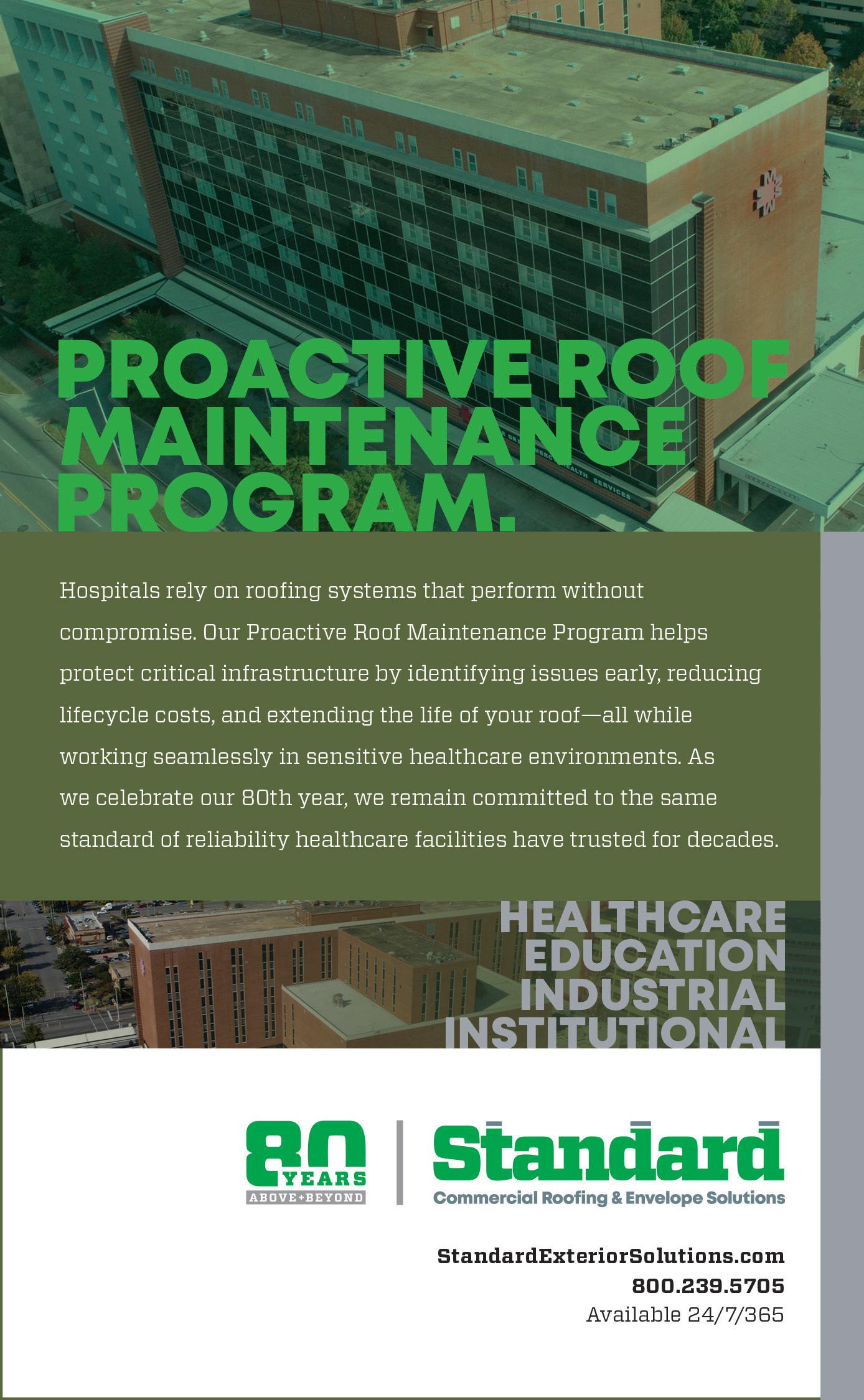

KIMBERLY-CLARK has announced plans for a $130 million expansion of its Mobile facilities, adding a new production line to make hygiene products.
The project is expected to add 29 jobs at the plant, which consistently ranks among Mobile’s largest industrial employers with more than 600 workers.
“This expansion represents a strategic investment in KimberlyClark’s future and underscores our commitment to solving unmet consumer needs through innovation,” said Tamera Fenske, chief supply chain officer at Kimberly-Clark. “Our Mobile facility exemplifies manufacturing excellence, powered by a team
Mercedes-Benz said in May that it’s adding the GLC SUV to the lineup it produces at MercedesBenz U.S. International in Tuscaloosa beginning in 2027. The GLC is also built at Mercedes’ plant in Bremen, Germany.
Hoover ranks fifth on U.S. News & World Report’s list of Best Places to Live, making it the top city on the list in Alabama. Huntsville, which ranked No. 1 last year, fell to No. 85.
UAB Medicine is the most trusted health system brand in the country, according to a new survey. Branding agency
Monigle surveyed household health care decision-makers. The University of Iowa Health Care system and Minnesota’s Mayo Clinic came in second and third.
Albertville has begun construction on Sand Mountain Marketplace, a nearly 250,000-square-foot retail complex designed for national chain stores and restaurants.
Birmingham will be the site of the 2027 Congressional Medal of Honor Society Convention. The week-long event brings together living Medal of Honor recipients and their families. The convention will be Sept. 12-19, 2027.
whose skill, dedication and passion deliver the essential products our consumers count on every day. This investment not only enhances our North American manufacturing capabilities but also deepens our longstanding partnership with the Mobile community. We’re proud to grow our presence here and create additional opportunities that will benefit both our business and the region for years to come.”
Calling Kimberly-Clark one of Mobile’s “cornerstone employers,” Mobile Chamber President and CEO Bradley Byrne said that the expansion “reflects the strength of our workforce and business climate,” and that “continued innovation and growth at the Mobile facility mean long-term stability for hundreds of families and a clear signal that Mobile is a smart place to do business.”
The new line is expected to open in 2027.
Kinberly-Clark, which recently transitioned from the New York Stock Exchange to Nasdaq, sells products in 175 countries, with brands including Huggies, Kleenex, Scott, Kotex, Cottonelle, Poise, Depend and others.
The company has been honored for sustainable, ethical and innovative business practices.
Alabama Commerce Secretary
Ellen McNair led a team in May to the SelectUSA Investment Summit in National Harbor, Maryland. The event is dedicated to promoting foreign direct investment in the U.S.
Evonik’s planned $177 million expansion in Theodore is still in progress, even as a notice says 143 workers were laid off at the site beginning in April. The layoff notice was filed by the project’s contractor Bilfinger with the Alabama Department of Commerce. Evonik confirmed it recently ended a contract at the site.
LAYOFF WOES
Oracle America Inc. has filed a notice with the Alabama Department of Commerce that it will lay off 65 employees in Montgomery beginning June 30.
An 83-acre Margaritaville resort broke ground in May next to the Wharf in Orange Beach. The complex will include retail, dining, condos and hotelstyle lodging. The first phase is scheduled to be operational in 2027.
Samford University announced in early June that it will withdraw rezoning applications and
TITOMIC LIMITED has opened its new U.S. facility in Huntsville to support advanced production capabilities and host live equipment demonstrations.
Titomic Limited is an Australian public company specializing in industrial-scale metal additive manufacturing, coating and repairs using its patented kinetic fusion cold spray technology, Titomic Kinetic Fusion (TKF).
The 59,000-square-foot facility will be the company’s only location manufacturing all of the TKF products. The facility also will have space for regional training and customer support.
Patti Dare, president of Titomic USA, said that the Huntsville facility will be able to meet a variety of requirements to support the company’s customers, which include the oil and gas, defense and aerospace industries.
Australia,
“This direct control of the production of machines and components provides us with the ability to meet our customer expectations,” Dare said.
Jim Simpson, CEO and managing director of Titomic, added, “This is more than just a facility opening. It’s a launchpad for the next generation of high-performance manufacturing technologies in the United States. Huntsville offers the perfect blend of industrial heritage and forward-thinking energy that aligns with Titomic’s mission to redefine what’s possible in materials science and manufacturing.”
Innovate Alabama gave Titomic more than $12 million in loan guarantees and collateral support through the U.S. Department of the Treasury’s SSBCI program. Titomic is a recipient of Innovate Alabama’s LendAL initiative, which helps businesses obtain capital through partnerships with private lenders.
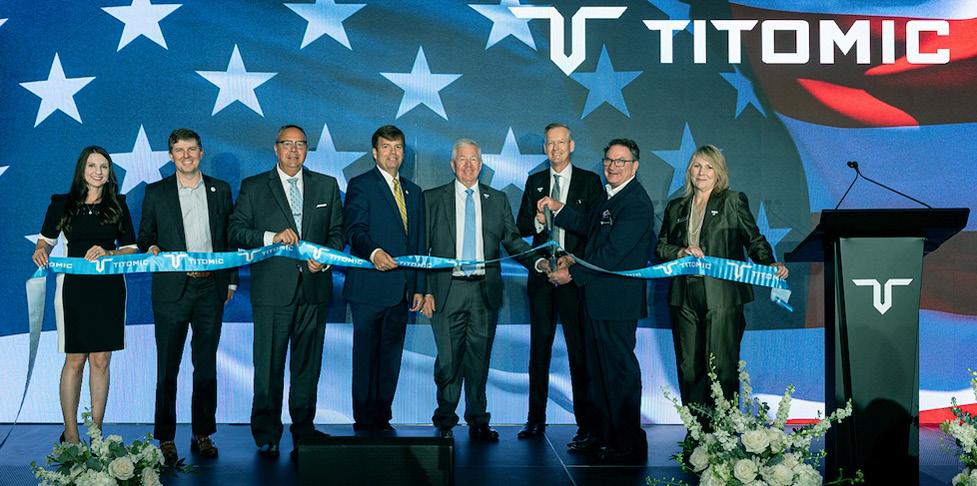
development plans for its proposed Creekside project, deciding to focus instead on oncampus construction projects. The Creekside development proposed shopping, dining, housing and a hotel near Samford’s campus, and some residents opposed the plan.
Building permits have been issued for the $13.2 million Ditto Landing event center along the Tennessee River in Huntsville. Lee Builders, the firm behind the renovation of Joe Davis Stadium, is building the new center on a 2.5-acre site.
ALBERTVILLE ALLEYWAY
The city of Albertville has broken ground on the new
Alleyway Entertainment
Venue. The 30,000-square-foot center will include bowling, axe throwing, bumper cars, laser tag and more.
Cognera Health, a mental health company based in Newton in Dale County, has been named winner of the $100,000 prize in the Alabama Launchpad life sciences track.
The Moody City Council has approved an agreement with Tuscaloosa developer Stan Pate to build a $100 million retail development on Moody Parkway. The city is providing about $65 million in incentives for the project.
Courtney Pittman has been named president of Birmingham-based Davis Architects. Outgoing president Neil Davis will be board chairman. Andy Rush will become president and CEO of Southern Energy Credit Union when Derrick E. Ragland Jr. retires on Sept. 30. Rush is currently vice president and chief operating officer of the credit union, which was formerly APCO Employees Credit Union Kimberly L. Jackson has been named president and CEO of the Women’s Foundation of Alabama. She most recently served as government and community relations manager for the Birmingham division
of Alabama Power Chad Zaucha has been named the new president and CEO of the YMCA of Greater Birmingham. He’s currently serving in those positions for the YMCA of Muncie in Indiana.
SABAN CENTER BUILDER CHOSEN
The city of Tuscaloosa will award Birmingham-based Stone Building Co. a contract to build the $74 million Saban Center Stone is the firm behind the new Coca-Cola Amphitheater in Birmingham.
BUSINESS EXPANSION
Stone Martin Builders, an Auburn-based single-family home builder, has launched Stone Martin Commercial,
AIRPORT was already the second busiest in Alabama, measured by the number of takeoffs and landings. All it lacked was commercial flights.
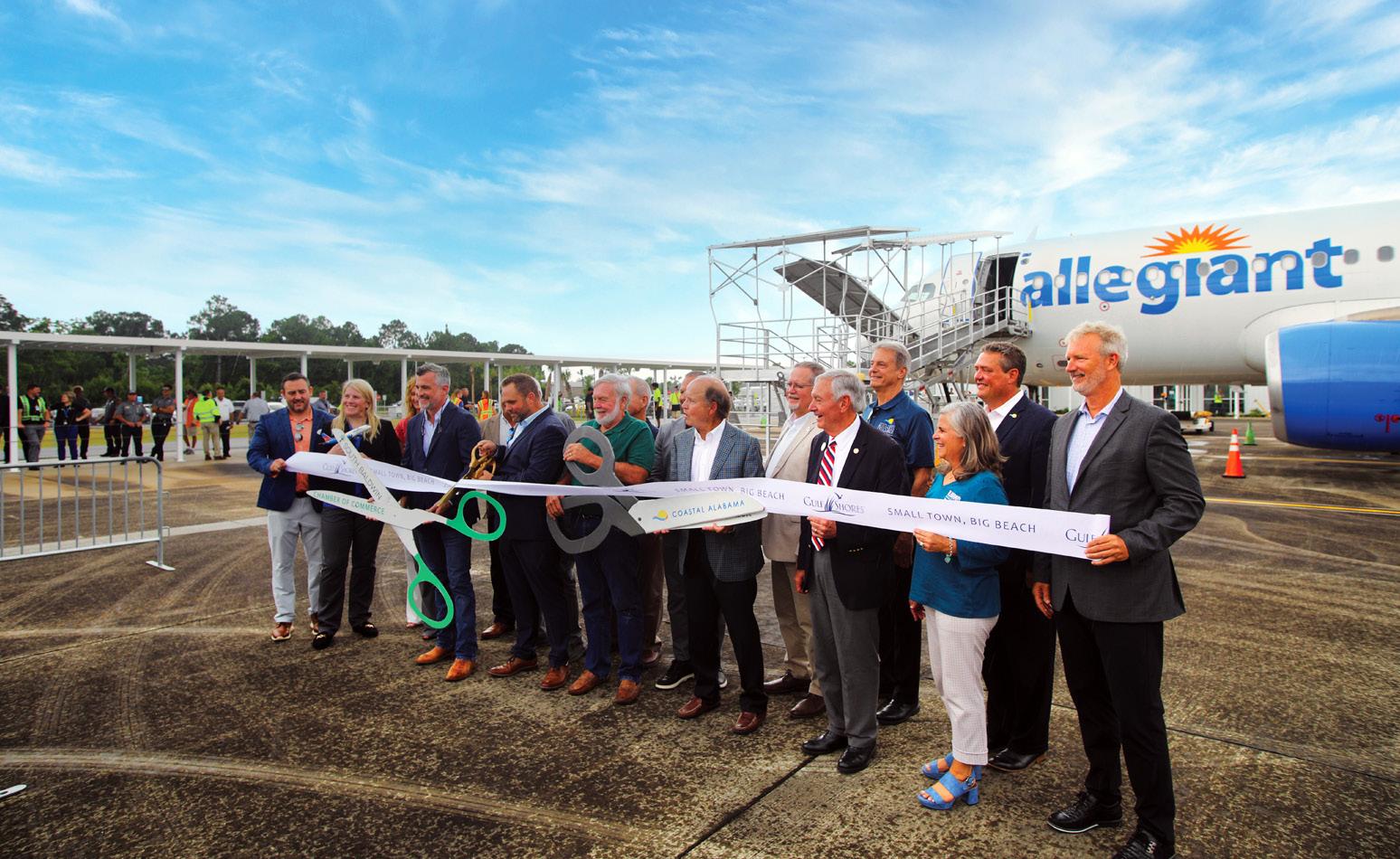
Gulf Shores International Airport welcomes Allegiant Air, which is providing commercial flights to eight destinations.
With the addition of a terminal — and a fair amount of other prep work — some strategic marketing and a “Field of Dreams” kind of enthusiasm, Alabama’s coastal airport now has commercial flights to eight different destinations, third behind just Birmingham and Montgomery.
The new flights began in May, but the groundwork began long before the first commercial jet landed.
Even without commercial flights, “a lot of people used this airport,” said airport Director Jesse Fosnaugh. “Decades ago, local leaders said, ‘All these people want to come here; how cool would it be to have airline service.’”
“It’s easy to say that,” Fosnaugh says. But unlike many cities, the Gulf Shores folks, in partnership with those in Orange Beach and Foley, “did the right things” to make it happen.
In 2015, they added the heavy-duty ramp needed for airline traffic. In 2021, they built a new air traffic control tower. In 2022 they got the airport operating certificate, which indicates that safety inspections, firefighting equipment and other basics are in place. “That puts you on the radar for airlines to look at,” he said.
a new division focused on commercial construction projects. Drew Brown will lead the division as vice president of commercial construction.
Montgomery TechLab has named five companies to its first group at the MTL Defense Accelerator. The companies are Analytical AI, Lineaj, XO Armor, Generational Systems and GuidePad.
Qatar Airways’ agreement with GE Aerospace for more than 400 aircraft engines will benefit GE’s workers in Huntsville and Auburn. GE Aerospace calls it the largest widebody engine purchase in its history.
Actress S. Epatha Merkerson, during a speech at Talladega College’s 150th commencement, said she is donating $1 million to Alabama’s oldest private HBCU. The “Law & Order” and “Chicago Med” star also received an honorary doctorate from the college.
Fisher Phillips has opened a new Birmingham office with six Birmingham-based attorneys. The firm is an international labor and employment firm representing employers.
Huntsville’s Integration Innovation has been awarded a Missile Defense Agency contract
“But we still didn’t have a terminal — and that was the big piece.”
“It was the ultimate chicken and egg dilemma,” Fosnaugh says. “Airlines would say they would come if there were a terminal. The airport was saying we’d build a terminal if we knew you were coming.”
The airport decided to make the first move.
After winning a grant for a terminal in 2023, they hired Persons Services Corp. and construction on the $8 million terminal began in 2024.
The new terminal made Gulf Shores a household word among airport operators and airline companies, Fosnaugh says.
And the first to take the bait was Allegiant Air, a low-cost carrier that specializes in leisure travel.
“Allegiant is perfect for us,” Fosnaugh says. “They are experts at taking people on vacation.”
“I feel they’re a partner for the long haul,” he said, offering flights to and from the very places that are home to Alabama’s Gulf Coast snowbirds — a total of eight destinations.
worth up to $429 million for work with Missile Defense System capabilities. The Alabama Institute for Deaf and Blind’s Alabama Industries for the Blind has landed a five-year, $29.4 million Department of Defense contract to make men’s neckties. Iron Mountain Solutions Inc., in Huntsville, has been awarded a $22.6 million modification to a contract for technical support for the Utility Helicopters Project. Army Contracting Command at Redstone Arsenal contracted the work. Birmingham’s BL Harbert is one of seven companies chosen for a combined Naval Facilities contract valued at nearly $2 billion.
The Sanders Trust, a health care real estate investment and development company based in Birmingham, has broken ground on a 40-bed Lifepoint Health rehabilitation hospital in Milwaukee, Wisconsin.
A $44 million federal grant for the Birmingham Biotechnology Hub has been canceled by the Trump administration. The grant was designed to further biotech programs at Southern Research, UAB and Lawson State.
Birmingham-based Motion Industries Inc. has opened a conveyance shop in Calgary,
Construction has begun on the MOBILE ARENA on the site of the former Mobile Civic Center. The arena, part of a planned $300 million downtown entertainment district, will be managed by Oak View Group with concert promoter Live Nation.

“After years of discussion and months of planning, we are beyond excited to see construction officially begin at Mobile Arena,” said Mobile Mayor Sandy Stimpson. “This will be a gamechanger for Mobilians and visitors in our city. It will make Mobile a true event destination — driving tourism and providing residents with quality events to enjoy with their friends, families and neighbors.”
Construction of the facility is being handled by BL Harbert International. The design of the facility was developed by Goodwyn Mills Cawood and Populous Architects. The venue is expected to open in 2027.
“Goodwyn Mills Cawood is thrilled and honored to play a role in such a transformative project happening right here in our own backyard,” said Keith Parker, senior architect at GMC. “This cutting-edge venue will bring live entertainment, concerts and — of course — our beloved Mardi Gras celebrations to new heights.”
Sitting on 22 acres, the Mobile Arena will have flexible seating and layout options, allowing it to adapt to the activities, from smaller shows to larger events with more than 10,000 spectators. The design also incorporates multiple ballrooms capable of hosting events of all sizes.
Canada. The new location will serve customers across western Canada. Motion distributes maintenance, repair and operation replacement parts.
DOWNTOWN BOOST
Birmingham’s Battery II development, a downtown area anchored by The Painted Lady boutique hotel and Bygones Bar, has opened. The more than 18,000 square feet of retail and restaurant space also will include the office for Addicus, a financial management firm that helped complete the development.
Birmingham-based contractor
Brasfield & Gorrie has opened a 28,500-square-foot
building adjacent to its current headquarters, allowing space for expansion.
Birmingham-based Landing, which has a flexible-lease apartment network, has secured $180 million in debt financing to scale its multifamily platform. That platform launched in 2023.
The Madison City Council has approved plans for an $8 million renovation of Toyota Field that will add a one-story addition to left field. Construction is expected to begin in October with completion by April 2026.
During the ceremony, Oak View Group announced that Mobile Coca-Cola Bottling Co. would serve as the official beverage partner and the first founding partner of Mobile Arena.
Ground was broken in May for the HEMAN DRUMMOND CENTER FOR INNOVATION in Walker County’s Jasper Industrial Park. The $80 million facility, slated to open in 2026, will offer training in cyber IT, robotics, health care, automotive and construction fields in programs presented by the Walker County School System.
Students will be able to earn industry certifications, take college-level technical courses and gain experience through mentorship, apprenticeships and internships.
For aspiring entrepreneurs, the center will offer an incubator that will provide resources, including workshops on business planning, marketing and finance.
“The new Heman Drummond Center of Innovation will become the best example of career tech in Alabama,” said Gov. Kay Ivey. “Not only is it going to change thousands of lives, but it will also open its doors at exactly the right time. Alabama is seeing tremendous growth in good jobs, but we need more highly trained workers.”
Birmingham’s FiveStone Group is planning a development in Montgomery’s Cloverdale neighborhood. The first tenant will be Big Bad Breakfast, with three others to follow.
Birmingham-based Brasfield & Gorrie has been chosen as general contractor and construction manager for the Alabama School of Healthcare Sciences Foundation in Demopolis. The 10-acre highschool campus is scheduled to open in the fall of 2027. The $62 million first phase of the campus will include an academic building, residence hall, dining facilities, rec building and 400-seat auditorium.
Westwater Resources has received a patent for its graphite purifying methods at its graphite plant under construction in Kellyton. The company’s graphite deposit is located across nearly 42,000 acres in Coosa County.
Owen Bailey, who has led USA Health since 2016 — including major growth and the acquisition of Ascension Providence Hospital — has announced his retirement as of Aug. 1. Bailey worked earlier at Thomas Hospital and with Infirmary Health. Natalie Fox will be interim CEO.

UNITED INC. opened its new $18 million sales center and warehouse in Auburn in June. The facility also has some office space.

“I’m proud to officially welcome Coca-Cola United and its employees to the Auburn family,” said Auburn Mayor Ron Anders. “We are grateful for CocaCola’s investment in our community and are excited to see this new facility come to life. We look forward to a lasting and strong partnership moving forward.”
The 24,000-square-foot facility sits on approximately 15 acres off West Veterans Boulevard. It will serve as a distribution hub for products going to customers and communities in Chambers, Coosa, Lee, Macon, Randolph and Tallapoosa counties.
“This facility reflects our longstanding commitment to refresh and serve the communities and consumers of East Alabama with excellence and hometown pride,” said Allen Buffington, Auburn Coca-Cola Sales Center manager.
Auburn Coca-Cola joined Coca-Cola United in 2023. It employs approximately 75 associates. Auburn Coca-Cola serves more than 1,000 customers and distributes nearly 3 million cases of Coke products annually.
Coca-Cola has had a presence in East Alabama since 1902, with previous bottling operations in Alexander City, Opelika and Tuskegee.
Calhoun Community College has opened its STEAM Imagination Center. It’s a training center for science, technology, engineering, arts and mathematics. In early June, the University of Alabama at Birmingham celebrated the opening of Gorrie Hall, which will house the School of Engineering. UAB also announced plans for a $14.6 million renovation of its 37-year-old Bartow Arena, the venue for basketball and volleyball.
The Tuscaloosa City Council has voted to direct the city
attorney to draft an ordinance clearing the way for a proposed Sports Illustratedthemed riverfront resort Some residents have voiced opposition to the project, and a new design has been scaled back from the original.
The USS Enterprise, the world’s first nuclearpowered aircraft carrier, will be dismantled in Mobile — a $537 million project to be completed by NorthStar Maritime Dismantlement Services in partnership with Modern American Recycling and Radiological Services.
Atlantic Aviation has begun work on a $40 million expansion at BirminghamShuttlesworth International Airport. The company will expand its facility at the airport and renovate hangars and a ramp.
Pete Hanna, who played football for Samford University before buying Hanna Steel from his father, died this week at age 88. Hanna also served on Samford’s board of trustees for many years.


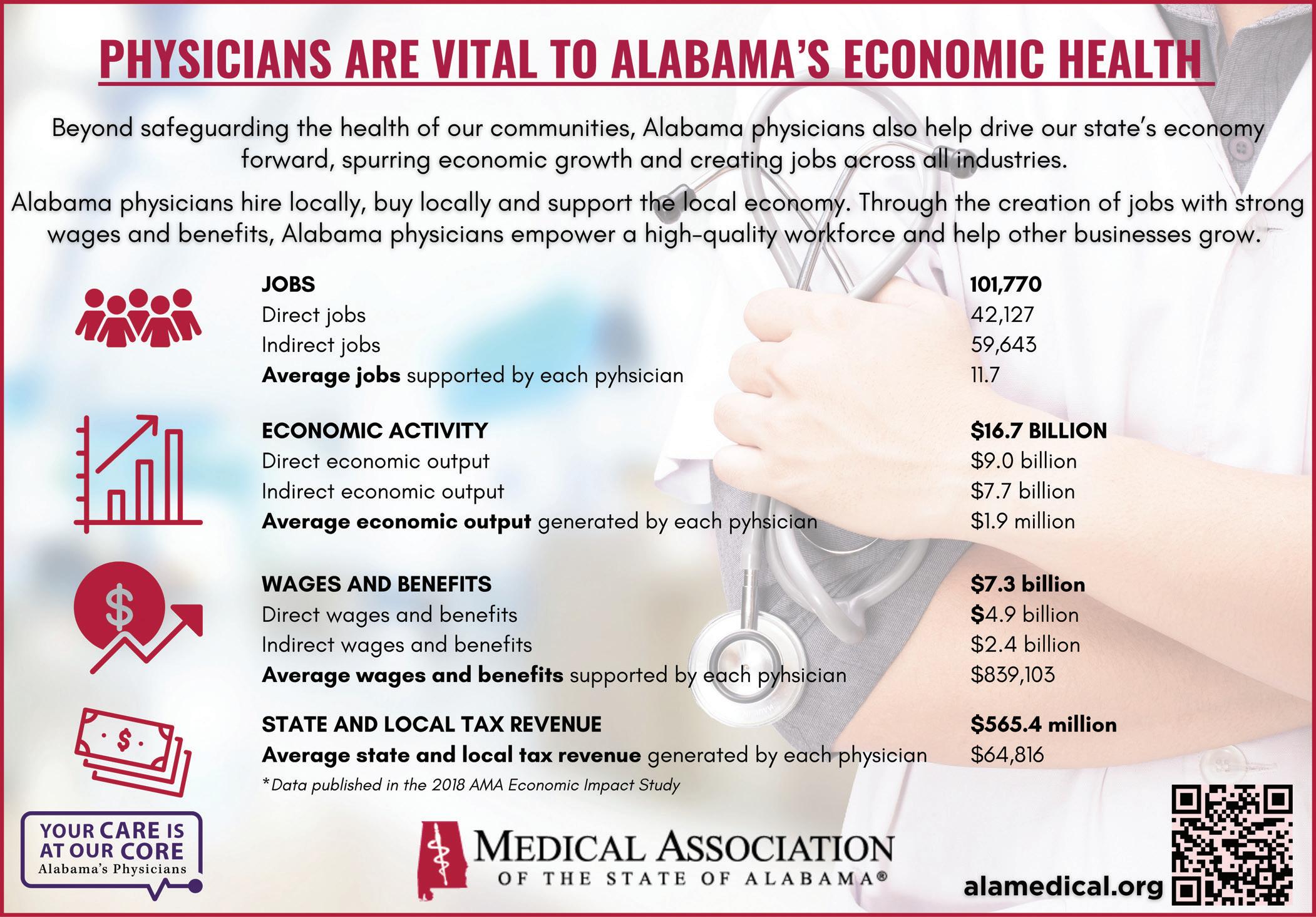


By GAIL ALLYN SHORT
On Nov. 1, 2024, the University of Alabama at Birmingham Health System acquired the Ascension St. Vincent’s Health System in a $450 million deal.
Today, all the old St. Vincent’s sites of care and operations have a new name, UAB St. Vincent’s.
UAB Health System, an entity with nearly $8 billion in annual revenues, purchased Ascension St. Vincent’s, including two hospitals in Birmingham (both the main and East campuses), hospitals in Blount, Chilton and St. Clair counties, a freestanding emergency department in Trussville and the One Nineteen Campus that offers specialty care and rehab therapy.
“St. Vincent’s had only recently opened up the free-standing emergency department in Trussville just prior to our acquisition. So, we’ve added emergency room capabilities,” UAB Health System CEO Dawn Bulgarella says.
The deal also includes all of Ascension St. Vincent’s imaging
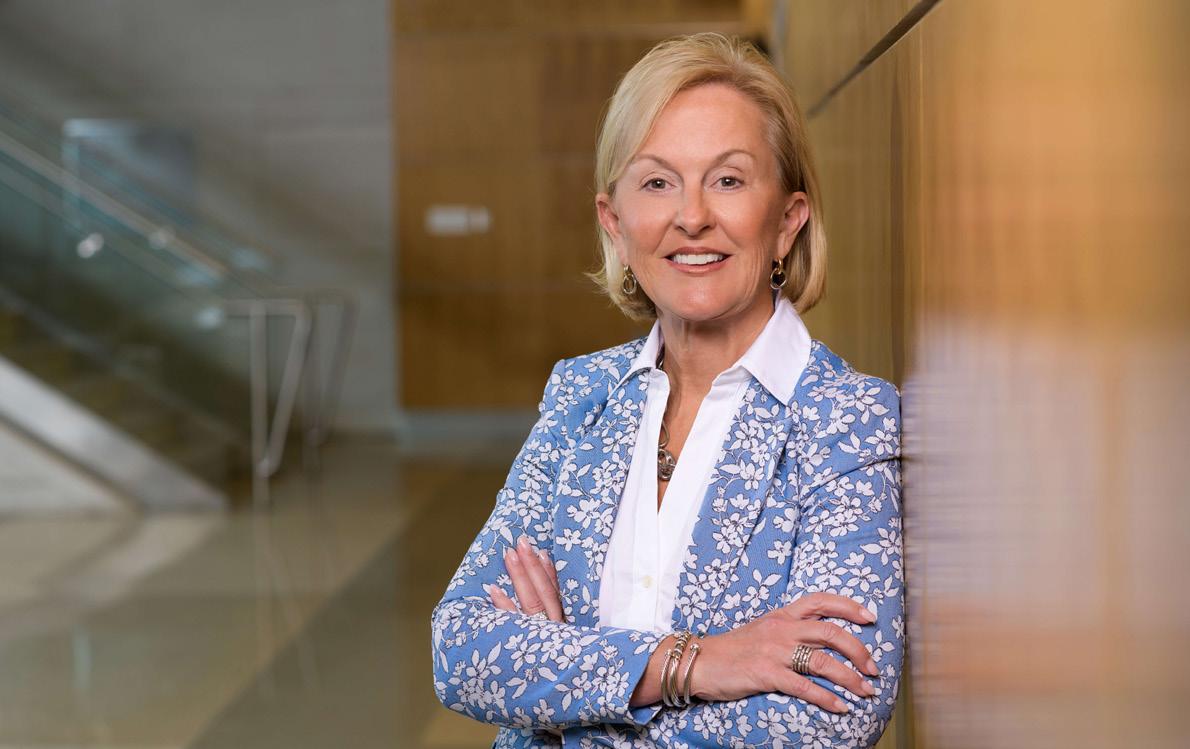
“We worked closely with the Catholic Diocese of Birmingham on the transition, and while UAB Health System operations remain unaffiliated with the church, all of our associates and caregivers are continuing the great tradition of serving all persons with special attention to the poor and vulnerable.”
— Dawn Bulgarella, UAB Health System


centers and other clinics that were part of the Ascension Medical Group, and all Ascension St. Vincent’s services, facilities, personnel and provider networks in the region.
“It’s been a fantastic opportunity that we’ve had to access physicians, emergency rooms, hospital beds and surgical ORs within the five St. Vincent’s facilities,” Bulgarella says.
Access to additional patient beds is a particularly critical benefit of UAB’s acquisition. For example, Bulgarella says the acquisition has resulted in opening private hospital rooms at Ascension St. Vincent’s that had been previously unoccupied, and, at St. Vincent’s East, two floors that were previously closed due to a lack of staffing.
“We’ve now been together seven months, and we’ve been able to open up additional beds at UAB St Vincent’s Birmingham and at East, and we’ve been able to open up access to additional primary care and some specialty care,” she says.
Bulgarella says that early on, several teams ranging from IT and HR to quality, set out to manage the transition to UAB by focusing on what could be done on day one and making sure that missions were aligned.
“We wanted to ensure that we could bring over most, if not all, of the employees. There were 5,200 employees that we were able to transition over. For them, that meant new payroll, a new benefit structure and new emails,” she says.
“We also wanted to communicate with the patients that their care would continue, that we would have no loss of access and, in fact, as I represented, increased access,” she says.
UAB worked with Ascension to develop one- and two-year transitional agreements, she says — “probably the most significant being the electronic medical records. We’ve been able to maintain some of the Ascension systems while we’re working on
Obviously, Providence has a history well beyond that building and being in this community and providing care. That was really important to us, being able to maintain that history and that legacy, but also coming together with us as the region’s leading academic health system.”
transitioning those off to our own systems,” Bulgarella says.
Another point of focus is communicating with providers, she says. For example, most UAB physicians are employed at UAB, but within UAB St. Vincent’s, that’s not the case.
“Most of the physicians there are community providers. So, our communications team has been critical to this process, making sure that we’re communicating with all the employees on a regular and routine basis,” she says.
And while St. Vincent’s was a Catholic hospital, Bulgarella says the shared missions of UAB and St. Vincent’s will continue.
“We worked closely with the Catholic Diocese of Birmingham on the transition,” says Bulgarella, “and while UAB Health System operations remain unaffiliated with the church, all of our associates and caregivers are continuing the great tradition of serving all persons with special attention to the poor and vulnerable.”
“We’re a true statewide network. We’re 15 hospitals and in excess of 200 outpatient locations. We’re the largest employer in the state of Alabama with now 35,000 employees. So, just proud to be a part of it,” Bulgarella says.
Providence Hospital in Mobile first opened its doors in 1854.
Today, it is a part of the University of South Alabama, and USA Health Providence Hospital is the 15th largest hospital in the state.
Providence officially joined USA Health in October 2023, when the University of South Alabama Health Care Authority in Mobile finalized an $85 million deal to acquire it from Ascension, a private Catholic health care system based in St. Louis.
Alabama’s community colleges consistently work to fulfill the needs of their local communities for a variety of career pathways.
At Jefferson State Community College in Birmingham, the Surgical Technology program was launched a couple of years ago to help satisfy the growing need for a nearby healthcare system.
“Surgical technicians are essential and depended upon heavily.”
- Donna Richardson
“This is one more opportunity where Jefferson State is meeting the needs of the local community,” said Jefferson State President Keith Brown after the program’s launch. “These are good-paying jobs, and it’s a career ladder for participants who will come through the program.”
Jefferson State’s Surgical Technology is a two-semester program, featuring classroom and lab work, that offers a short-term certificate.

“We test strenuously during the first portion of the class and then we hit the ground running in the lab,” said Donna Richardson, Jefferson State’s Surgical Technology Program Director
Students prepare, maintain, monitor and enforce the sterile field and adherence to aseptic technique by preoperative, surgical team and postoperative personnel. It includes instruction in instrument and equipment sterilization and handling, surgical supplies management, wound exposure and closure, surgical computer and robot operation and monitoring, maintenance of hemostasis, surgically cleaning a patient and team scrubbing.
“Surgical technicians are essential and depended upon heavily. We’re the ones who help get patients ready for surgery and make sure the surgeon has all that’s needed. We pass instruments and supplies to the surgeon during operations,” Richardson said.
Alabama’s community colleges produce highly trained and employable graduates. Many students, like those enrolled in Jefferson State’s Surgical
Technology, have job opportunities secured before they finish their respective programs.
“Employers are consistently checking in to learn about our upcoming graduates. Our graduates are ready to work upon completion,” Richardson said. “It’s rewarding to be a patient advocate and to enter this exciting career. The pay rate is competitive because of the need.”
Richardson added some graduates begin work at $21 an hour with ample opportunities to advance upon earning additional certifications.
Surgical technology programs are also offered across the ACCS at Bevill State Community College, Calhoun Community College, Coastal Alabama Community College, Gadsden State, Southern Union and Wallace Community College in Dothan.
www.alabama.edu
Historically, these facilities have been run like five independent hospitals versus a cohesive system. And so, we want to be able to give patients the confidence that you can have access to care in your local hospital. But if you need a higher level of care, we can fill that gap too.”
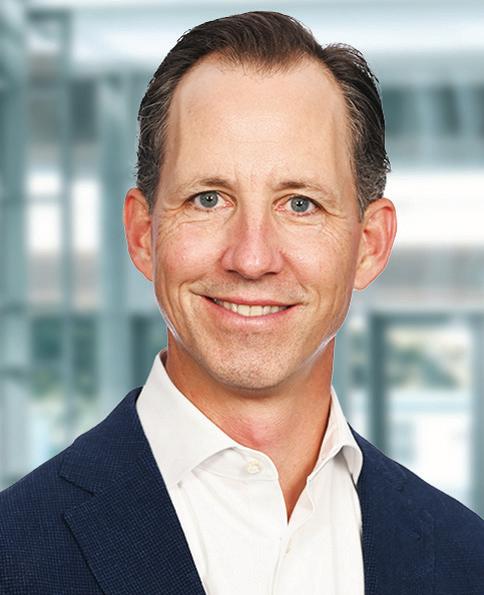
Besides the hospital, the deal included all Providence clinics.
USA Health also gained Providence’s 349 hospital beds, eight clinics on the campus and six family practice sites in west and north Mobile and in Moss Point, Mississippi.
Moreover, USA also inherited an estimated 1,800 Providence physicians, associates and other health care providers.
“For us, both of our hospital facilities, our Children’s & Women’s Hospital and our University Hospital, are fairly landlocked, so we didn’t have a whole lot of room to expand,” says Natalie Fox, USA Health’s interim CEO and chief physician enterprise officer.
“Providence has a larger geographic footprint and has attached physician office buildings to the hospital for us to expand our clinical enterprise,” she says.
Fox says USA Health has already expanded some of its existing services to the Providence campus, including a sports medicine practice and an academic neurosurgery practice.
But one major endeavor has involved transitioning all of the electronic records to USA Health, which took place in January, she says.
“Whenever these acquisitions occur, you have transition services agreement, because it’s a big lift to change all of the software and technologies and things we think about that make a hospital system run every day,” Fox says.
“Obviously, Providence has a history well beyond that building and being in this community and providing care. That was really important to us, being able to maintain that history and that legacy, but also coming together with us as the region’s leading academic health system.”
Last fall, Orlando Health, a private, not-for-profit health care organization, purchased a 70% interest in five Brookwood Baptist Health hospitals in the Birmingham metro area from for-profit Tenet Healthcare.
The hospitals acquired in the $910 million deal were Brookwood Baptist Medical Center, Citizens Baptist Medical Center, Princeton Baptist Medical Center, Shelby Baptist Medical Center and Walker Baptist Medical Center.
Orlando Health inherited Baptist Health’s more than 1,700 beds, 70 primary and specialty care clinics, an estimated 1,500 affiliated physicians and more than 7,300 employees.
Orlando Health has a 3,487-bed system that includes 17 hospitals, 10 freestanding emergency rooms and nine Hospital Care at Home programs along with seven partner hospitals and emergency departments in Puerto Rico and 10 specialty institutes fields including aesthetic reconstructive surgery and cancer care.
In an interview on the health care and life sciences podcast “Taking the Pulse,” Amy Allen, president and CEO of Baptist Health, and Thibaut van Marcke, senior vice president of Orlando Health, talked about the acquisition and subsequent transition.
“I think you will pretty quickly see changes to our facilities, improvements to our facilities,” Allen said in the podcast interview.
The Baptist brand has undergone a name change to Baptist Health, Allen said.
“We changed our name to Baptist Health and did a lot of marketing around that recently,” she said.
Van Marcke said one goal has been to create a greater coordination of care among the five Baptist Health hospitals in Birmingham.
“Historically, these facilities have been run like five independent hospitals versus a cohesive system. And so, we want to be able to give patients the confidence that you can have access to care in your local hospital. But if you need a higher level of care, we can fill that gap too,” van Marcke said during the podcast interview.
Besides greater cohesion, van Marcke said the team has begun strategic planning to define not just the type of care they will provide, but how they provide it, and what that continuum of care looks like across the five hospitals and outpatient environments.
And while Orlando Health is a secular organization, Allen said Orlando Health has committed to maintaining Baptist’s faithbased culture.
Gail Allyn Short is a Birmingham-based freelance contributor to Business Alabama.


are underway to tackle health care disparities in Alabama
By GAIL ALLYN SHORT
Retired physician Jimmy Adkisson, D.O., of Brewton, knows firsthand how hard it is to keep physicians in rural communities.
Adkisson worked as a family physician and practiced emergency medicine in Brewton for 40 years and says he
Dr. Jimmy Adkisson
Brewton retired physician

saw the number of physicians in the area dwindle over the years as they have moved to larger, more lucrative cities or retired with no younger physicians to take their place.
“We’ve had a loss of two physicians over the last year-and-a-half,” Adkisson
says. “Primary care is the thing that we need more than anything else.”
“People coming out of medical school are wanting to go to the big cities. But there’s got to be some folks training for rural medicine. What we’re really interested in is getting them to come into a town
“People coming out of medical school are wanting to go to the big cities. But there’s got to be some folks training for rural medicine. What we’re really interested in is getting them to come into a town like Brewton or Escambia County where the quality of life is great, the practice of medicine is wonderful, the standard of living is good, and it’s just a great life to be in medicine.”
like Brewton or Escambia County where the quality of life is great, the practice of medicine is wonderful, the standard of living is good, and it’s just a great life to be in medicine,” he says.
Health care providers, academics and lawmakers across Alabama are developing innovative initiatives to improve access to health care in rural and underserved communities.
The truth is, in rural towns across Alabama, health care can be hard to get.
The population-to-primary care physician ratios are often smaller in rural Alabama counties than in metropolitan counties like Jefferson County, where the ratio is 900-to-1, and Madison County, where it’s 1,120-to-1, according to the University of Wisconsin Population Health Institute Program’s County Health Rankings & Roadmaps report.
But in rural Wilcox County, there is just one doctor for every 10,450 people, and in Washington County, it is one for every 15,150 residents.
Moreover, statistics show that people in farm towns are more likely to die prematurely from heart disease, stroke, cancer, accidental injuries and chronic lower respiratory disease than people living in urban communities.
Patients in rural areas also often must travel longer distances than urbanites to reach a hospital, specialist and other health care services, says a 2023 U.S. Government Accountability Office study titled, “Health Care Capsule: Accessing Health Care in Rural America.”
And the University of Southern Maine, Muskie School, Maine Rural Health Research Center finds that more than 95% — 64 out of 67 Alabama counties — are listed as “ambulance deserts,” where it can take up to 30 minutes or longer for help to arrive, compared to about five minutes in urban areas.
Proposed cuts to Medicaid in a reconciliation bill, under consideration in Congress at press time, could also leave many Alabamians without health insurance.
The Alabama Hospital Association reports that many rural Alabama hospitals, which provide care to some 2 million Alabamians annually, are struggling financially due to lower reimbursements from
Danne Howard Alabama Hospital
Association
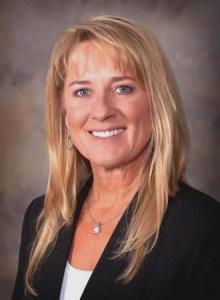
“Labor and delivery services are very expensive to maintain. Then, add on top of that the difficulty of recruiting and retaining medical staff in OB-GYN to rural areas where it’s difficult to make a living when a great percentage of the patients in that area are uninsured or on Medicaid and there aren’t a lot of private-pay patients.”
Medicare and private insurance companies and the high volume of uninsured and underinsured patients.
Danne Howard, the AHA’s incoming president and CEO, says that as many as 22 rural hospitals in Alabama are at imminent risk of closure or under unsustainable financial strain.
And, since 2005, eight rural hospitals in Alabama have closed their doors, a report by the Center for Health Care Quality & Payment Reform says.
“Seventy-one percent of all hospitals in Alabama have a negative operating margin, and for 83% of the rural hospitals,
the median operating margin is negative 19.5%,” Howard says.
“A lot of hospitals never had robust reserves to begin with,” says Howard, “but that pretty much dried up and was used during the pandemic.”
Some rural hospitals in Alabama have discontinued services like OB-GYN due to depleted reserves and high costs, Howard says.
The Lawrence Medical Center in Moulton, for example, closed its emergency room on May 23 to become an outpatient-only facility offering imaging, EKG, lab, respiratory and physical therapy services. It also kept its primary care clinics and urgent care center open.
And another facility, Grove Hill Memorial Hospital in rural Clarke County, recently ended labor and delivery services.
As a matter of fact, 28% of women in rural Alabama have no birthing center within 30 minutes of their homes, the state public health office says.
“Labor and delivery services are very expensive to maintain,” says Howard. “Then, add on top of that the difficulty of recruiting and retaining medical staff in OB-GYN to rural areas where it’s difficult to make a living when a great percentage of the patients in that area are uninsured or on Medicaid and there aren’t a lot of private-pay patients.”
The American Medical Association says burdensome administrative tasks such as prior authorization requirements, along with cuts to Medicaid and low reimbursements from Medicare and commercial insurers, make it harder for small-town primary care physicians to maintain private practices and pay for office overhead costs, equipment and medical devices and staff salaries.
To address the shortage of primary care physicians in rural communities, the Alabama College of Osteopathic Medicine in Dothan offers clinical rotation for third-year students at rural clinics to help encourage them to consider careers practicing in rural and underserved communities, says Dr. Justin Hovey, who is associate professor of internal medicine and pediatrics at ACOM.
ACOM students can fulfill their rotations in rural towns across Alabama,
Dr. Justin Hovey
Alabama College of Osteopathic Medicine

Mississippi, the Florida Panhandle and Georgia.
In addition, ACOM, in partnership with Southeast Health, operates the Southeast Health ACOM Ashford Clinic in Ashford and a second clinic in Taylor. ACOM students and faculty staff the academic clinics and offer internal med-
“We also give students the advantage of spending time with the nursing staff and with the front office so they can see the business side of medicine and the way the clinic flows.”
icine, family care, pediatrics, osteopathic manipulative medicine, nutrition and other services, says Hovey, who is also medical director at Southeast Health ACOM Ashford Clinic.
“We also give students the advantage of spending time with the nursing staff and with the front office so they can see
the business side of medicine and the way the clinic flows,” Hovey says.
Hovey says that through the experiences in rural clinics, ACOM students also learn about the social determinants of health and what food deserts, poverty and the lack of transportation and the internet can have on health outcomes.
Another effort to help boost the number of physicians in rural communities comes through a partnership between the UAB Heersink School of Medicine, the University of Alabama and Auburn University, which offer two, five-year programs for students interested in careers in rural primary care medicine.
One program is the Rural Medical Scholars Program, where students can earn a master’s degree in rural community health from the College of Community Health Sciences at the University of Alabama and complete four years of medical school followed by clinical training at the Tuscaloosa Regional Medical campus.
The other is the Rural Medicine

Program, where students can earn a post-baccalaureate degree at Auburn University, followed by medical school and clinical training at the Huntsville Regional Medical campus.
And through Auburn University’s own Rural Health Initiative, the tech company OnMed has teamed up with them to bring telehealth to rural counties in Alabama.
The OnMed Care Stations are standalone booths where visitors can talk with a live clinician through a telemedicine interface. The stations are equipped with diagnostic tools that can check patients’ blood pressure, pulse, temperature, weight, oxygen levels and other vital signs.
Lori Marine, with Auburn University’s Outreach and Office of Public Service, says there are OnMed stations in LaFayette in Chambers County, the town of Catherine in Wilcox County, Boligee in Greene County, Gainesville in Sumter County and Akron in Hale County.
Alabama Gov. Kay Ivey recently signed into law a bill to help bolster financially strapped hospitals in the state.
The new legislation, known as the Rural Hospital Investment Act of 2025, will let individuals, companies and other entities earn tax credits toward their state income, excise, premium and utility tax liability when they donate to eligible rural hospitals. Hospitals can then use the donated funds to pay for operational expenses and direct care.
“We couldn’t be more supportive of this bill. We worked very hard with the bill sponsors,” Howard says.
The legislation is modeled after the Georgia HEART Hospital Program that went into effect in 2017, and it has been “wildly successful,” Howard says.
The new Alabama law goes into effect in 2026, and the annual cap on tax credits will start at $20 million for that tax year and increase in subsequent years.
“That’s not huge dollars if you think about the 53 rural hospitals that we have in the state,” says Howard, “but it’s a start.”

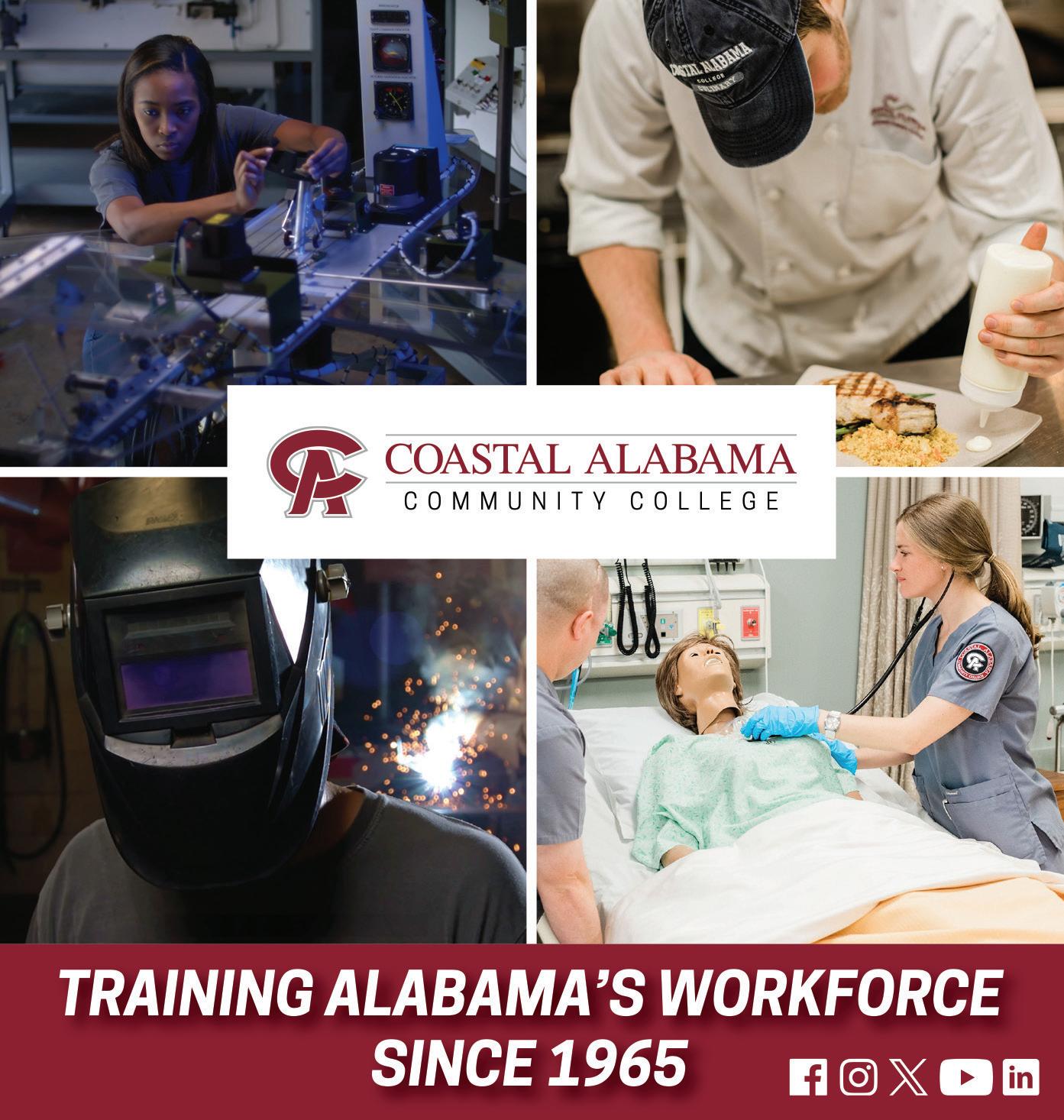

1
4




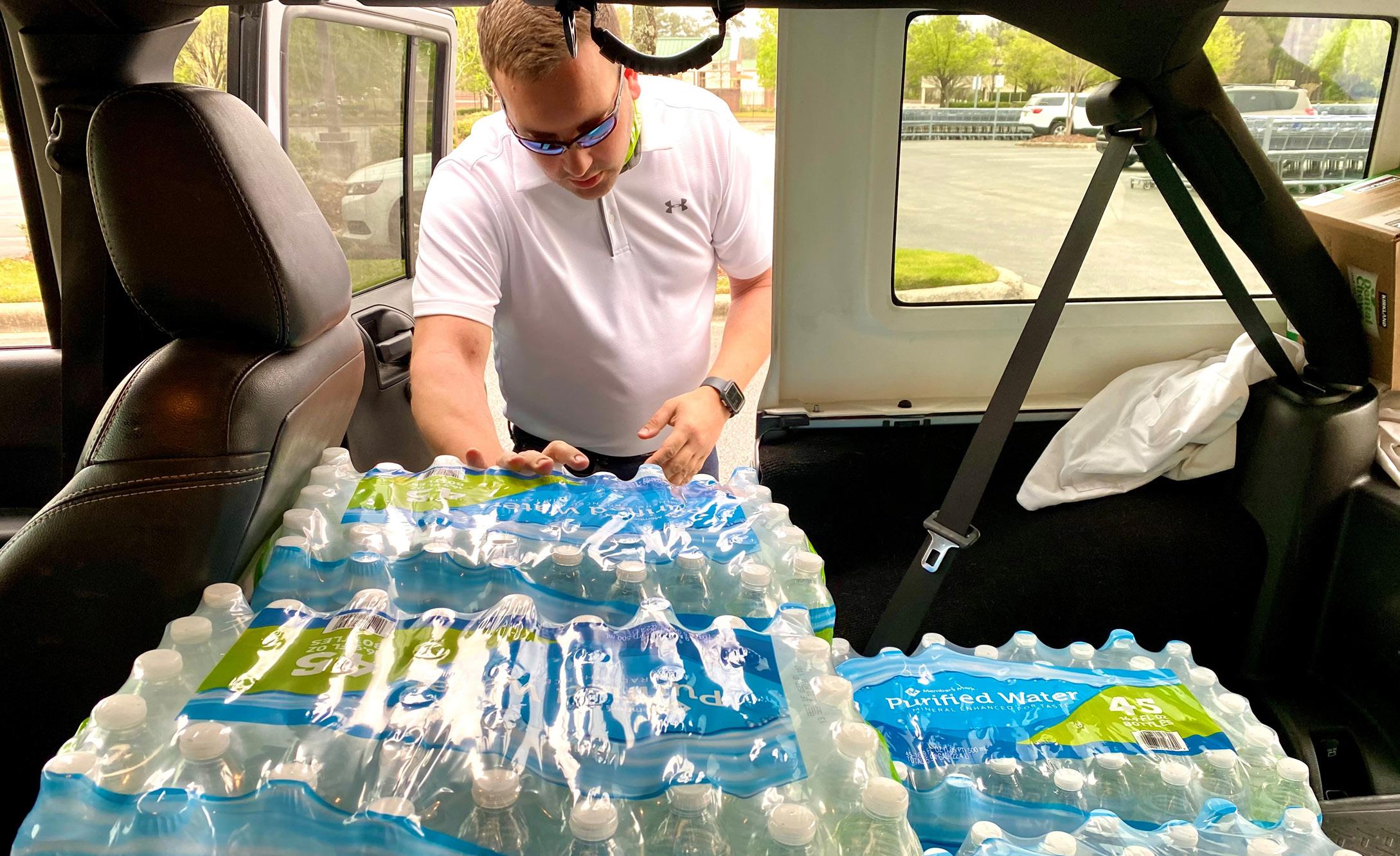
By DEBORAH STOREY
Atornado just raked your town. Your house is a heartbreaking pile of rubble. The power is out and the stores still operating take only cash.
FEMA and the Red Cross are on the way, but in the meantime Regions Bank just pulled up with a branch on wheels, a grill to cook you a burger and free water.
Regions Corp. has a disaster response program that provides a variety of financial and humanitarian services such as loans, grants, fee waivers and boots on the ground when needed.
After storms rolled through the South and Midwest on March 14-15 of this year, bank executives announced a series of disaster-recovery financial services to help people and businesses impacted:
• No check-cashing fees for checks issued by FEMA
• Personal and business loan payment assistance
• Payment deferrals for credit card holders
• Business loan payment deferrals of up to 90 days
• One penalty-free CD withdrawal
• New loan interest rate discounts of up to 0.5%
• Regions Mortgage Disaster Relief Purchase and Renovation loan programs
On a case-by-case basis following disasters, Regions waives ATM surcharges for non-customers and non-Regions ATM fees for Regions customers.
The emergency response program originated around 2005 following one of the South’s worst tragedies.
“I would say it goes back to Hurricane Katrina when the bank took the next step in terms of showing up after a disaster,” explains Jeremy D. King, Regions senior vice president and media and public relations manager.
“There was a lot of onsite service along the Gulf Coast after Katrina struck, and it brought about the need for a couple of enhancements, including having our portable branch facility that we deployed to the markets.”
Each year — and unfortunately with each tornado, hurricane or flood — the program gets better in its response, King says.
“We’re always just trying to evolve based on the needs of our customers and based on the needs of a specific natural disaster,” says John Jordan, head of retail for Regions. “It’s been a very intentional program, and we’ve built it and refined it over many, many years.
“You see tears in the eyes of customers when they feel like
On Jan. 12, 2023, workers at Edmundite Missions in Selma were spooning out dinner at their Bosco Nutrition Center, where they serve two meals daily –342,000 just last year.
Just then, an EF-2 tornado was bearing down on the city of roughly 17,000.
“We pulled everybody that was there and held them tight inside the building,” recalls Missions President and CEO Chad McEachern.
“The tornado came through and devastated us, but we were up and serving dinner that evening knowing that we are the place where folks come to in good times and bad.”
They used grills and generators to keep the food coming.
“We were using flashlights and car headlights to light the way, but we didn’t stop,” McEachern says.
The tornado did millions of dollars’ worth of damage, displaced more than 3,000 people and destroyed a thousand homes, he says, but assistance from the Regions Foundation enabled them
they’ve really been given help and support when sometimes things feel really desperate for them,” says Jordan.
In addition to the services listed above, Jordan adds that “we have a special phone line that we’ve built up for people to call with questions about personal loans or credit cards, or lines of credit, or mortgages, or home equity lines of credit.”
The various offers, Jordan says, are for a specific amount of time — typically a few weeks right after the disaster to a few months later.
Even with all that, a friendly face can be the most welcome response in a time of need.
“We find that the greatest difference we can make is just by listening,” Jordan says.
“We’re truly sitting down with a customer and just hearing what they’re going through, asking questions about how the storm has impacted their finances or their livelihood,” he says, “then really leaning into our own experience and our relationships with customers to help them create a financial roadmap for navigating the weeks and months to come.”
Regions employees live and work in these affected communities, Jordan points out, and often know the people impacted.
Besides discounted rates and fees, Regions sends employees to affected areas when the need is there.
“I remember the Tuscaloosa tornado in 2011, and I worked in Birmingham,” recalls Brent Shaffer, Regions’ community engagement manager. “We went and staffed the branches in Tuscaloosa as our associates were dealing with their families and recovering
Regions associates from Selma, Montgomery and Birmingham gathered for a day of service after Selma was struck by a tornado.
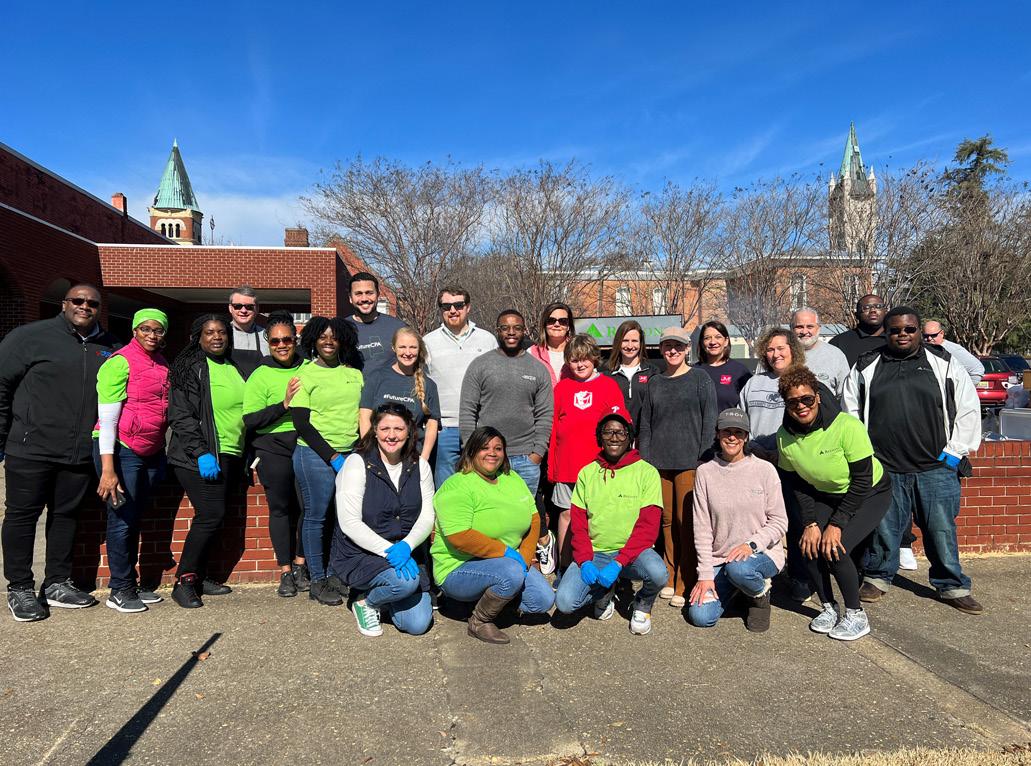
to continue their work.
“Regions has been a partner in other ways as well, but this was certainly the most significant donation that they had made,” McEachern says.
Regions is a wonderful partner, he says.
“I often say that when you have partners like Regions, you’re able to do the work that you’re able to do each day knowing that you have folks behind you supporting your work.”
or were volunteering.”
Employee safety is considered, but they will assist when they can.
“You can’t help a good Southerner, a good banker, a good neighbor from getting out there and doing that, so we do,” he says.
“We have cut down trees. We’ve cleaned up school campuses. We’ve put tarps over roofs,” Shaffer says. “We’ve helped our community partners clear out their office after it’s flooded.”
Regions funds the nonprofit Regions Foundation, which offers grants for community work in economic development, workforce readiness and to nonprofits on the front lines of community needs after a disaster.
The bank made a large contribution in 2018 to get its foundation started and continues to contribute.
“Sometimes one of the greatest needs in terms of community development or economic development is recovery after a storm,” says King. “And so over time, the Regions Foundation has emerged as a primary vehicle to be able to fuel that recovery in a very quick and efficient manner.”
In Alabama, they work specifically with the Alabama-Mississippi chapter of the Red Cross “as they’re based here with us to support the partnership we have with them,” Shaffer says.
Opportunities differ with each storm, Shaffer says. In Alabama, they are typically responding to tornadoes but other locations in their 16-state business area might be affected by a hurricane or flood.
In certain cases, they dispatch their rolling bank.
The Portable Branch Facility is based in Hoover and deploys a bank branch on wheels for particularly hard-hit disaster areas, especially if power loss is widespread. The branch includes a customer service area, ATM, 24/7 security, a wheelchair lift and generator power.
“We get that portable bank branch, which is really a full-scale bank branch on wheels, and we deploy it right there into disaster zones,” says Jordan.
Sometimes bank employees deliver water, volunteer to rebuild, or simply listen.
“Consumer banking really draws a type of person who likes to make an impact and to impact people’s lives. It’s certainly part of the culture here at Regions,” Jordan says.
Immediately after a disaster, they talk to local branch managers, community partners and clients to assess needs as quickly as possible. “For the first hours and the first day or two, we’re gathering information and then we make that recommendation of the partners that can best serve following the storm,” says Jordan.
After Hurricane Michael, they visited affected branches in South Alabama and the Florida Panhandle. They went to Helena, Oak Mountain and Jacksonville State after tornadoes there to deliver water and help. The bank launched disaster recovery financial services in Calera and Clanton after the March storms, Baldwin County after Hurricane Sally in September 2020 and the Carolinas following Hurricane Helene.
When disaster cuts power and services, Regions deploys a portable branch, with an array of banking services and its own generator.
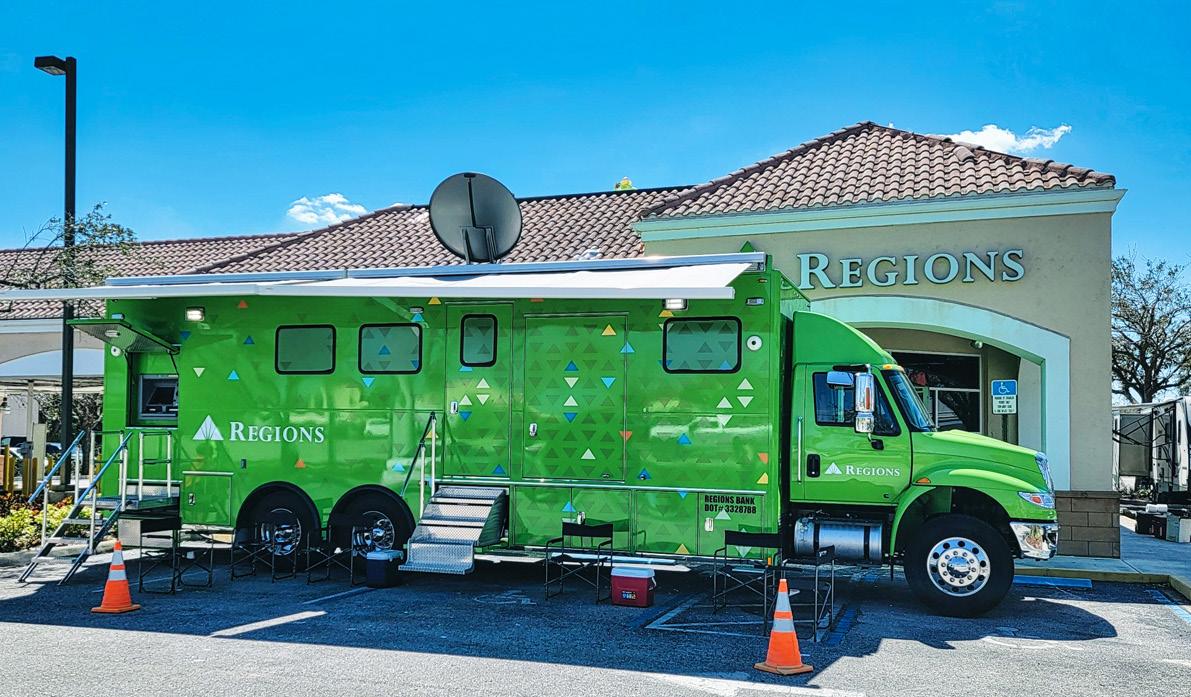
They took their huge grill to Selma after a 2003 tornado to feed first responders.
“That’s another love language of our associates, I think, is getting in there and feeding those that are doing that chainsaw work,” says Shaffer.
Regions serves customers across the South, Midwest and Texas, and through its subsidiary, Regions Bank, operates approximately 1,250 banking offices and more than 2,000 ATMs.
Deborah Storey is a Huntsville-based freelance contributor to Business Alabama.



By NANCY MANN JACKSON
Macke Mauldin, president at Sheffield-based Bank Independent, recently met with a business customer who’s currently building a new facility. The customer’s business had plans to outfit the building with a wide range of technological equipment, but after meeting with his technology supplier, he had to postpone those plans.
“The supplier said, ‘With the new tariffs, we don’t know if this equipment will cost $50,000 or if it will be $150,000 when it hits the port,’” Mauldin says. “So, our customer’s business decided to put the technology on hold.”
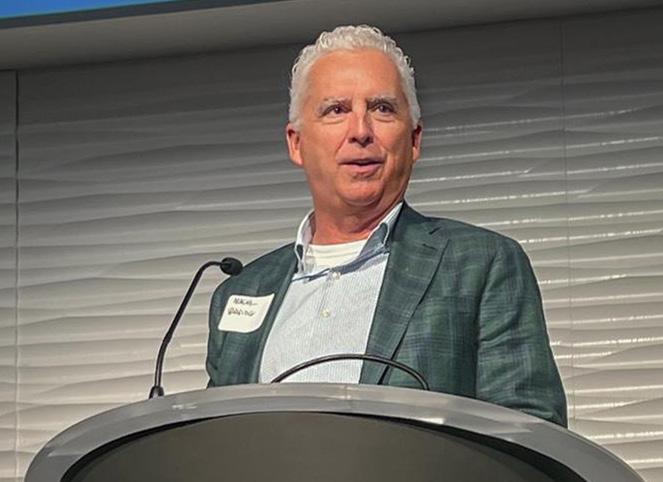
“Many of our customers are very concerned, but they haven’t realized the impact yet because the policies keep changing all the time. That can be paralyzing to a business because they can’t act when they don’t know what’s going to happen.”
— Macke Mauldin, Bank Independent
It’s just one example of how Alabama banks are seeing their customers pause investment plans or otherwise respond to uncertain economic conditions.
And the experience is widespread.
In an April 2025 earnings call, John M. Turner, president, CEO and chairman of Regions Bank, said, “The current conditions have created uncertainty, which has caused many of our clients to delay investments.”
Faced with persistent inflation, quickly changing federal economic policies and weighty trade negotiations, both consumers and businesses are approaching financial decisions with hesitancy. Alabama banks are working to provide support as their clients wrestle with constantly changing economic headlines.
Bank Independent reached out to 120 business customers across North Alabama to learn how they are feeling about new tariffs, which President Donald Trump has recently increased for every trade partner including Canada, Mexico, China, Great Britain and European Union countries.
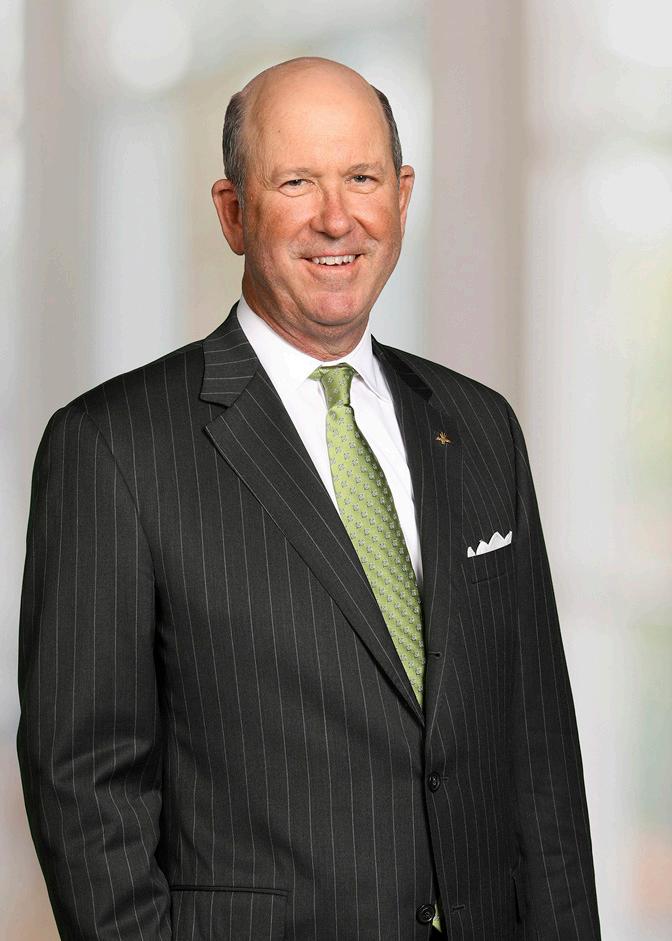
“The current conditions have created uncertainty, which has caused many of our clients to delay investments.”
— John M. Turner, Regions Bank

“The general consensus is that tariffs affect different industries in different ways,” Mauldin says. “The paper industry, for example, relies on international materials and many are looking for new suppliers. There’s a lot of pressure on suppliers to absorb the cost of tariffs because if they pass the increase along to customers, they’ll lose those customers.”
In other industries, some suppliers are adding a new line item for tariffs on their invoices, Mauldin says.
“Many of our customers are very concerned, but they haven’t realized the impact yet because the policies keep changing all the time,” Mauldin says. “That can be paralyzing to a business because they can’t act when they don’t know what’s going to happen.”
Regions’ business customers are responding similarly. “Clearly, the volatility of uncertainty has customers in sort of a wait-andsee mode,” Turner says. “I do think as it becomes more clear what the nature of the tariffs will be, what products they’ll be applied to, what countries and to what degree, the customers can be more certain about the potential impacts.”
Businesses and individuals may be cautious, but they’re still making financial decisions. While Regions Bank’s business customers also are trying to understand the impact tariffs will have on the cost of their projects, many still have capital to spend.
“Within the middle market customer space and in real estate, we’re beginning to see pipelines expanding a bit,” Turner says.
“And so those customers are more interested in making investments, we think, and that likely will continue. Customers are still carrying a tremendous amount of liquidity on their balance sheets. We’ve seen a significant growth in what I’ll call wholesale deposits, both on balance sheet and off balance sheet, and I think until customers begin using that liquidity, it’s not likely we see any real increase in borrowings under lines of credit.”
While Mauldin says he has heard consumers express caution about spending anecdotally, those fears have not yet really translated into significant changes. U.S. consumer spending increased slightly in April, according to a May 30 report from the Department of Commerce.
“We haven’t really seen the impact of the tariffs on our prices yet,” Mauldin says. He expects to see consumer spending slow when retail goods start reflecting higher prices due to tariffs.
In fact, some economic research suggests that many consumers have been spending more throughout the spring to attempt to get ahead of tariff-related price increases. Bank of America data shows that consumer card spending on durables, such as furniture, electronics and building supplies, increased significantly in March. Bank of America data also shows that consumer vehicle loan applications remained strong throughout the month of April, suggesting that consumers may be interested in purchasing vehicles before tariff price increases take place.
Despite the uncertainty, most banking customers are optimistic that the economic bumps will be smoothed and the long-term outlook will improve. For example, Mauldin mentions that in other times of great unpredictability, including the COVID-19 pandemic, the 2008 recession and the 2007 housing crisis, “the federal government has come through like a knight in shining armor and helped us manage through it.”
Bankers and their customers hope the same thing will happen this time. “The vast majority of our customers respect the discussion about tariffs because they want trade to be fair,” Mauldin says. “They realize it will be a short-term situation, and they see it as a fairness issue. But they all want definitive answers.”
Regions clients also remain optimistic that the economy will improve, Turner says. During March and April, Regions bankers spent time visiting with more than 60% of their corporate banking customers, which are non-real estate corporate customers, according to Turner. “We have a pretty good sense of their frame of mind,” he says. “I would say customers are still optimistic, but very much in a wait-and-see mode.”
Bankers across the state are taking action to make themselves


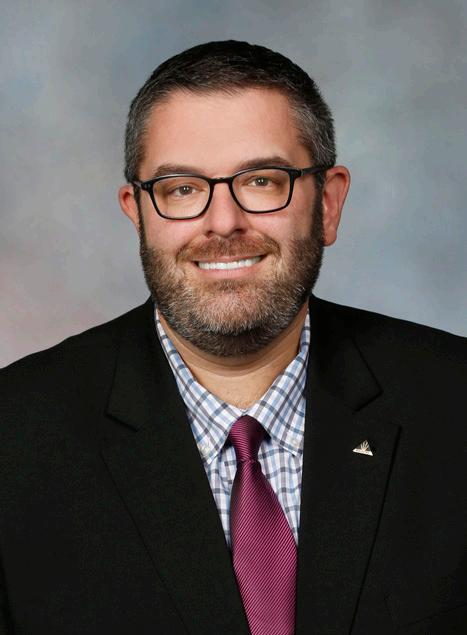
“This is a time when having an updated financial conversation with your banker can make a real difference.... People don’t have to face economic uncertainty alone; they can benefit through the help of financial advice and guidance from people who care.”
— Jeremy King, Regions Bank

available to help businesses and consumers manage through the economic uncertainty and hopefully, to arrive financially secure on the other side of the chaos. For example, Regions is investing in new hires across its footprint to focus on building relationships with small businesses, Turner says.
Regions also offers its Greenprint plan, a personalized financial plan, to both businesses and consumers at no charge. “It’s a very intentional approach toward making sure we’re delivering our best advice and guidance to meet people where they are and help them build savings, manage expenses, pay down debt and accomplish any number of other goals,” says Jeremy King, senior vice president, media and public relations manager at Regions.
“This is a time when having an updated financial conversation with your banker can make a real difference,” King adds. “People’s goals are unique. Their opportunities and their challenges are unique. We can deliver some of our best service and support when people know they can come to us, review their finances and set up an actionable plan to navigate those opportunities and challenges. People don’t have to face economic uncertainty alone; they can benefit through the help of financial advice and guidance from people who care.”
Nancy Mann Jackson is a Madison-based freelance contributor to Business Alabama.

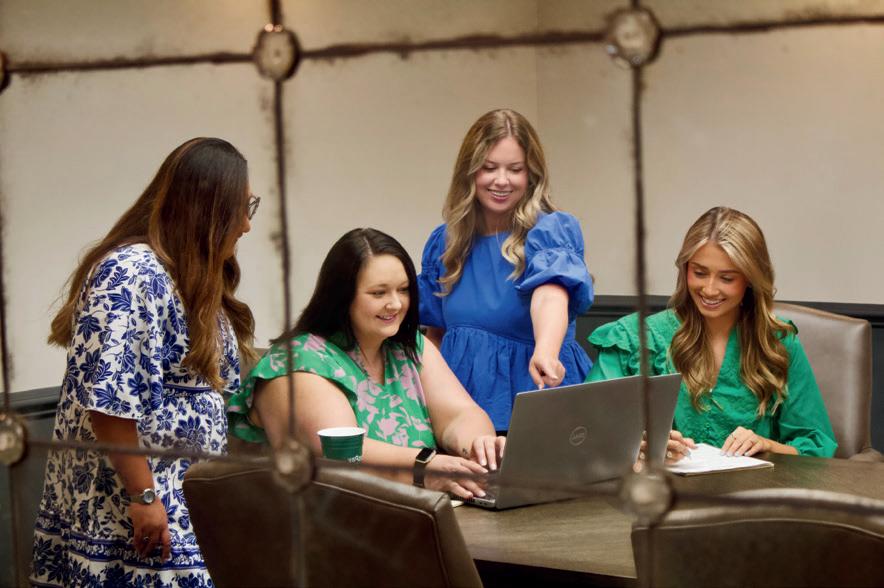


Looking
at its 20-year history, ServisFirst’s customer-centric approach will continue into
the foreseeable future
By NANCY RANDALL
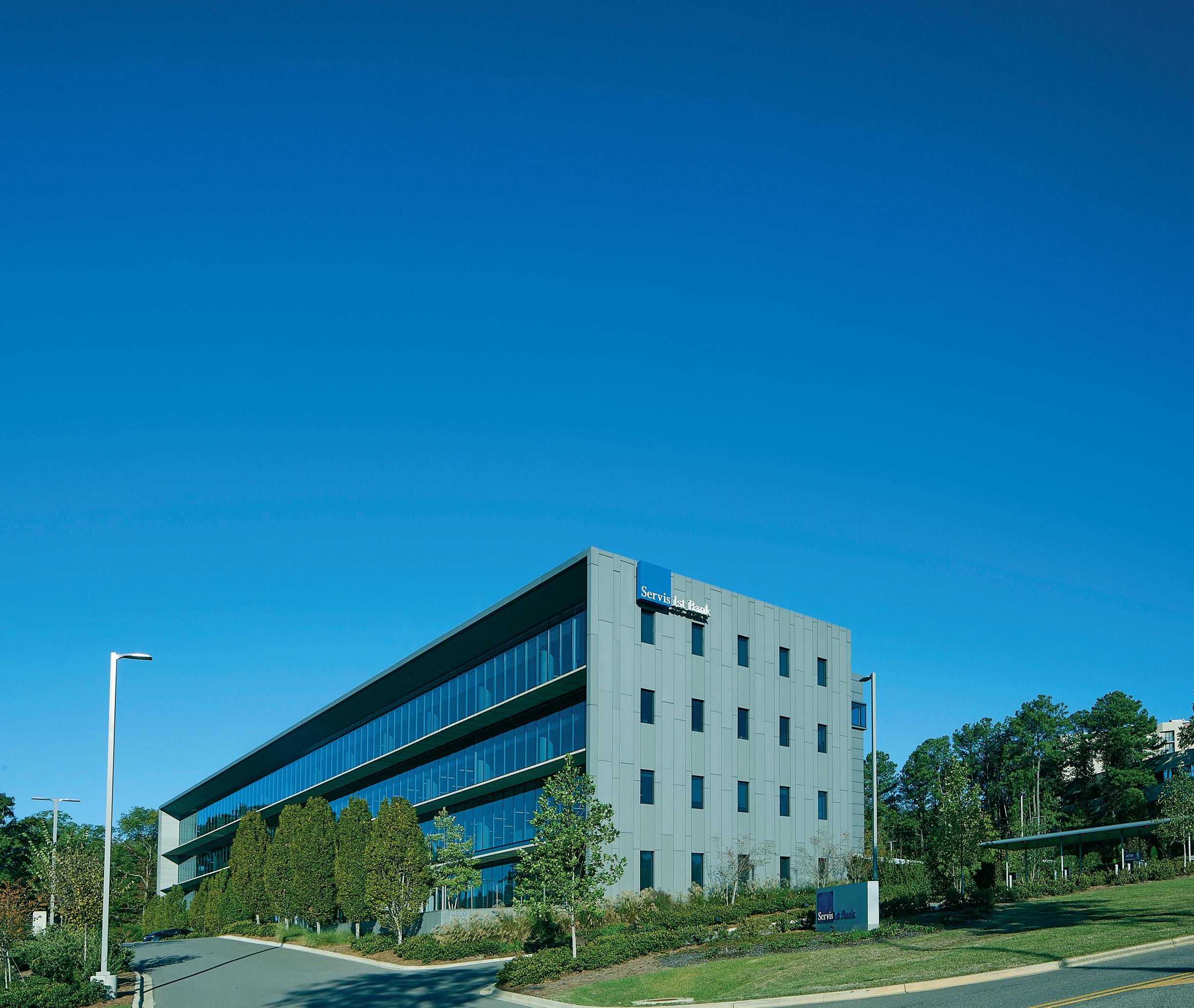
An anniversary is a time for reflection, looking back at what has gone well and what may need changing.
But as ServisFirst Bank marks its 20th year in business, it is staying solidly focused on its original strategies — applying a personalized touch to customer service and employing a decentralized model of operation.
Those factors appear to be working well for ServisFirst, which now has assets exceeding $18 billion. Among other accolades, its high-performance model was recognized on Forbes’ list of America’s Best Banks, ranking 15th in 2023 among the top 100 publicly traded banks based on growth, credit quality and profitability.
A strong client focus was a big impetus for the bank’s founding in Birmingham in May 2005, explains Tom Broughton, chairman, president and CEO. “If you don’t think that existing banks are doing a good job of serving clients, and you think there’s a better way to do it, that’s an opportunity for a new bank.”
ServisFirst targets the business and correspondent banking markets, and also offers private banking, says Rodney Rushing, executive vice president and chief operating officer. “We serve a lot of small businesses, but we don’t have a branch network as we are not a consumer-based banking organization,” he explains.
In March 2011, the firm added correspondent banking to its mix of products
as it fit well with ServisFirst’s business banking model, Rushing says. “There was a void in providing services to community banks. That was the exact same void that Tom saw in the mid-market business community,” he notes.
Rushing describes correspondent banking as “a bank for bankers.” Small community banks often have limited resources and need help from a larger bank, he explains. One example — a community bank may have a good customer who needs a loan, but the amount is more than the bank’s legal lending limit.
ServisFirst can provide these banks with credit services, some operational services, wires, international services and credit cards. “Basically, we help them
compete with the other banks in their market by being able to provide some of those services,” Rushing explains.
Currently, nearly 390 downstream banks in 30 states have accounts with ServisFirst, according to Rushing. The mix also includes several small community credit unions.
Serving the business community’s banking needs goes beyond the usual tasks of a bank at ServisFirst. For example, a company may request a loan from ServisFirst for an expansion. “[Our answer] may not be a ‘yes,’ [but] we can do it this way,” Broughton explains. That “way” may be to suggest an economic development incentive instead.
“That is the point of having the bank and making it different. We try to add value to our customers instead of just simply being a place for taking deposits and making loans. We try to figure out how we can add value for them and how they can be more efficient,” Broughton says.
Another way that ServisFirst differentiates itself is by using a decentralized model of operation. Twelve regional CEOs across the Southeast manage their own ServisFirst banks, note Rushing and Broughton. “Tom gives a lot of authority to local management. He lets them run their own bank. And he gives them credit authority up to a certain point,” explains Rushing.
Decentralization speeds up loan decision-making and also supports ServisFirst’s personalized customer service.
For example, when a loan above a bank’s credit authority is needed by a business owner, the application goes to the Birmingham office for approval. In a typical bank’s centralized management structure, the approval could take weeks due to a credit committee that only meets periodically, Rushing explains.
But at ServisFirst, the chief credit officer, along with Broughton or Rushing, quickly meet to review the credit request. They make a timely decision and relay this to local bank management, Rushing says. In turn, the local bank quickly informs the customer with whom he’s already built a relationship.
“So, that decentralized model in the Southeast has worked [for ServisFirst] as
“
We’ve tried to be a very great place to work for our employees. Our people probably work a lot harder than most banks, but we’ve seen more success than most banks, and that’s because our employees do an outstanding job. We built something that’s worthwhile, and we’re really proud of it.”
— Tom Broughton, ServisFirst Bank
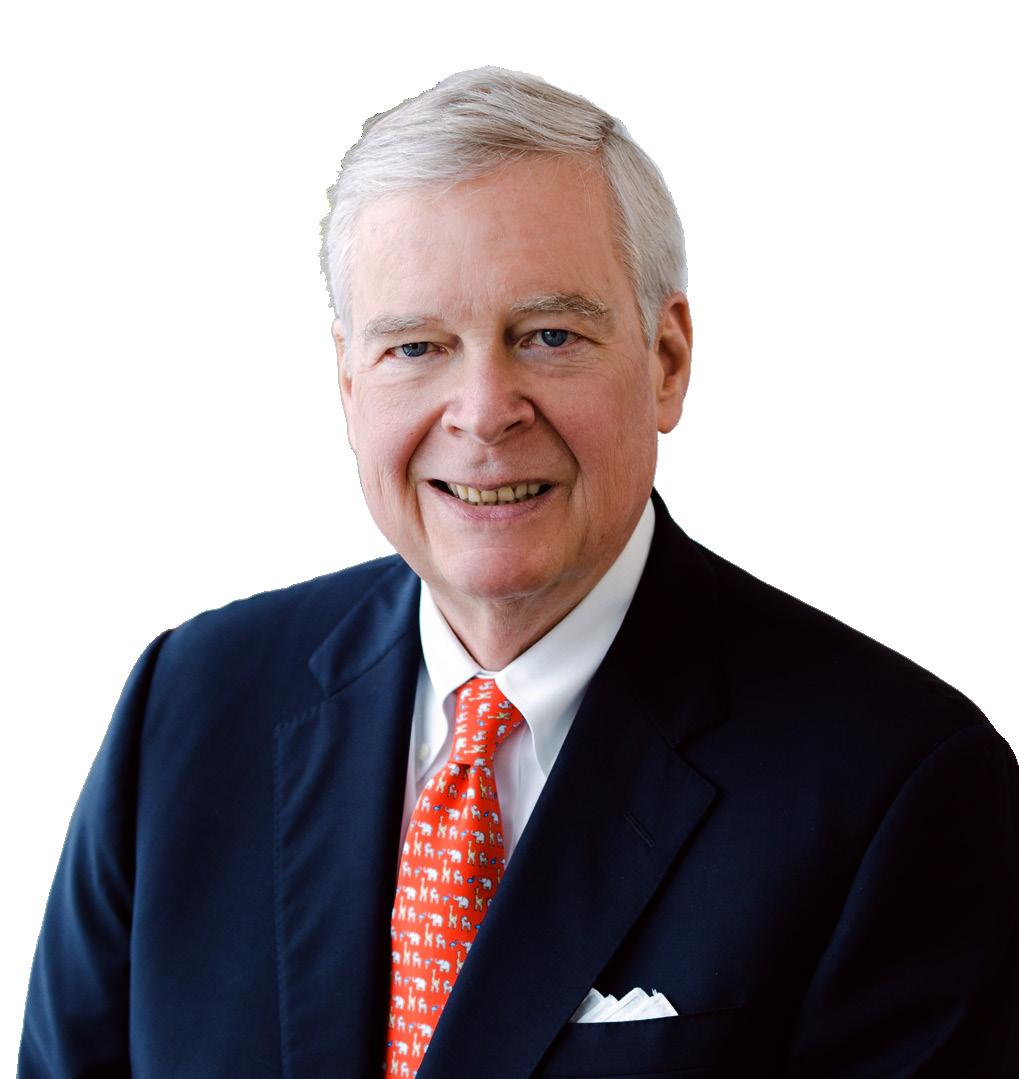
opposed to a lot of our competitors where a business owner has to call the bank, introduce himself, and try to find out who’s in charge of his account now,” Rushing explains.
In looking back on ServisFirst’s 20-year history, Broughton says that, other than adding correspondent banking, the firm’s original business strategy hasn’t changed.
“We’ve never had a strategic planning meeting for the bank since the bank started 20 years ago,” he notes.
He remembers a strategy-related argument with his father about Southwest Airlines. His father didn’t like the carrier because it didn’t offer assigned seats or a first-class section, which he preferred on longer trips, Broughton says.
“He just didn’t understand [how
Southwest operated]. So, I asked him, ‘how many times do you think they’ve been tempted to add first-class seats?’ Well, guess what? They’re finally adding first-class seats. But they kept their business model,” Broughton explains.
ServisFirst runs with this same simplicity at its core. “We haven’t complicated it. We don’t try to be all things to all people,” Broughton says, noting that larger banks tend to frequently add new programs that they believe will improve their banks.
“There really aren’t any magic bullets. The best thing you can do is focus on improving your service to customers and keeping things simple,” Broughton says.
Looking forward, ServisFirst plans to continue adding new markets across the Southeast, according to Broughton. Key
We serve a lot of small businesses, but we don’t have a branch network as we are not a consumer-based banking organization.” “
— Rodney Rushing, ServisFirst Bank

to this growth is finding the right bankers who want to join ServisFirst, he says. The firm’s current footprint extends across seven states in the Southeast, with 34 banking locations.
“We continue to grow and scale the bank up, but growth is not the goal,” Broughton says. “Serving customers is a goal, and growth and profitability are byproducts of doing what we should be

doing with our time, which is focusing on the customers’ needs,” he notes.
In marketing materials, ServisFirst refers to itself as a “disciplined growth company.” What does that mean exactly? Broughton says it’s about growing organically. “We grow with core deposits [from core customers] — the right way. And it also means that we grow profitably.”
In today’s uncertain economic climate in the United States, it’s natural for banks to get jittery about the future. But ServisFirst, Rushing notes, is maintaining a steady course. “We don’t try to predict whether rates are going up or down. We try to make our margin no matter what happens with rates. We’re not going to do anything any differently. We’re going to be consistent. And that’s what customers want you to be.”
Looking in the 20-year rearview mirror, what is Broughton most proud of at ServisFirst? “The jobs we’ve created for our employees and the service we give our customers,” Broughton answers.
“We’ve tried to be a very great place to work for our employees. Our people probably work a lot harder than most banks, but we’ve seen more success than most banks, and that’s because our employees do an outstanding job. We built something that’s worthwhile, and we’re really proud of it.”
Nancy Randall is a Tuscaloosa-based freelance contributor to Business Alabama.

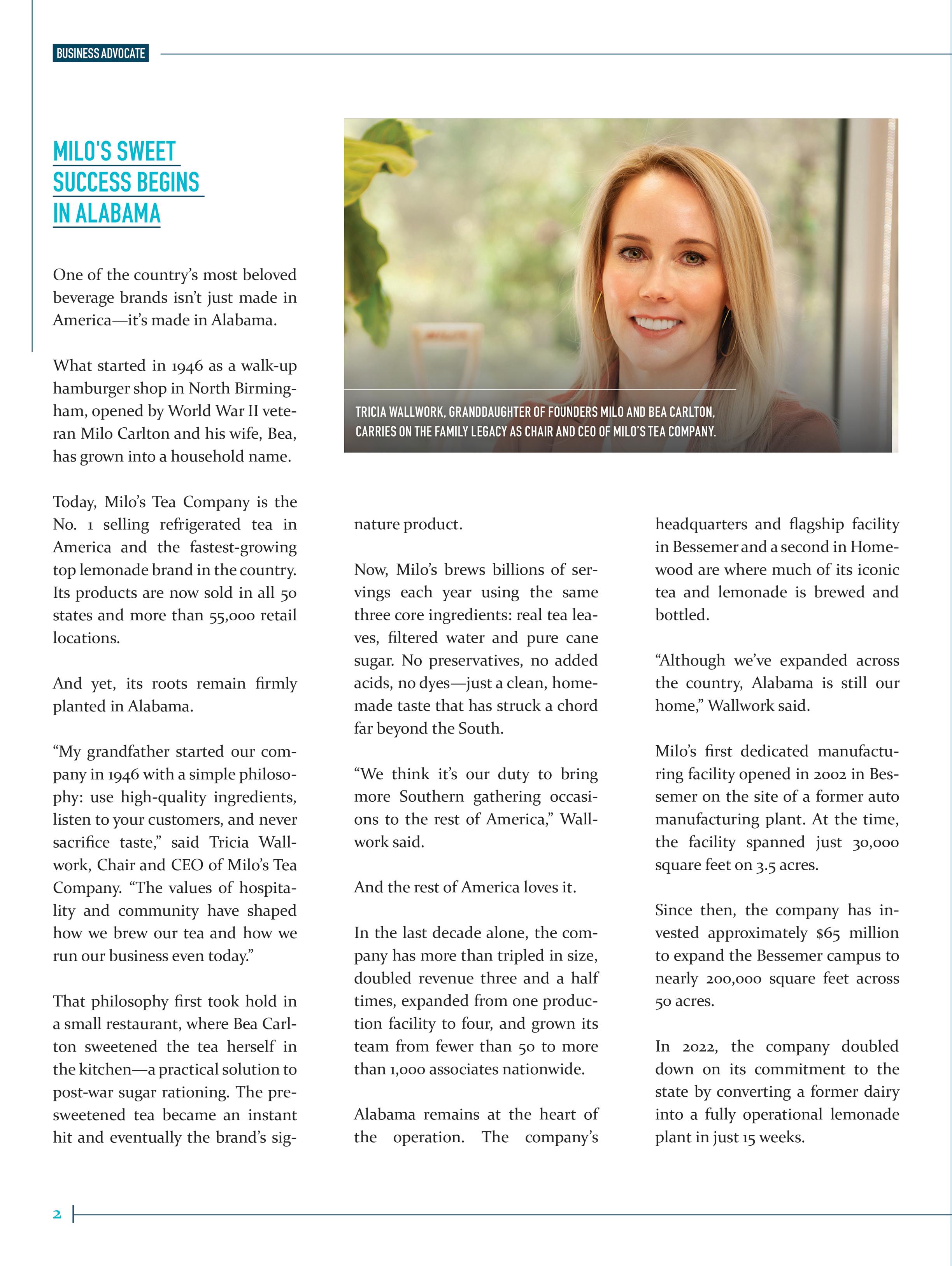

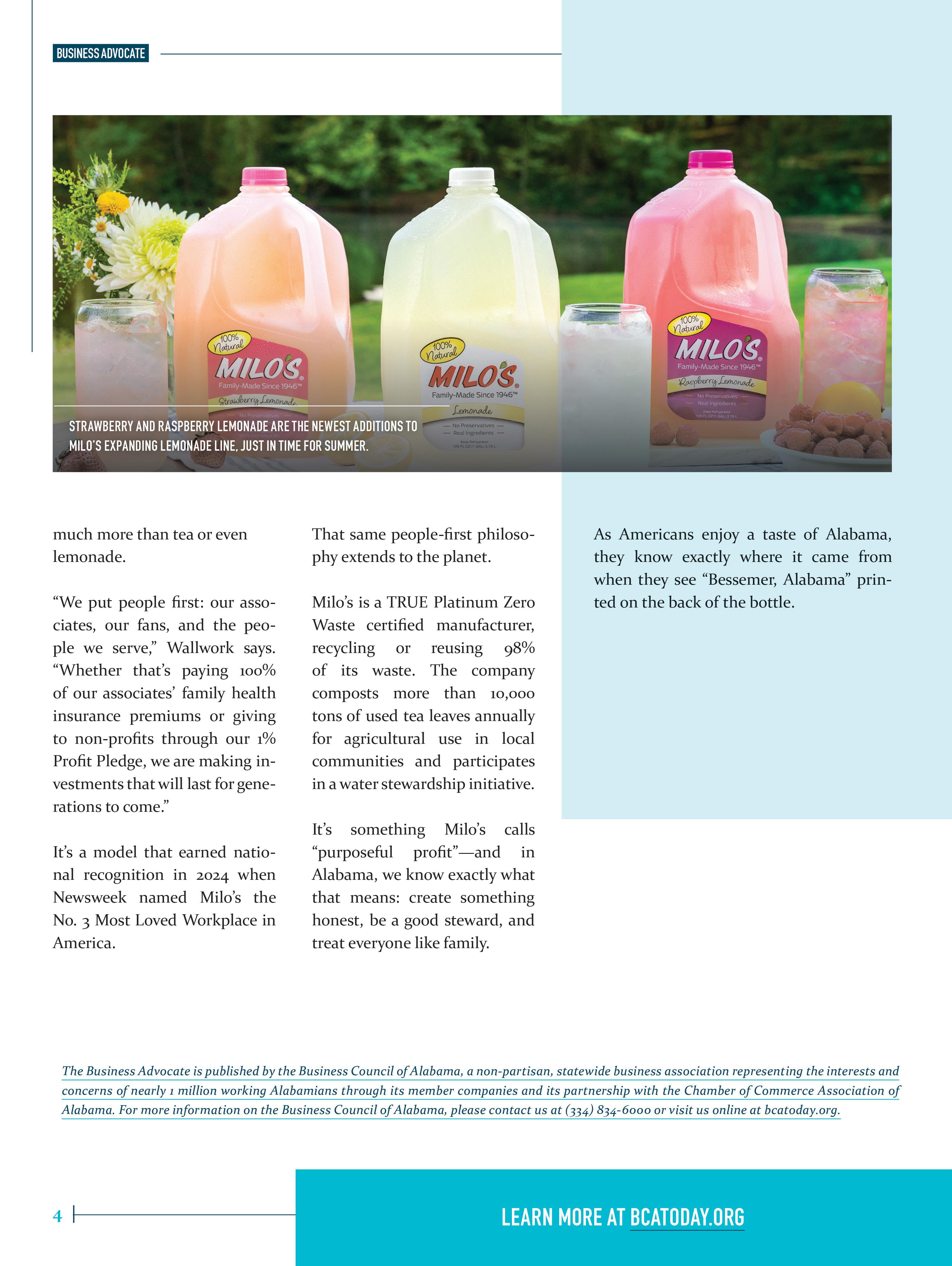

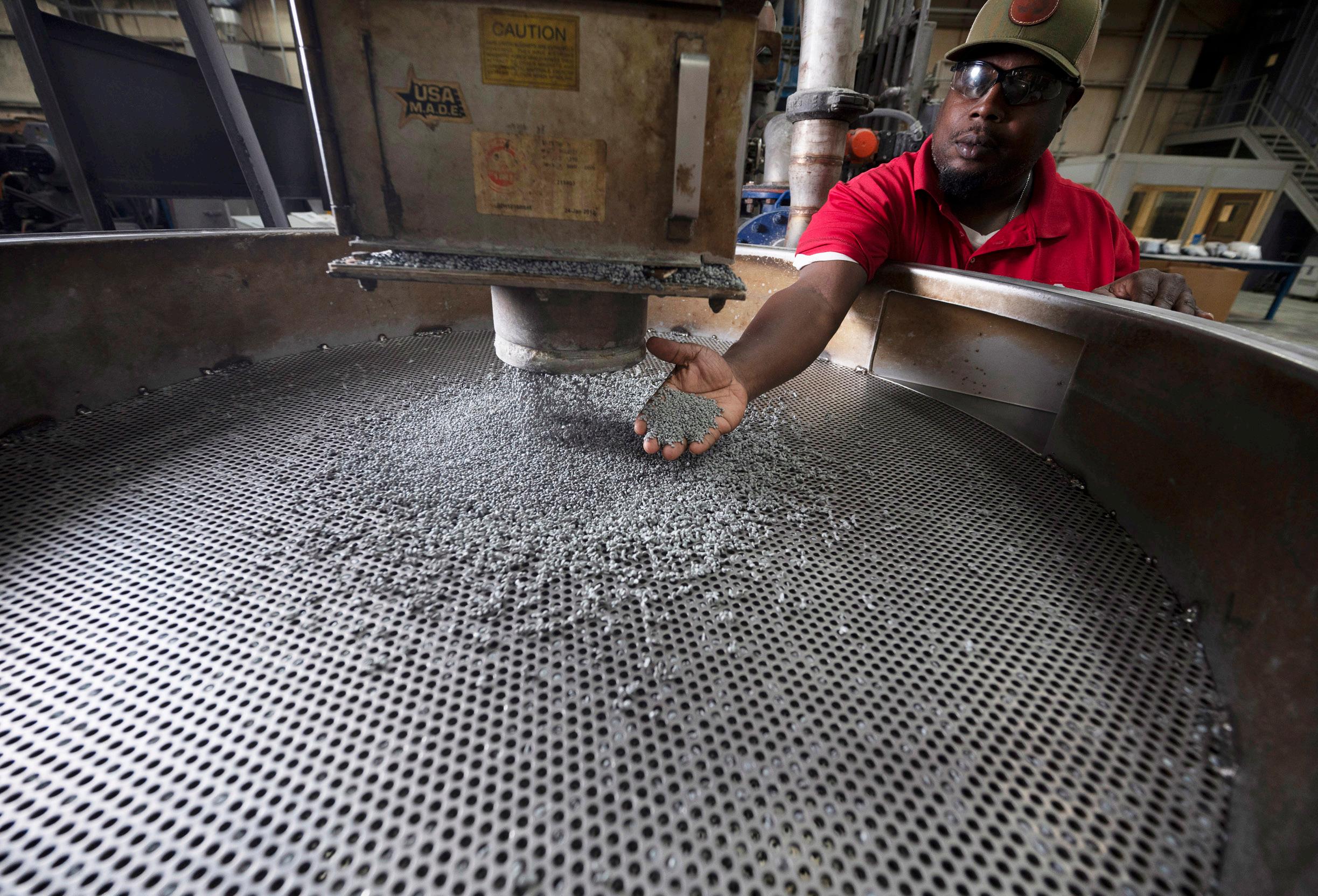
Troy’s KW Plastics transforms bales of plastic throwaways into raw materials for new products
By KATHLEEN FARRELL
Photos by STEW MILNE
Some photos courtesy of KW Plastics
You may not be familiar with the KW Plastics name, but it’s extremely likely that plastics supplied by the Troy-based company are in your home or under the hood of your car.
“KW Plastics is the world’s largest recycler and supplier of high-density

advocacy for KW Plastics Recycling Division. Materials produced by the company are sold to many of the most popular brands in America.
KW Plastics’ company story is one of growth and innovation, responding to

post-consumer resin is used in packaging for many major brands of household and personal care items.
market needs and developing new technologies through years of in-house research.
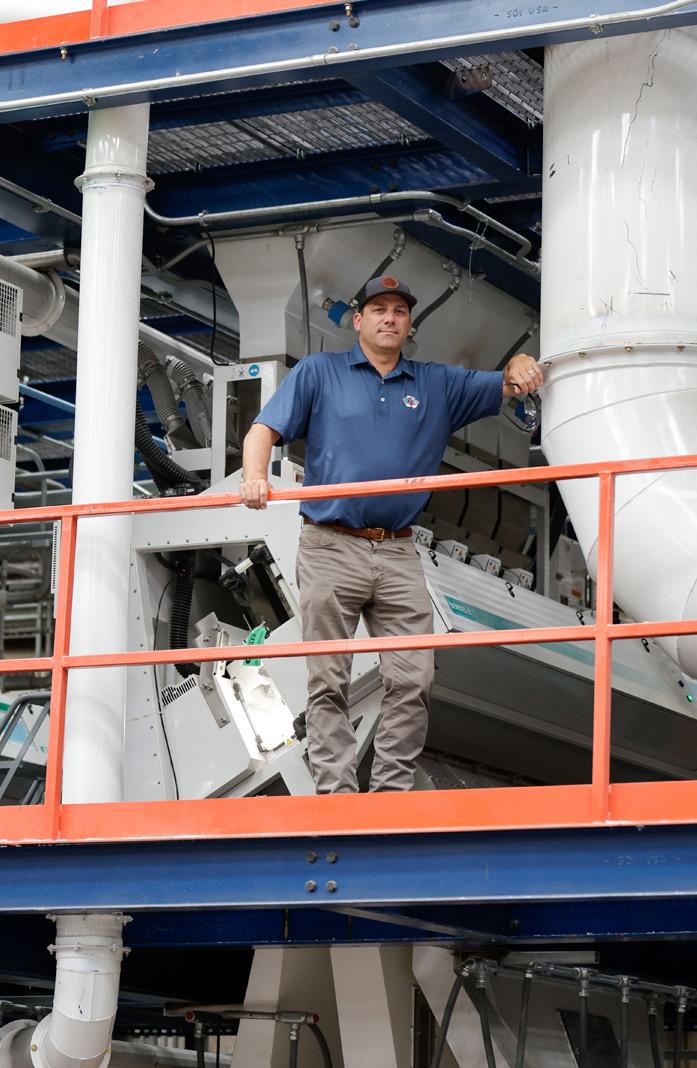
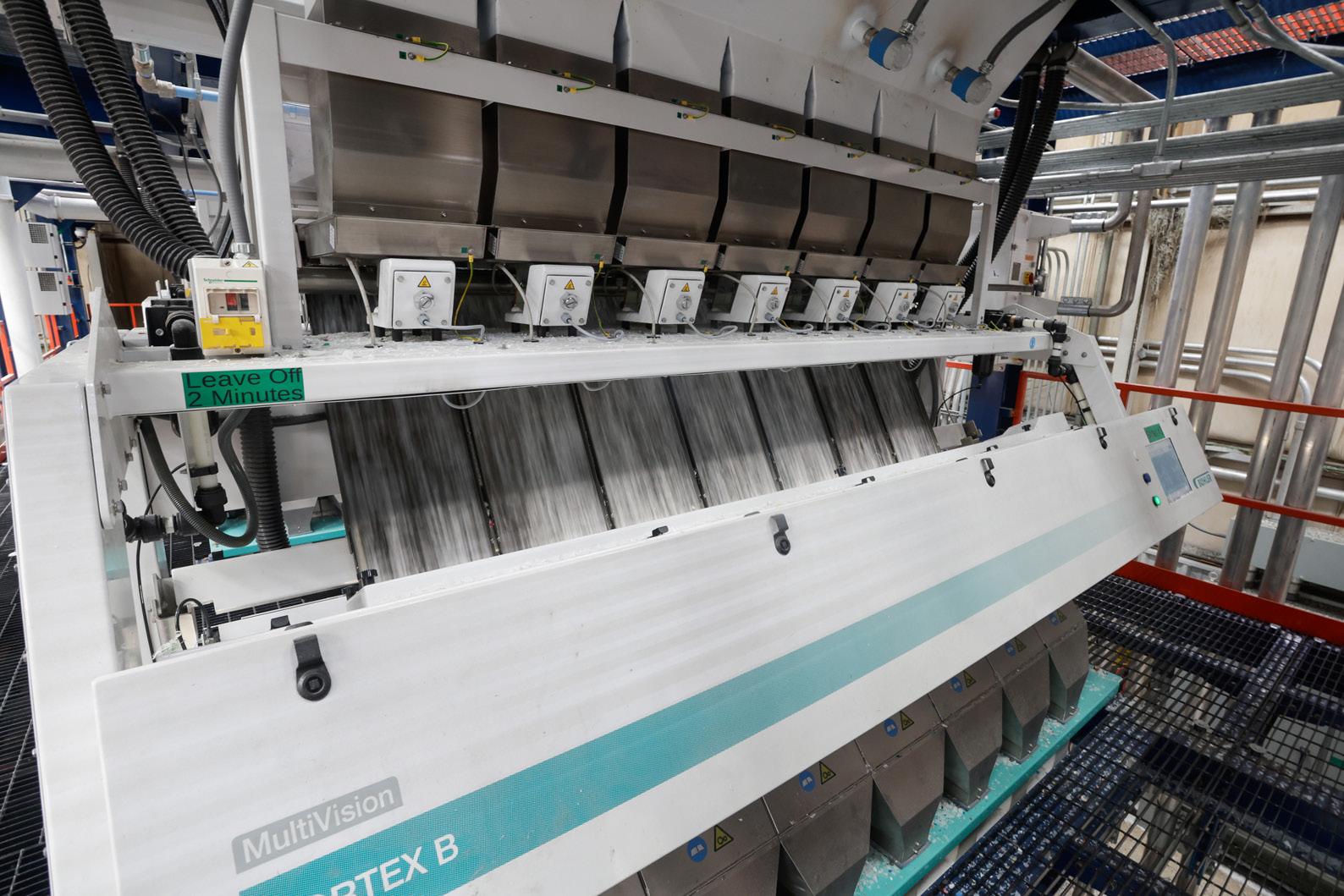

Formed in 1981 to recycle polypropylene (PP) plastic from used automotive battery casings, KW Plastics set out to solve the issue of safe disposal of these hazardous materials.
“The result was a recycled resin that fulfilled environment regulations, material specifications and offered economic savings to automotive battery manufacturers,” Baker says.
As distribution needs increased on the west coast, KW Plastics opened a second facility in the mid-1980s in Bakersfield, California, which is still operating there.
KW is part of a family of businesses, which includes the Wiley Sanders Truck Lines. The company gets its name from the first initials of its founders, Kenny Campbell and Wiley Sanders.
The initial battery casing recycling business successfully captured a large portion of the market share, and Campbell and Sanders began to look for ways to diversify and expand the business.
In the early 1990s, residential curbside recycling programs were being implemented across the U.S. The KW Plastics Recycling Division was opened in 1993 to recycle post-consumer high-density polyethylene (HDPE) — household plastic bottles like milk jugs, detergent containers and shampoo bottles — col-
lected from these recycling programs. In 1998, KW Plastics entered the packaging industry with KW Container, an injection company that molds paint containers from recycled PP. These containers are sold to top paint brands and can be found at nearly all major paint and home improvement stores.
Across its operations, KW Plastics processes approximately 7.5 million containers each day and more than 750 million pounds of plastic annually. In addition to HDPE, the company recycles PP plastic, commonly referred to as #5 resin, which is used in take-out food packaging, ketchup and syrup bottles, and storage containers.
The company purchases bales of sorted and graded plastic from residential collection programs and material recovery facilities throughout North America. Through a proprietary washing, blending and extrusion process, the company reprocesses the recycled materials into recycled resin pellets that are sold to various molders across the country.
“End-use applications include packaging for household and personal care items, as well as automotive, agriculture, recreational and durable goods,” Baker says. “We have strong market demand with brand owners’ commitments to use post-consumer recycled content
in more packaging.”
The company operates 19 extruders and has seven custom wash lines with the eighth being installed at this time.
KW Plastics has a dedicated quality lab to test both inbound and outbound material. Each load of recycled resin sold is first certified and matched to customer specification. “We work closely with several of our customers during their design and innovation phases to test, modify and experiment with material choices to ensure the right resin at the right percentage to meet — if not exceed — their expectations,” says Baker. “Several of our customers require rigorous testing, particularly our automotive molders. We also have letters of no objection from the FDA for two of our products.”
Baker notes that KW Plastics sees itself as equal part plastic recycler and postconsumer resin supplier, providing some of the world’s largest brands with highquality material.
“We add value to material that otherwise costs money to bury in a landfill,” says Baker.
“Recycling has both economic and environmental rewards, and we consider ourselves a manufacturer that plays a significant role in helping our customers achieve their sustainability goals.”

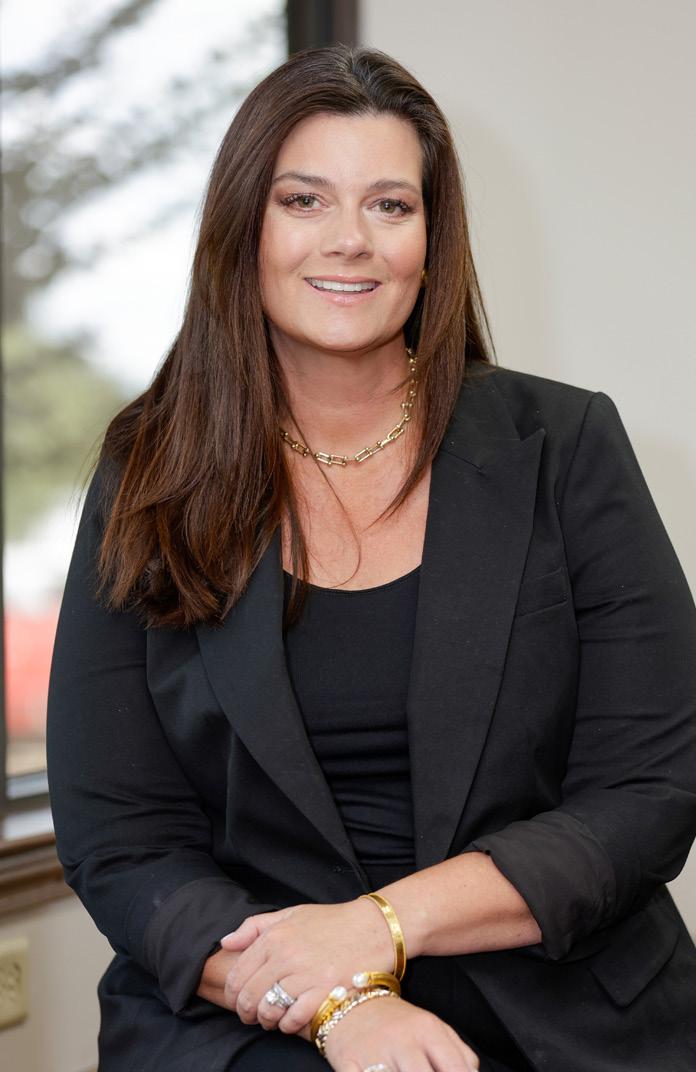
“
Recycling has both economic and environmental rewards, and we consider ourselves a manufacturer that plays a significant role in helping our customers achieve their sustainability goals.”

KW Plastics supplies to several operations within the state of Alabama, including automotive suppliers, plastic pipe manufacturers, irrigation systems and a toy company.
Supply is one of the largest challenges facing the plastics recycling industry. KW Plastics is among many Alabama companies that rely on recycled materials. Other reclaimers operating in the state reprocess paper, polyethylene terephthalate (PET) plastic, steel and aluminum.
“The Southeast has strong end markets for these commodities, and yet we supply more than we source to our own state and regions,” Baker says. “While Alabamians may have recyclable materials in their homes, our state is lacking the investment and infrastructure to get these valuable materials from the garbage can to the recycling bin and to facilities like ours.”
KW Plastics has played an instrumental role in advocating for legislative policies to boost recycling efforts in the state. Baker serves on the Association of Plastic Recyclers (APR) Communications and Public Affairs Committee, the board of the Alabama Recycling Coalition, and as a member of the Recycled Materials Association (ReMA) and the Scrap Recycling Association of Alabama (SRAA).
Across its facilities, the KW compa-
nies, not including the trucking business, employ approximately 600 people in roles from welders, electricians and fork-lift drivers to extruder operators, maintenance personnel, IT professionals and lab technicians, in addition to its sales and procurement teams.
The company is led by General Manager Scott Saunders and Director of Operations Christopher Campbell.
Saunders has been with KW since 1994, when he joined as director of raw material procurement. He was named GM in 2007 and currently serves on the board of the APR and ReMA.
Campbell has been with the company for 20 years, working in a variety of departments, including shipping and receiving, customer service and sales, and plant management.
The company and its leadership maintain a close connection to the local community. Baker is in her second term as a member of the Troy City Council, currently serving as president pro tempore.
KW Plastics creates a significant economic impact for the city of Troy. “As one of the largest employers in Pike County, the Sanders/KW family of companies has the largest industrial footprint in Pike County, with five locations along or near
— Stephanie Baker, KW Plastics
Henderson Highway, including a rail site,” Baker says.
The industrial utility load of the KW companies allows the city of Troy to purchase wholesale electricity and offer lower rates to its residents. This benefit is attractive to new business and supports the expansion of existing businesses, she notes.
KW Plastics also has worked closely with Troy University to offer grant support, share industry connections and support the advancement of plastics recycling. The university received federal funding to establish the Center for Materials and Manufacturing Sciences (CMMS), which provides an opportunity for R&D and the commercialization of polymer science technology.
At the plant, KW Plastics has plans for continued growth with an additional wash line and, possibly, expanding capacity to meet market demand, Baker says.
“Recycling is manufacturing,” she adds. “While it has incredible environmental rewards, there’s also a very strong economic benefit.”
Kathleen Farrell and Stew Milne are freelance contributors to Business Alabama. She is based in Mobile and he in Auburn.
Ranked by most recent sales figures available as of press time. Companies tied in sales figures are ranked by number of Alabama employees. If both numbers are tied, they are listed in alphabetical order.
1
2
3
4 EBSCO Industries Inc. J. David Walker President and CEO 5725 Hwy. 280 E. Birmingham, AL 35242 (205) 601-9949
5 Great Southern Wood Preserving Inc.* Jimmy Rane CEO 1100 U.S. Hwy. 431 N. Abbeville, AL 36310 (334) 585-2291
6
Shades Creek Pkwy.
AL 35209 (205) 870-1000
7 Motion Industries James Howe President 1605 Alton Rd. Birmingham, AL 35210 (205) 956-1122
8 American Cast Iron Pipe Co. J. Michael O’Brien President and CEO 1500 32nd Ave. N. Birmingham,
9
10
32
AL 35222 (205) 592-3866
Wholesale Distributors Inc.* Frank D’Amico III CEO 100 Airview Ln. Alabaster, AL 35007 (205) 397-1708
33 Sanmina-SCI Systems (Alabama) Inc. Jure Sola Chairman and CEO
Memorial Pkwy. SW Huntsville, AL 35803 (256) 882-4800
34 Joon Inc. Jong Ho Sea President 1500 County Rd. 177 Cusseta, AL 36852 (334) 756-8601
35 Tennessee Gas Pipeline Co. LLC Richard Kinder Chairman 569 Brookwood Village Ste. 749 Birmingham, AL 35209 (205) 406-6675
36 Thompson Tractor Co. Inc. Michael Thompson Chairman 2401 Pinson Hwy. Birmingham, AL 35217 (334) 215-5000
37 Vertiv IT Systems Inc. Doyle Weeks President 4991 Corporate Dr. NW, Huntsville, AL 35805 (256) 430-4000 vertiv.com


By ALEC HARVEY — Photos by STEW MILNE

n the heart of south Alabama, just off I-65 in Evergreen, the scent of hickory smoke has long told you that you’re near Conecuh Sausage. It’s more than just a smell — it’s tradition, pride and family. For decades, the Sessions family has been crafting some of the South’s most beloved smoked sausage, and now, they’re taking the next big step — a $58 million move to a new production facility in Andalusia, just 26 miles away.
For John Crum Sessions, president of the company and son of its founder, it’s a move that honors the past while embracing the future.
The story begins in 1947, when Sessions’ father, Henry Sessions, returned from World War II with an idea and a mission. In Conecuh County, he opened a locker plant with 100 rentable lockers for locals to store their vegetables. But it didn’t take long for sausage to steal the show.
“My father started delivering sausage, franks, red hots and baloney to country stores from here to Montgomery,” Sessions recalls.
“We had 100 stops between Evergreen and Montgomery. That’s how many country stores there were back then.”
Henry Sessions’ recipe, perfected in 1952 with help from Griffith Laboratories — the same company that helped develop Kentucky Fried Chicken’s secret seasoning — was the start of a flavor legacy that would stretch far beyond the county line.
John Sessions joined the business in 1968 at the age of 14, starting at the bottom — loading trucks, sweeping floors and doing maintenance. After his father passed away in 1978, John and his mother took the reins. In 1986, they built a new plant in Evergreen and transitioned to USDA inspection a year later, which allowed them to sell outside of Alabama.
“That was a tremendous help,” Sessions says. “Before that, we were limited to just selling in the state. Once we could cross state lines, everything changed.”
Conecuh Sausage quickly became a staple not just in Alabama, but across the South and beyond. Tailgaters, campers and backyard grillers made it their go-to sausage, and the company expanded four times to keep up with demand.
“We didn’t even grill the sausage until the ’80s,” Sessions says. “But once we did, it just exploded — especially with tailgating and football. Everybody had Conecuh Sausage.”
Today, Conecuh Sausage is still very much a family business. John’s son, John Henry Sessions, serves as vice president. His
daughter-in-law, Jamie, manages gift shop orders and serves as the company nurse. Two grandchildren, Kristan and John Travis, are attending the University of Alabama and plan to join the company after graduation.
Sessions feels sure they’ll be joining a company that’s continuing to grow.
“We have about 150 employees now, and we’re set up to add another production line if needed,” he says.
The decision to move production from Evergreen to Andalusia wasn’t easy — but it was necessary, Sessions says.
The USDA’s increasing facility requirements meant that upgrading the current plant would be costly and logistically difficult. Sessions and his team explored options, including a location in Oklahoma, before Andalusia stepped up with an attractive offer: 76 acres of land and the promise of better logistics. The city received a $400,000 grant that was used to make infrastructure improvements for the new facility, which is scheduled to open in September.
“We have been working for decades to be prepared when a company like Conecuh Sausage was ready to expand here, and we appreciate the Sessions family for their confidence in our community and the investment they are making here,” Andalusia Mayor Earl Johnson said when the project was announced in February 2024. “I cannot overstate the positive impact this facility and the

Though
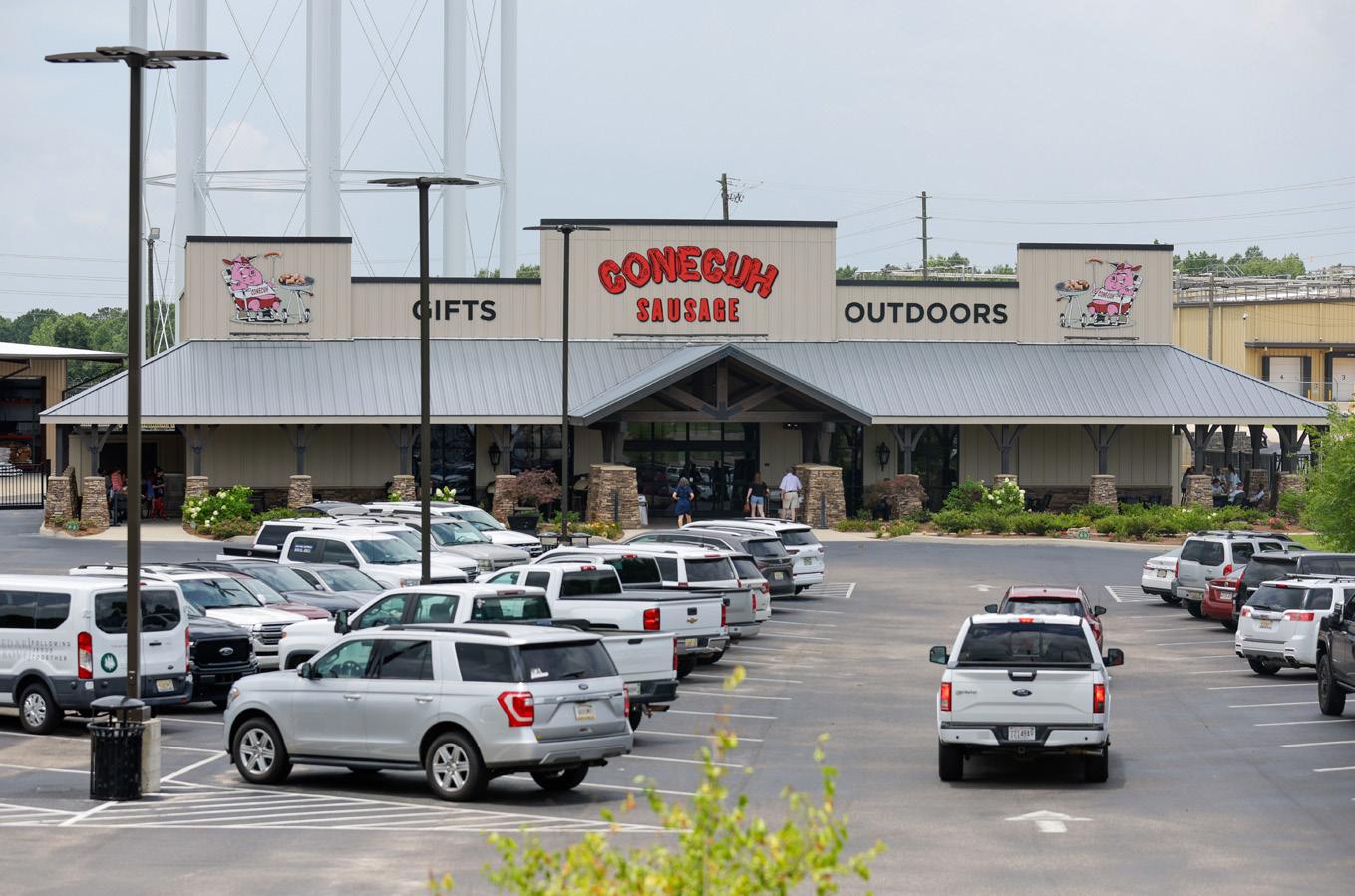
jobs it will generate will have on our community in the coming years. Many people worked very hard to put this project together, and we are appreciative of their efforts.”
The new facility, built on two-and-a-half acres of concrete, is designed for efficiency and food safety. Sausage enters one end and

exits the other, reducing the risk of cross-contamination — a USDA priority. The layout also doubles the company’s output capacity.
Despite the new address, the heart of Conecuh Sausage remains unchanged.
“The recipe’s the same. The seasoning supplier is the same. We taste almost every batch ourselves to make sure it meets our approval,” Sessions says.
The sausage lineup — ranging from hickory-smoked original to Cajun, hot and spicy, cracked black pepper and seasonal varieties — will all continue to be made to the same high standard.
Even the gift shop in Evergreen, which attracts around 300 visitors a day, will stay open. There, visitors can buy sausage, jellies and T-shirts, as well as hot sausage from the rotisserie grill.
The sausage hasn’t changed in 60 years, despite upgrades that have included switching to vacuum packing instead of overwrap.
“When we did that, some folks thought we’d changed the sausage,” Sessions says. “But the product has always been the same. High quality pork and seasoning — that’s what’s brought us to where we are today.”

Conecuh Sausage is distributed in 26 states and ships to every U.S. state but California. It’s also available internationally, on U.S. military bases from Germany to Japan.
When Sessions mentioned the move to Andalusia, some locals asked if he’d change the name to reflect the new location.
“I told them, ‘You’ve still got the Conecuh River over there,” he says. “You’ve got the Conecuh National Forest. And now you’ll have Conecuh Sausage, too.’”
That Alabama pride extends beyond sausage. The company supports local schools, parades, veterans and sports teams in both Evergreen and Andalusia. And once the Andalusia plant is fully operational, Sessions says they plan to get even more involved.
“They’re redoing a motel there now — used to be a bank — and the town’s growing fast,” he says. “We’re excited to be part of that.”
Sessions says he’s excited to see Conecuh Sausage grow along with its new hometown.
Sausage is the core product, but the company also sells hams and turkeys seasonally, and more innovations may be on the horizon once the Andalusia facility is up and running.
“You’ve got to keep growing,” Sessions says. “If you’re not growing, you’re going backward.”
The company’s mascot — a pig sculpture — will make the move to Andalusia, and it will be standing proud once the new plant opens in June. Sessions, too, plans to move from Evergreen to Andalusia.
And he’ll still be making, and eating, his family’s sausage, sometimes grilling it with sauce or mustard, sometimes with white bread.
“I never get tired of it,” he says.
Alec Harvey is executive editor of Business Alabama, working from the Birmingham office. Stew Milne is an Auburn-based freelance contributor.


State leaders showcase business advantages and forge international ties at LIGNA 2025 in Germany
By JENNIFER G. WLLIAMS — Photos Courtesy of LIGNA by Rainer Jensen
In a powerful display of collaboration and economic ambition, a delegation from Alabama recently traveled to Germany to participate in LIGNA, a world-leading trade fair for the woodworking and forestry industry. Held in Hanover every two years, LIGNA draws thousands of exhibitors and visitors from across the globe.
This year, Alabama stood out as the only U.S. state with a dedicated presence, highlighting the state’s growing reputation as a global player in the forestry and manufacturing sectors.
Representatives from the state attended the last show two years ago after a decades-long absence. That outing was successful enough for the state to return this year with a “Dream Team” of sorts, representing a cross-section of public and private interests. Members of the Alabama Department of Commerce, Alabama Forestry Commission, Alabama Industrial Development Training (AIDT), and even representatives from the state’s utilities sector came together to promote Alabama’s strategic advantages.
Their goal was twofold: to forge new
international business connections and to demonstrate why Alabama is, increasingly, the place to do business.
BRINGING ALABAMA TO THE GLOBAL MARKETPLACE
“European business is very important to the state and its business environment,” says Nick Shaver, business development specialist with the Alabama Department of Commerce. “We are here to not only deepen our relationships with companies that already do business in the state, but also to identify and engage with new prospects that would be strategically positioned for success in our state.”
The primary targets for connections at LIGNA are in the forestry industry, says Shaver, since that is a large part of the state’s strategic plan. “It’s a legacy industry … one in which we think we can continue to be successful. Even though we’re cutting down a lot of trees, we have the availability of resources that these companies will need to be successful in our state.”
Alabama has more than 23 million acres of timberland, 93% of it private-
ly owned, says Al Jones, senior forest economic development representative with the Alabama Forestry Commission. And even with the current $36 billion annual forestry industry, the state’s forests still grow an average of 2.5% a year — an advantage that other states simply can’t compete with, he adds.
The state has long been an attractive destination for wood product manufacturers, but recent years have seen a surge in interest from international firms looking for stable, business-friendly environments in the United States — and Alabama is making sure it stays top-ofmind.
And while the forestry industry is primarily being targeted at LIGNA, other industries are taking notice of the state, as well, says Shaver. “It’s been interesting here with the technology and advanced manufacturing companies we’ve spoken with. ... It presents some unique economic development opportunities for us as a state.”
What set Alabama apart at LIGNA was not just the quality of its pitch, but the strength of its collaboration. The booth served as a hub where economic developers, trade specialists and utilities experts worked in tandem to answer questions, share materials and engage in targeted outreach.
“The great thing is, everybody wants to be here; everybody thinks this is a great idea; everybody thinks that working together as a team, we’re going to make more progress,” says Jones.
Questions asked at the show ranged from “What type of trees do you have?” and “What type of workforce is available?” to “What type of sites are available?” and “What do the shipping logistics look like in the state?”
“What we’re looking to do is create interest in Alabama that encourages future investment in our state,” says Joel Watts, senior project manager in economic development with Alabama Power. “Bring new jobs, bring new industry to the state that’s going to help the overall good of the state of Alabama.”
“Driving economic development to bring new jobs and investment to the state, ultimately elevating the lives of Alabamians, is our ultimate goal,” he says. “And for this industry sector in particular, it’s opportunity that we can bring throughout Alabama, but even more particularly in rural Alabama.”
Vince Perez, director of economic development for Southeast Gas, says many visitors were intrigued by the low cost of utilities available in the state. “Compared to what they may be paying here in Europe, it is a really positive selling point.”
Alabama Industrial Development Training (AIDT), the state’s workforce development agency, plays a key role in promoting Alabama’s workforce training capabilities. Known for its customized, industry-specific training programs, AIDT helps reassure European manufacturers that Alabama not only has the resources and infrastructure, but also the talent pipeline necessary to support growth.
“Every vision for economic development must be backed by a strong workforce,” says Bobby Jon Drinkard, AIDT assistant director. “Because here’s the thing: Incentives will run out. That good deal you got that only lasts for 10 years, it’s going to run out. But what will be sustainable and what will make a company proud? A well-trained and sustainable workforce. And we have it here in Alabama.”
“We let these companies know that if they come to Alabama, they will get support from AIDT through recruitment, assessments and training — at no cost to them. That’s a powerful benefit.”
All of this, combined with the state’s strategic location, access to rail and river transportation and the Port of Mobile, selling the state to international companies has proven to be easier than one might think.
“There have been plenty of times where

Held in Hanover, Germany, every two years, LIGNA draws thousands of exhibitors and visitors from across the globe.
This year’s 50th anniversary fair, held May 26-30, welcomed nearly 80,000 visitors from 156 countries to visit more than 1,400 exhibitors in the forestry, sawmilling, production, manufacturing or related craft industries.
“What makes LIGNA unique worldwide is its role as an international marketplace for the woodworking and wood processing industry,” said Dr. Jochen Köckler, CEO at Deutsche Messe AG, the show’s organizer. “This is where global supply meets international demand. With 56% of visitors coming from abroad, LIGNA clearly demonstrates that it is the undisputed world’s leading trade fair for the industry and enables global business at the highest level.”
The largest groups of international visitors came from Poland, Italy and Austria, followed by the Netherlands, France and Belgium.
we kind of went into a meeting thinking we would have to sell the state and the people we are speaking with are like, ‘No, no, we know about Alabama,’ so whether it’s short-term or long-term there’s definitely interest there,” says Shaver.
While the team’s presence in Germany was focused primarily on international outreach to those in the forestry industry, the implications are deeply local. New business relationships formed at LIGNA have the potential to drive job creation, support rural communities and strengthen supply chains across Alabama in various industries.
“Our single goal here is to make sure Alabama is visible and that the value proposition is presented to companies, from sawmills to equipment manufacturing,” says Thomas Tyson, PowerSouth Energy Cooperative’s economic development representative. “We’ve had good conversations with several companies and people from different countries, making those connections and selling Alabama to people that may not be familiar with us.”
“Because with everything going on — with tariffs and everything — a lot of companies are kind of rethinking and
saying maybe we should have a presence in the United States,” he adds. “The unknown is what’s scary, but we feel the timing is right. We want to have these conversations now so that Alabama is on their minds when they are looking to expand.”
To that end, Alabama employs a “secret weapon” in Christoph Doerr, European office director for the Alabama Department of Commerce. “Christoph lives in Stuttgart, Germany, and helps not only with the communication side of things, but also with telling European businesses about doing business in Alabama,” explains Shaver. “He was CEO of a European company operating in Alabama and can speak from firsthand experience about the benefits of locating in our state.”
Alabama’s proactive international engagement strategy is part of a broader push to attract high-quality, long-term investments in industries that align with its natural assets and workforce strengths. By positioning itself on the global stage, the state is making clear that it’s not just open for business — it’s ready for the future.
Jennifer G. Williams is a Hartselle-based freelance contributor to Business Alabama.

by EMMETT BURNETT

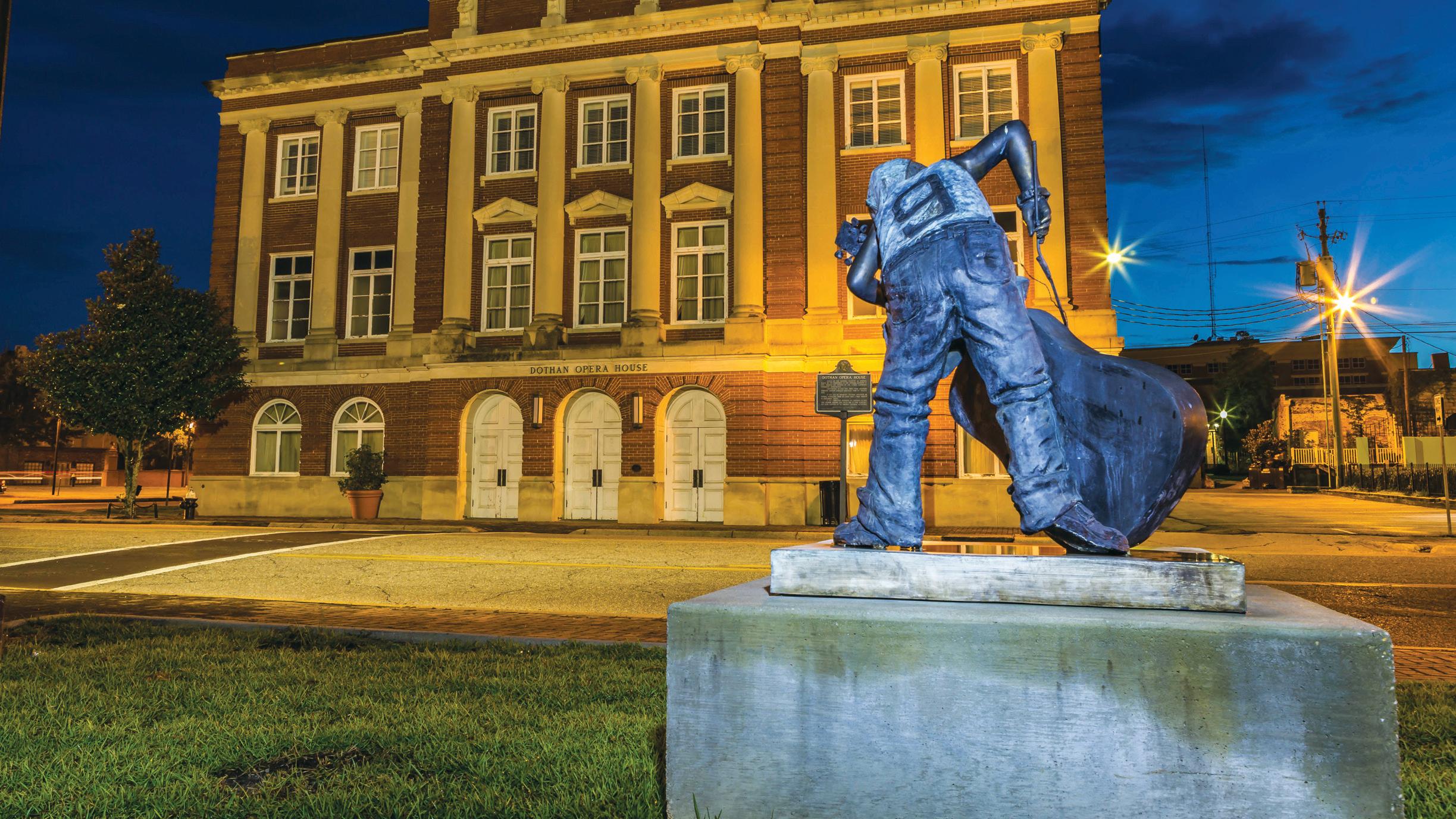
In Alabama’s Southeast corner a plant grows, thrives and resembles a fern made of wire, hence the name, Wiregrass Region. Two counties exemplify the Wiregrass. Like the namesake plant, Houston and Henry counties also thrive with growth.
The July 2024 U.S. Census data show Henry County with 18,141 residents, an estimated 1,000 increase since 2010. Henry County experienced a population increase seven out of the 12 years between 2010 and year 2022.
In addition, Houston County’s estimated population as of July 2024 is 109,366, a population increase of approximately 8,000 since 2010.
In March 2024, the city of Dothan’s Industrial Development Board worked with Dothan, the state of Alabama and Houston County to obtain a 446-acre industrial site for potential manufacturers and industry — the Westgate Super Site.
“Dothan has one of the premier business climates in the Southeast,” Mayor Mark Saliba said about the site in a February 2024 announcement. “I am confident that our investments from the city and county in the Westgate Super Site will serve as the missing ingredient needed to attract the world’s most innovative companies, fostering the creation of future-oriented, high-paying job opportunities for our residents.”
In May 2024, the city of Dothan broke ground on the Wiregrass Innovation Center. The $30 million facility will be a space for hands-on training, learning and engagement of agtech innovation in the world of science, genomics and research. It is also part of Dothan’s downtown revitalization project.

Under the Oaks on the Square in Headland is an annual concert series that occurs on the third Friday in April, May and June. Photo courtesy of Adriene Landry Wilkins/ Headland Area Chamber of Commerce.
Houston County is a focal point for the region’s medical needs, and health care is the largest employer in the county. Two major medical facilities, Flowers Hospital and Southeast Health, employ thousands of medical professionals covering a vast array of services, including trauma, surgeries, robotics and cardiovascular care.
Other industry giants of Houston County include steel production, distribution and logistics, aviation and aerospace, and food processing.
In addition, Henry County’s agriculture and forestry sectors include Abbeville’s Great Southern Wood Preserving, maker of the well-known YellaWood. Wood products are milled and shipped to locations throughout the South and beyond.
The Wiregrass is peanut country. Out of all Alabama counties in 2023, Houston County ranked first in peanut production with more than 89 million pounds. The 34,000 acres harvested by the county’s producers averaged 2,636 pounds per acre.
Wallace Community College-Dothan celebrated its 75th anniversary in 2024. The college’s offerings include career technical programs and health related fields. The school also is adding new sports to its athletics’ program, including men’s and women’s
Madison County: $83,528
Baldwin County: $75,019
Jefferson County: $64,589
Henry County: $60,135
Montgomery County: $58,153
Mobile County: $58,119
Houston County: $57,731
Dale County: $53,955
Geneva County: $50,951
Barbour County: $44,290
Source: U.S. Census Bureau
golf, men’s and women’s cross country and women’s flag football, joining baseball and softball in the fall of 2025.
THE
Dothan is home to Westgate Park, one of the largest parks of its kind in the Southeast. At Westgate Park, the public can swim at two indoor pools, play tennis at the 20-court Westgate Tennis Center, utilize the walking and bike trails, play softball, baseball, soccer, basketball, football, use an indoor weight room and an outdoor fitness court, participate in BMX, and play on two playgrounds and many other features.
POPULATION Total Alabama Population: 5,157,699
Jefferson County: 664,744
Madison County: 423,355
Mobile County: 412,339
Baldwin County: 261,608
Montgomery County: 225,894
Houston County: 109,366
Dale County: 50,067
Geneva County: 27,259
Barbour County: 24,358
Henry County: 18,141
In Henry County’s Headland, the outdoor Under the Oaks event features live music, food trucks and entertainment in a friendly community setting. “Over the years, Under the Oaks has really evolved into something special for Headland,” says Adrienne Wilkins, executive director of the Headland Area Chamber of Commerce. “It’s more than just a concert series — it’s a reflection of who we are as a community. People look forward to it each year, and we’re proud to see how it continues to grow and bring people together.”
Emmett Burnett is a Satsuma-based freelance contributor to Business Alabama



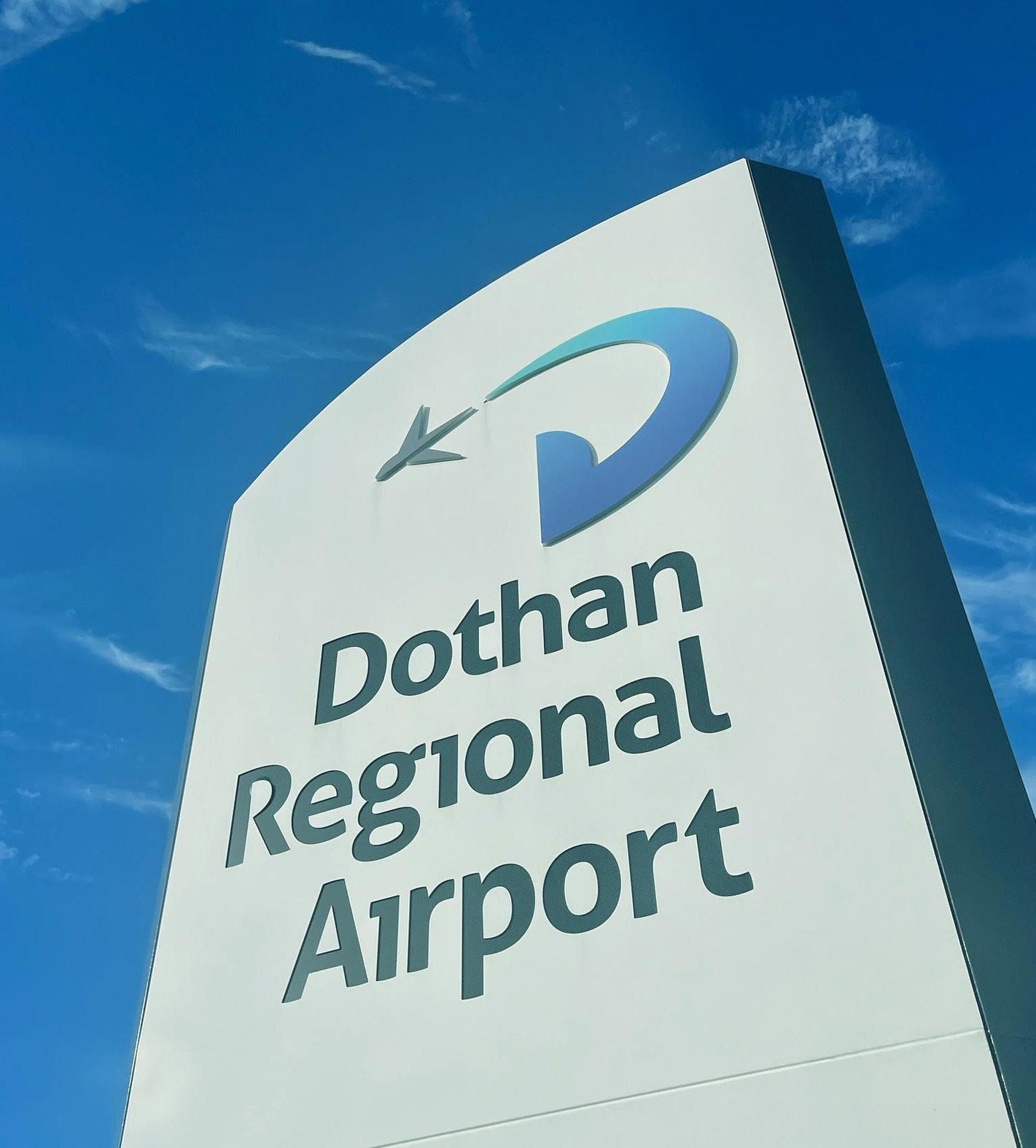
HEALTH CARE: LIFELINE OF THE REGION
Houston County’s health care industry is not only Dothan’s largest employer but a regional hub for medical services in southeastern Alabama, southwest Georgia and the Florida Panhandle. Anchored by major institutions such as Southeast Health, Flowers Hospital and the Ala-
bama College of Osteopathic Medicine (ACOM), the health care sector contributes significantly to both employment and economic output in the region.
Southeast Health alone employs thousands of professionals and serves hundreds of thousands of patients annually. Its comprehensive services — including a regional trauma center, advanced cardiovascular
MAY 2025: National tech repair retailer uBreakiFix by Asurion has opened in Dothan.
JUNE 2024: Peak Renewables opens its $30 million pellet manufacturing facility with 25 workers.
Including education
HOUSTON COUNTY: 14.5 mills
HENRY COUNTY: 18.5 mills
STATE OF ALABAMA: 6.5 mills
HOUSTON COUNTY:1%
Cities within the county: Cottonwood: 3%
Cowarts: 2%
Dothan: 4%
Kinsey: 4%
Rehobeth: 4%
Webb: 3%
HENRY COUNTY
Cities within the county: Abbeville: 3%
Headland: 3%
STATE OF ALABAMA: 4%
Source: Alabama Department of Revenue
care and a robust cancer center — draw patients from a tri-state area. Meanwhile, ACOM contributes to the training and retention of medical professionals, ensuring a sustainable pipeline of talent and innovation within the region.
Health care also fosters numerous auxiliary industries, including pharmaceuticals, medical equipment suppliers and health IT services, creating ripple effects throughout the local economy.
MAY 2024: Dothan Area Chamber of Commerce partners with the Economic Development Partnership of Alabama and Innovate Alabama in Fuel Alabama, aiming to attract and retain college interns.
APRIL 2024: Southern Roots Nut Co. announced plans for a pecan processing and distribution center in Sam Houston Industrial Park, a $17 million investment creating 120 jobs.
MARCH 2024: Dothan’s Industrial Development Board, with support from the state of Alabama, city of Dothan and Houston County, acquires a 446-acre industrial site with the Alabama SEEDs program.
FEBRUARY 2024: Dothan’s Industrial Development Board breaks ground on an 86acre industrial park at Napier Field Road. The project is a
partnership among the board, the city, Houston County, Alabama Power Co. and the Dothan Area Chamber of Commerce.
JULY 2023: Construction is completed on a 100,000-squarefoot speculative building at Sam Houston Industrial Park.
JANUARY 2024: Wiregrass Electric Cooperative and
Houston County’s steel industry plays a vital role in the local economy. Home to several steel-processing and fabrication companies, the city has become a niche center for steel production and transformation. Companies like Qualico Steel, Covenant Steel, APEC Metals, Dothan Steel, Sabel Steel and many more companies provide specialized products for a wide range of applications including construction and industrial manufacturing.
This sector benefits from Dothan’s proximity to raw materials, rail infrastructure and regional highways, enabling efficient distribution and supply chain integration. Steel’s importance to other regional industries, such as aerospace and construction, makes it a backbone of the industrial landscape in Houston County.
DISTRIBUTION: LOGISTICS
Thanks to its strategic location near the crossroads of U.S. Highways 231, 431 and 84, Houston County has emerged as a logistics and distribution hub for the Southeast. Distribution centers in Dothan serve retailers, food and beverage companies and industrial suppliers.
Notably, Dothan’s infrastructure includes an efficient rail system and the Dothan Regional Airport, enhancing its appeal for companies looking for multi-modal logistics solutions. The city’s industrial parks house warehouses and logistics providers that benefit from low operational costs and quick access to major markets like Atlanta, Birmingham and the Gulf Coast.
The growing demand for e-commerce fulfillment and last-mile delivery is expected to further boost this sector, driving continued investment in distribution facilities and supply chain services.
Major distribution companies in the Houston County market are AAA Cooper Transportation, McLane Trucking, Dothan Warehouse, AMX Trucking, Summerford Trucking and others.
The Dothan Regional Airport provides fast and reliable service to Atlanta via Delta multiple times per day. The Dothan and Houston County region has carved out a growing niche in aviation and defense-related services. A key player in this sector is Commercial Jet Services, which operates a large maintenance, repair and overhaul facility at the Dothan Regional Airport. The facility provides aircraft maintenance for commercial airlines and military contracts, employing skilled technicians and engineers.
CAE USA also calls the Dothan Regional Airport home. CAE USA provides live, virtual and constructive training to the U.S. Army, Navy and Air Force, plus many other customers. This facility provides fixed- and rotary-wing training for more than 800 military pilots annually.
In addition, Fort Novosel (formerly Fort Rucker), located nearby, is a major training base for U.S. Army aviation. While technically outside Dothan’s city limits, its economic impact on the region is significant, generating business for aviation parts suppliers, training contractors and simulation technology companies.
Dothan’s technical colleges and workforce development programs also are instrumental in preparing the labor force for careers in aerospace and advanced manufacturing.
FOOD PROCESSING: FEEDING THE REGION AND BEYOND
Houston County’s agricultural roots have evolved into a thriving food processing industry that leverages local produce and livestock to supply national and international markets. Often referred to as the “Peanut Capital of the World,” Houston County is surrounded by vast peanut fields and is home to multiple processing facilities that convert raw peanuts into consumer products.
Major players include Golden Peanut and Tree Nuts and Southern Ag Carriers, which process, package and ship peanuts and other agricultural commodities across the globe. In addition to peanuts, Dothan supports poultry processing, dairy product manufacturing and frozen food packaging. These operations not only sustain local farmers but also provide critical employment opportunities in plant operations, logistics and quality control.
With rising global demand for food exports and increased automation, Dothan’s food processing industry is poised for further growth, especially as companies look for cost-effective and strategically located production centers.
Forestry is another longstanding industry in the Wiregrass region, and Houston County plays a central role in processing
Engineered Systems Inc. were recognized by the Business Council of Alabama and Chamber of Commerce Association of Alabama as the small business of the year.
SEPTEMBER 2023: Grow Dothan, a public-private partnership for economic development at the Dothan Area Chamber of Commerce, celebrates 30 years.
AUGUST 2023: Wiregrass legislators announced funding for $20 million for the new Wiregrass Innovation Center. The facility will be built in downtown Dothan in a partnership with the city, HudsonAlpha Institute for Biotechnology and the Wiregrass Foundation.
MARCH 2025: Oldcastle APG opens a 14,000-square-foot wood mulch bagging facility in Abbeville, a $5.4 million investment creating 20 jobs.
DECEMBER 2024: Abbeville Municipal Airport celebrates completion of a $10 million project to extend the runway by more than 5,000 feet.
2024: Five existing industries in Henry County invested $11.4 million in expanding and improving their facilities: Greenbush Wood Products, Abbeville Fiber, Headland Wood Products, Red Star Yeast and Alabama Crop Improvement Association.
and distributing wood and timber-based products. Surrounded by pine forests, the area supports a range of operations from sawmills to furniture manufacturers.
Houston County is home to businesses that produce various wood products, such as SmartLam, Peak Renewables, Summerford Pallet and many more, which are
shipped across the United States and the globe. These manufacturers benefit from local timber resources, skilled labor and efficient transportation networks.
Environmental sustainability is becoming a focal point for the industry, with many companies investing in reforestation, renewable energy integration and

green building materials. These developments help ensure the long-term viability and economic impact of the forestry sector in and around Houston County.
Dothan’s general manufacturing sector is a diverse and dynamic part of the local economy, encompassing everything from plastics to electronics and fabricated metal products. This diversity provides a cushion against economic downturns in any single industry and supports a broad employment base.
Companies such as Michelin North America, Dunbarton Corp., Key Fire Hose Corp., Matex Hose, U.S. Coupling & Accessories, ID Associates, Globe Motors (now a division of Allied Motion) and many more have operations in or near Dothan, producing high-value components for domestic and international markets.
Workforce training programs tailored to manufacturing skills — like CNC machining, robotics and industrial maintenance — ensure a steady supply of qualified labor. These initiatives position Dothan and Houston County as a competitive location for both existing manufacturers and new industrial investments. Most recently, Southern Roots Nut Co. now calls Dothan home, where they process, store and distribute pecans.
Agriculture and forestry are Henry County’s main economic engines. Abbeville is home to Great Southern Wood Preserving, makers of YellaWood. Combined with its sister company, Greenbush Logistics Inc., the operation has approximately 1,200 employees in 16 locations.
In addition, Abbeville’s TriDelta Systems is the second-largest industrial employer in Henry County. TriDelta is a multi-faceted systems automation, engineering, industrial design manufacturing and technology company.
Golden Peanut, in Headland, offers a full line of premium wholesale peanut products, including raw peanuts, peanut oil, peanut flour or hull and fiber.
HENRY COUNTY
GREAT SOUTHERN WOOD PRESERVING | ABBEVILLE
Treated lumber, YellaWood 247 employees
TRIDELTA SYSTEMS | ABBEVILLE Industrial Systems • 125 employees
ABBEVILLE FIBER | ABBEVILLE Sawmill • 102 employees
GOLDEN PEANUT & TREE NUT HEADLAND
Shelled peanuts and seed peanuts 99 employees
PCI TECHNOLOGIES | HEADLAND
Information and communication technology • 50 employees
RED STAR YEAST | HEADLAND Baker’s yeast • 47 employees
HOUSTON COUNTY
WAYNE FARMS LLC | DOTHAN Chicken processing • 1,020 employees
SOUTHERN NUCLEAR
OPERATIONS CO. | DOTHAN Electricity generation • 950 employees
MICHELIN NORTH
AMERICA INC. | DOTHAN Tire production • 550 employees
MCLANE CO. INC. | DOTHAN
Distribution/Logistics/Transportation 500 employees
AAA COOPER
TRANSPORTATION | DOTHAN Distribution/Logistics/Transportation 375 employees
TWITCHELL CORP. | DOTHAN Manufacturing/Production/Wholesale 350 employees
DSI SECURITY SERVICES Security • 310 Employees
COMFORT SYSTEMS USA
SOUTHEAST | DOTHAN Heating and cooling • 260 employees
Sources: Local economic development officials


Health is a not-
Flowers Hospital has served health care needs of the Wiregrass for more than 70 years.
The complex provided care to thousands of area residents in 2024, with more than 400,000 patient encounters across its network of physician clinics and other outpatient sites.
In addition, the health system helps those in need, supporting charitable organizations and contributing to the area economy. In its most recent Community Benefit Report, Flowers Hospital’s impact was estimated at $261 million in 2024.
Also in 2024, the hospital celebrated the milestone of performing 10,000 robotic-assisted surgeries. Since 2008, surgeons across multiple specialties have used robotic surgery systems at Flowers Hospital for a variety of urologic, gynecologic and general surgery procedures.

In May 2025, Flowers Hospital earned an “A” hospital safety grade from the Leapfrog Group, an independent national nonprofit watchdog focused on patient safety. Leapfrog assigns grades to general hospitals across the country based on more than 30 measures of errors, accidents, injuries and infections and also on the systems hospitals are using to prevent problems.
In January 2025, Flowers Hospital announced a leadership succession plan. Former Flowers Hospital CEO Jeff Brannon transitioned to a role focused on health care education and business, while Steve Gordon joined the hospital as CEO.
Southeast Health is a not-for-profit community health system, which opened in 1957 and serves southeast Alabama and patients
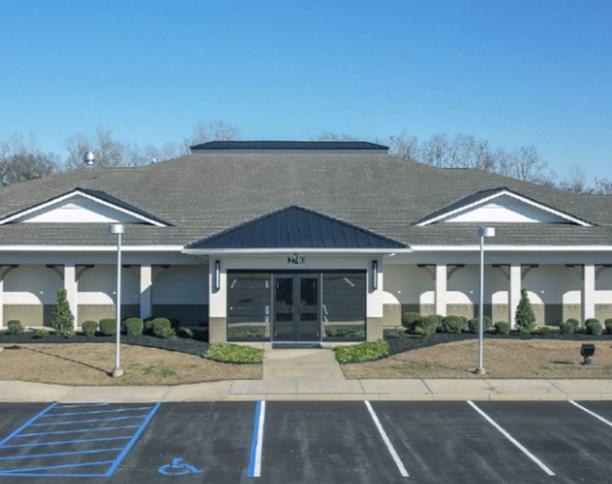
from southwest Georgia and the Florida Panhandle.
With 2,700 employees, Southeast Health is one of the region’s largest employers. The facility is supported by approximately 350 physicians covering an array of medical specialties.
Ninety percent of the hospital’s medical staff is board-certified. The national average is 60%.
Earlier this year, Southeast Health Medical Center, with 420 patient beds, earned an “A” in the Leapfrog Hospital Safety Grades.
NOLAND HOSPITAL DOTHAN
Set within the Southeast Health Medical Center, Noland Hospital Dothan specializes in complex cases such as respiratory failure, pneumonia, pneumothorax, emphysema, asthma, bronchitis, pleural effusions and more.
In addition, Noland offers treatments including respiratory therapists, nurses and other clinicians. Noland provides a goal-oriented, outcome-based, interdisciplinary approach to care.
LAUREL OAKS
BEHAVIORAL HEALTH CENTER
With 118 beds, Laurel Oaks Behavioral Health Center is a psychiatric hospital and residential treatment center for children and adolescents. The center’s treatment programs include crisis resolution, social skills and personal growth.
SPECTRACARE HEALTH SYSTEMS
SpectraCare Health Systems Inc., which opened in February, is part of the state’s Crisis System of Care, providing help for individuals in mental health or substance abuse crisis.
ENCOMPASS HEALTH REHABILITATION HOSPITAL OF DOTHAN
Encompass Health Rehabilitation Hospital of Dothan offers treatments for inpatient rehabilitation for stroke, brain injury, hip fracture and other complex neurological and orthopedic conditions. The hospital offers three hours of therapy, five days per week; 24/7 nursing care, including those who specialize in rehabilitation; and frequent visits with physicians.


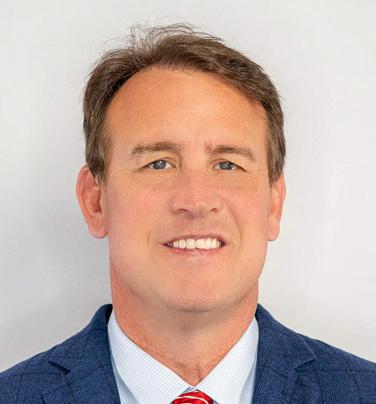
RYAN BLALOCK, a former mayor of Abbeville, has been in leadership roles with Great Southern Wood Preserving for more than 20 years, working in purchasing and in the international division. Now a senior vice president, he is still involved in purchasing but also in management of the firm’s sawmill business. Blalock is a graduate of Troy University with additional credentials from Harvard Business School. While mayor of Abbeville, from 2008 to 2012, he participated in the Alabama Leadership Initiative. He has served as chairman of the board for Abbeville Christian Academy.
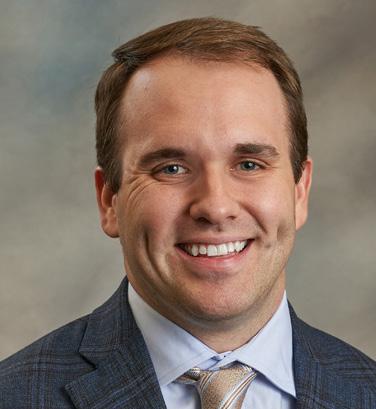
COLTON CURETON is vice president of economic development for the Dothan Area Chamber of Commerce. He also administers the Industrial Development Board of the city of Dothan, the Dothan Downtown Redevelopment Authority and the Industrial Development Authority of Houston, Henry, Geneva and Dale counties. A Dothan native, he holds bachelor’s and master’s degrees from Troy University and a doctorate from Liberty University. He is a member of the Economic Development Association of Alabama and serves on the Young Professional Committee for EDAA. He is active in Rotary Club and United Way.
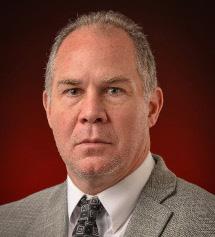
the University of Mississippi. He has been honored three times as outstanding faculty member. He serves on the advisory board of the Alabama College of Osteopathic Medicine and the Alabama Wiregrass Area Health Education Center and is active in Rotary International.
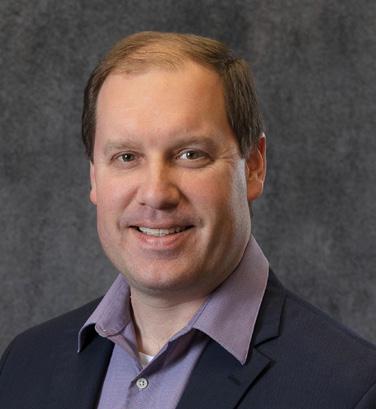
SCOTT FARMER is executive director of the Southeast Alabama Regional Planning and Development Commission, which works with economic development;
Head Start and other early childhood programs; public transportation; senior workforce; and other issues in the seven-county Wiregrass area. He holds bachelor’s and master’s degrees from the University of Alabama and is a member of the American Institute of Certified Planners and the Southeast Regional Directors Institute. He serves on the Main Street Alabama board and is active in the Dothan Area Chamber of Commerce.
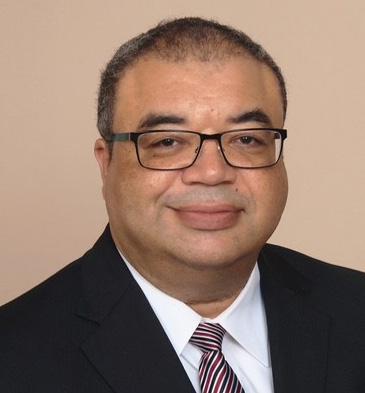
of Alabama. McFadden came to the job after a 40-year career in health-care management in the U.S. and abroad. A graduate of the University of Alabama, he has master’s degrees from the University of Memphis and the University of Alabama at Birmingham and a doctorate from UAB. A life fellow in the American College of Healthcare Executives, he serves on the board of the Health Leaders Alumni Association at UAB and is active with the Dothan Chamber, the Wiregrass Healthcare Alliance and the Alabama Rural Healthcare Association.

KIRK L. DAVIS is chief operating officer of Troy University’s Dothan campus where he also teaches. Davis earned bachelor’s and master’s degrees from Mississippi State University and a second master’s and doctorate from
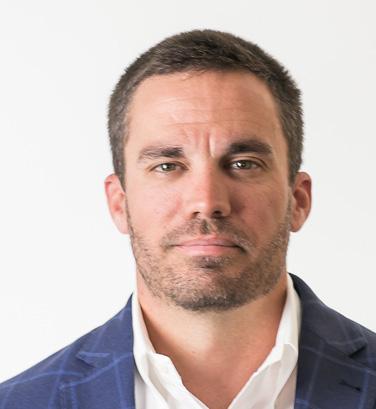
ADAM HARTZOG is executive director of Dothan Regional Airport, overseeing day-to-day operations, financial management, airfield
safety, tenant relations and economic development. A Prattville native and Auburn University graduate, he served multiple terms on the board of the Dothan Area Chamber of Commerce and the Southeast Alabama Regional Planning and Development Commission. Also, he volunteered on the capital steering committee for the Dothan City School Board. Hartzog is also a certified instrument-rated pilot.
IAN E. MCFADDEN is executive director for the Wiregrass Area Health Education Center, which recruits students into health programs in underserved areas
RANDALL S. MORRIS is the Dothan city manager. A civil engineering graduate of the University of Alabama, he has worked for the city of Dothan for 27 years, in the engineering, utilities and general services departments and later as assistant city manager before being named manager this year. Morris holds local government professional management certification and graduated from the University of Virginia’s Darden School of Business’ Leading, Educating, and Developing program.
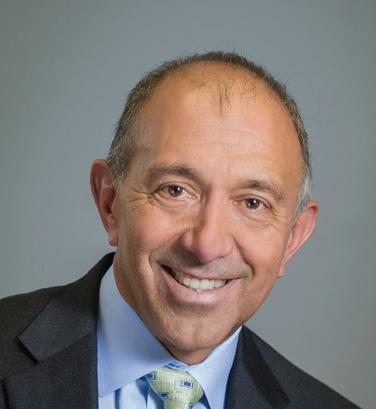
MARK SALIBA is mayor of Dothan. A University of Alabama graduate, Saliba joined his father’s construction business in Dothan in 1982 and has played a significant role in the Home Builders Association of Alabama, serving as local president in the early ‘90s, state president in 2006, and earning numerous awards, including inductions into both the Dothan/Wiregrass and Alabama Building Industry Halls of Fame. He currently chairs the Alabama Home
Builders Self Insurers Fund and works with the boards of Southeast Gas and Embrace Alabama Kids. He also recently completed a term as president of the Alabama League of Municipalities. He is active with the Dothan Chamber, Dothan Police Foundation, Houston Academy, Wiregrass United Way and the Alabama Kidney Foundation.
DANNY SHARP is a broker for Coldwell Banker Commercial

Alfred Saliba Realty, practicing for 50 years in southeast Alabama. Sharp graduated from the University of Alabama. A former chairman of the Dothan Area Chamber of Commerce and Grow Dothan, Sharp continues to serve as president of the Dothan Area Chamber Foundation. He is a graduate of Leadership Alabama and leads with a group promoting regionalism within southeast Alabama counties.
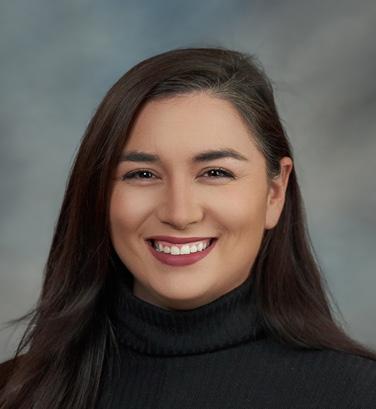
HANNAH SHIVER is executive director of Visit Dothan. A graduate of Troy University, she worked earlier in hospitality management, specializing in hotel operations and sales. She serves on the boards of the National Peanut Festival and the Dothan Area Chamber of Commerce, is president of the Dothan Area Young Professionals and is a member of the Alabama Travel Council’s state Young Professionals Committee.
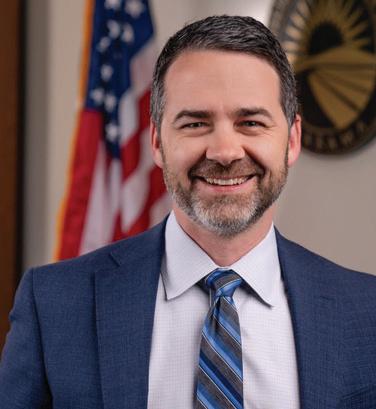
he serves on the boards of the Alabama School of Cyber Technology and Engineering, the Southern Alabama Regional Council on Aging and Wiregrass Pets.
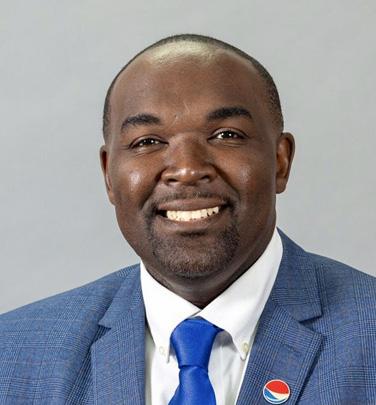
GEORGE STRINGER is the franchise general sales manager at Buffalo Rock in Dothan. Stringer is a graduate of Wallace Community College. He serves on the Cottonwood
Town Council, on the executive board of the Dothan Area Chamber of Commerce and the associate board of the National Peanut Festival. He is the 2025 recipient of Wallace Campus Alumnus of the Year Award.

MELINDA SYKES is the owner of Waxing the City studio of the Wiregrass Region and founder of the Franchise Studio in Dothan. She is a graduate of Kennesaw State University and holds a master’s from Troy University. Sykes is a board member of the Dothan Area Chamber of Commerce and is involved in the HudsonAlpha Wiregrass Navigate Program.
section. He has served on the boards of Dothan Area Young Professionals, the Alfred Saliba Family Services Center, Wiregrass United Way and is a graduate of Leadership Dothan and a member of the Dothan Rotary Club.

WHITNEY LANE WOODHAM is a wine professional. After working in Beaune, France, Woodham earned a master’s in wine making and wine marketing from the University of Dijon, followed with a law degree from the University of Vermont. In 2019, Woodham returned home to assist her mother in running the Headland Bottle Tree. She was recently recognized by the Headland Chamber of Commerce’s Woman of the Year in the 2025 program. She serves on the boards of the Southeast Health Foundation, Wiregrass United Way and the Headland Chamber of Commerce.
BRANDON SHOUPE is chairman of the Houston County Commission. He is also a partner in Adventureland Theme Park in Dothan. An Auburn University graduate,

DANIEL TEW is a principal and financial advisor with Jackson Thornton Wealth Management. With almost 15 years of advisor experience, he is a member of the American Institute of Certified Public Accountants and the Alabama Society of Certified Public Accountants, where he is past president of the Dothan chapter. A graduate of Auburn University with an MBA from Troy University, Tew is an associate member of the Associated General Contractors board and serves as vice chair of AGC-Dothan
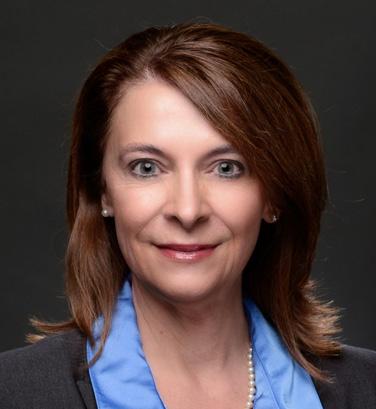
ASHLI HAMILTON WILKINS is vice president and dean of institutional services and community development at Wallace Community College-Dothan. She has bachelor’s and master’s degrees from Troy University and a doctorate from Auburn University. She has been recognized as an Aspen Presidential Fellow and has served as president of the Alabama Community College Association and commissioner for the American Association of Community Colleges’ Public Relations Advocacy and Advancement Committee. She also serves on the boards of the Dothan Area Chamber of Commerce, Wiregrass United Way, the Dothan Houston County Library System, the Wiregrass Alabama AHEC and Alfred Saliba Family Services Center, among others.

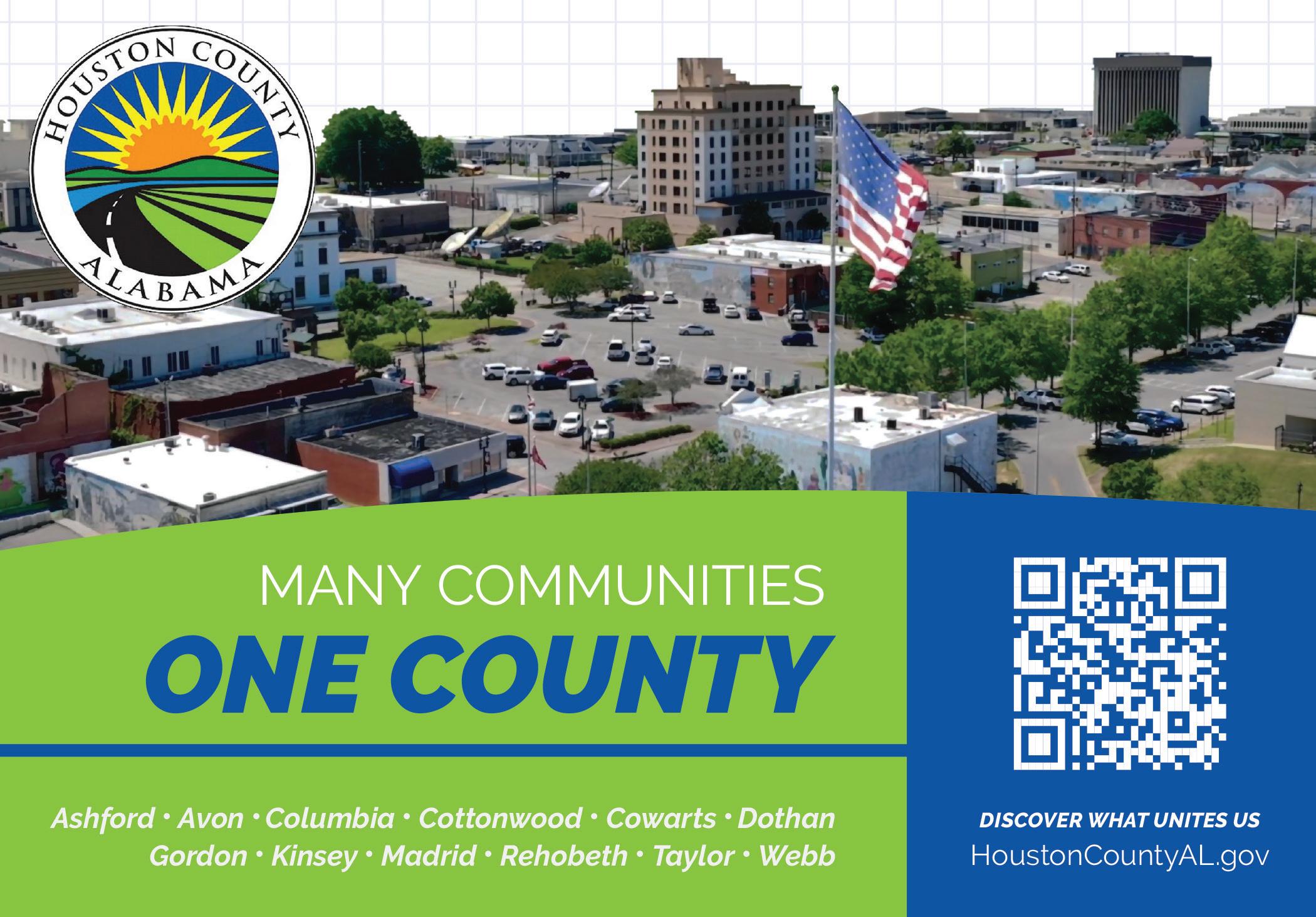
Wallace Community College-Dothan is a public institution offering academic, health and career technical programs, as well as adult education, workforce development and dual enrollment for high school students.
The college has two campuses — the Wallace campus in Dothan and the Sparks campus in Eufaula.
WCCD’s career technical programs include air conditioning and refrigeration, automotive technology, business technologies, child development, computer information sciences, cosmetology, court reporting, criminal justice, electrical technology, engineering graphics, esthetics, industrial systems technology and welding.
The college’s health-related programs include associate degree nursing, practical nursing, RN to BSN mobility, emergency medical services, medical assisting and phlebotomy, mental health technician, physical therapist assistant, radiologic technology, respiratory therapist and surgical technology.
The college celebrated its 75th anniversary in 2024.
Wallace is adding five new sports to its athletics program. Men’s and women’s golf, men’s and women’s cross country and women’s flag football will join baseball and softball in the fall of 2025.
In collaboration with Advantage Consulting & Solutions and the Alabama Community College System, Wallace announced the launch of the Alabama Cyber Security Fellowship Program, an initiative designed to provide students with real-world cybersecurity training and career development opportunities and will help address critical workforce needs in the cybersecurity field while creating educational pathways that ensure students are career-ready upon graduation.
An independent study on the Alabama Community College System conducted by Lightcast estimates that WCCD has a total economic impact of nearly $193 million annually on the Wiregrass service area and supports one out of every 48 jobs. Moreover, the study finds that the average associate degree WCCD graduate will see an increase of $8,200 in earnings

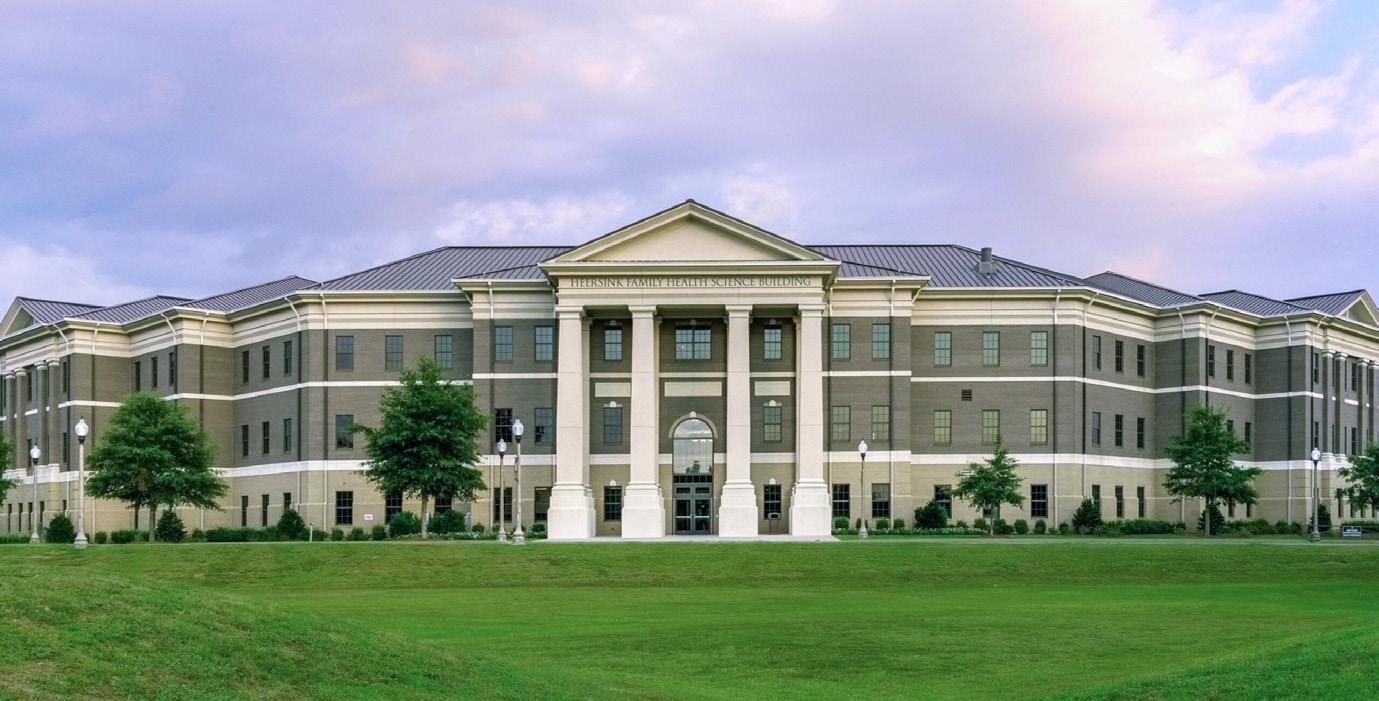
each year compared to someone with a high-school diploma working in Alabama. The study was based on FY 2023-24 data from ACCS colleges, the Bureau of Labor Statistics and the U.S. Census.
WCCD’s Adult Education department offers basic literacy instruction, GED preparation classes, a high school diploma option, college and career preparation,
English as a second language and academic support.
In addition, WCCD’s Workforce Development department prepares students for in-demand jobs with programs like CDL training and endorsements, certified medication assistant, certified nursing assistant, dental assistant, eye care assistant, fiber optics, food and beverage services,
We’re your neighbor, friend and Saturday little league buddy on the bleachers, cheering along with you. But most of all, we’re your trusted bank, and have been since 1912. This is our home too and like you, we’re proud of it. Come, find out what the friendliest, most helpful bank in town can do for your business
heavy equipment operator, industrial welding, pre-apprentice electrical lineworker and professional medical coding. In partnership with the Alabama Community College System’s Innovation Center, WCCD’s Workforce Development also offers free Skills for Success courses like carpentry helper, electrical helper, fiber optics technician and installer, skid steer, bulldozer, excavator, asphalt roller and mental health worker.
The Alabama College of Osteopathic Medicine opened in 2013. As of May 2025, the school has graduated 1,247 students. The class of 2025 has 100% residency placement. Based in Dothan, the institution’s graduates receive a Doctor of Osteopathic Medicine degree.
The school is a four-year, private institution licensed by the Alabama Department of Public Education and accredited through the American Osteopathic Association Commission on Osteopathic College Accreditation.
TROY UNIVERSITY’S DOTHAN CAMPUS Troy University in Dothan is dedicated to adult learners. A broad range of courses is customized for the needs of Alabama’s Wiregrass region. More than 200 degree options and 109 online programs are offered, and the student-faculty ratio is 15:1.
KINGDOM COLLEGE
Kingdom College is a Christian college dedicated to preparing and equipping students for works of service. Undergraduate and graduate courses are available in biblical studies, psychology and Christian clinical mental health counseling.
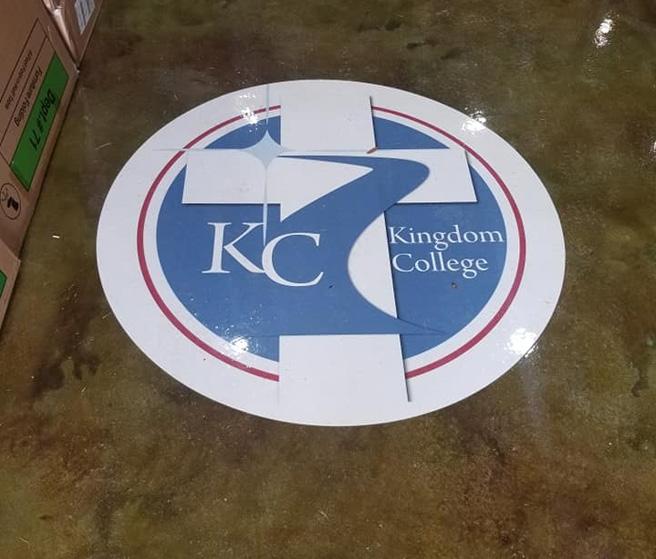

Right People. Right Place. Right Time. That’s Dothan’s new unofficial motto. Dothan has witnessed a convergence of these elements, all pushing the city toward a bright future. Here are some of the projects that are leading the way.
The City Center project has been years in the making. Cities typically develop around a core downtown area and many times experience declines, over time, in that same area. In recent years, southern cities have made efforts to revitalize their core areas, and Dothan is no different.
The vision for the City Center project was shared with the public on April 11, 2022, at the Dothan Civic Center. Hundreds of interested citizens came to learn about the plan to re-envision downtown Dothan. The gathered crowd cheered as the plan was revealed. Since that night, Dothan has been working toward making the vision a reality.
The ground was broken on the project on Jan. 16, 2024. The first phase of the City Center project is now coming to
a close. Phase I consists of a three-story addition to the historic Dothan Opera House along with the adjacent Porter Park and Events Plaza, which will serve as the gateway into the City Center.
The Opera House addition consists of 7,700 square feet of event space, additional restrooms, a warming kitchen for caterers and a large video wall to display images or presentations. The Opera House also has undergone major renovations, including new sound and lighting systems and upgraded stage amenities.
Another Phase I project within Dothan’s City Center is the Wiregrass Innovation Center, a 45,000-squarefoot structure that will be the home of HudsonAlpha Wiregrass, which is focusing its efforts on genomic research as it relates to agriculture and forestry. Co-located within the Innovation Center will be other startups from the world of agriculture technology. The structure also will house a business incubator where entrepreneurs can have access to the resources they will need to get a fledgling business off the ground.
Plans for Phase II of the City Center project already are underway. Phase II will include a new City Hall and an adjacent City Hall Annex. The new City Hall building will be more than 65,000 square feet and house the mayor, city commission, city manager and other departments including legal, finance, planning, city clerk and public works. City Hall also will house the city commission chambers, where all commission meetings will be held.
The City Hall Annex structure will be more than 20,000 square feet and will house the personnel and information technology departments.
WIREGRASS PETS RESCUE AND ADOPTION CENTER
While it’s not located in the city’s downtown area, Dothan is collaborating on a new, 22,000-square-foot facility to house local cats and dogs. Rachel Smith, executive director of the shelter, said, “Wiregrass Pets is a 501c3 nonprofit that was established for the sole reason to build a new animal shelter and to assume responsibility as the manager of the
animal shelter.”
When the new shelter opens, Wiregrass Pets will manage and operate the shelter and be in charge of all on-site animal care, animal placement through adoptions, fostering, transport and all humane education and community programming, including birthday parties, youth summer camps, movie nights, literacy programming, puppy and kitten yoga and foster and volunteer training and classes.
Not only is Dothan redeveloping its downtown area, but it is also recruiting and attracting new businesses to the area. Here are a few of the newly relocated businesses:
SmartLam, with operations in Dothan and in Montana, is the largest glulam manufacturing facility in the United States. SmartLam’s new $70 million facility has initially hired more than 60 people.
Peak Renewables uses wood residuals from neighboring sawmills and other wood product facilities to manufacture wood pellets, used as sources of energy for
The Wiregrass Public Safety Center campus provides space for training and recruiting for police, fire, emergency medical personnel and other first responders.
homes and businesses around the world. Peak has initially hired 27 employees and has invested more than $30 million in its local operation.
Southern Roots Nut Co. has relocated to Dothan and has invested $17 million in its local processing facility and hired 120 workers. The company will distribute, process and cold-store pecans.
Dothan has also developed two new industrial sites to accommodate future business.
Westgate Super Site, a 446-acre industrial site owned by Dothan’s industrial development board, is a collaboration between the city and county, with state funding. It has water, sewer, power, gas and a CSX Rail line.
Napier Field Industrial Park is a new, 86-acre industrial site with road, sewer and gas connectivity. Funds from the Dothan City Commission and Houston County Commission have been used, along with a Growing Alabama grant from the state, to make these infrastructure improvements.
Dothan has received a $7.75 million Housing and Urban Development Grant to construct a community center that will be located on the Wiregrass Public Safety Center’s campus. This facility will allow gatherings of more than 200 people for training purposes to support the mission of the safety center. This facility is one of only a few in the United States where citizens can learn and train along with public safety personnel for the good of the community.
The latest U.S. Census data shows Henry County as one of the fastest growing in Alabama. An AL.com report shows Henry County in the top 10 counties for growth in Alabama in 2024. Also, in 2024 the Abbeville Municipal Airport’s runway expansion was completed. The runway now stretches more than 5,000 feet, a significant difference from the previous 3,800-foot runway.

The Presbyterian Church inside Landmark Park is the only historical structure in the park that originated within an incorporated Wiregrass town.


ponds
Family fun is in the plans with visits to any of several Wiregrass destinations, like Adventureland Theme Park with its arcade, go-karts, bumper boats, batting cages and mini golf. Corndodgers Farm in Headland offers pony and wagon rides, a corn maze and other old-fashioned fun. Water World in Dothan features a water slide, 450,000-gallon Rip Tide Wave Pool, Twister Slides and Kids Cove.
The United States Army Aviation Museum at Fort Novosel displays a vast collection of military aircraft and artifacts. Each piece tells the evolution of Army Aviation from 1908 to the present.
Abbeville’s Methodist Church features “Soldier in the Window,” a stained-glass image of a World War I soldier holding his rifle while being watched over by an angel. Other historical finds include The
Cherry St. AME Church. Organized in 1877, it is the “Mother Church” of Alabama’s AME denomination. The E.R. Porter Hardware Museum commemorates a hardware store that was in business from 1889 to 2014. In addition, the Bethune/Kennedy House in Henry County was constructed by physician Calvin Bethune in 1870. The home is in the Alabama Register of Historic Places. In Abbeville, you can see the home where Rosa Parks grew up.
The Wiregrass Museum of Art showcases artists from throughout Alabama and the Southeast. The facility is housed in what was Dothan’s electric and water plant.
Dothan Area Botanical Gardens offers permanent and seasonal displays of flora and fauna throughout the year on 50 acres of gardens and paths. Also, while walking through Dothan, stride the 30-second journey across the World’s Smallest City Block. As mentioned in “Ripley’s Believe it or Not,” the diminutive parcel is 38 feet long and 27 feet wide. Murals of the Wiregrass displays Dothan’s significant citizens of local, state and national acclaim.

THE SHOW MUST GO ON
And it does, at the Dothan Civic Center and Opera House. Since 1975, the center has hosted top entertainment by performers from across the world. Other entertainment venues include the Southeast Dance Co. and The Uptown
UNDER THE OAKS
Now in its seventh year, Under the Oaks in Headland offers a mix of music, community connections and small-town charm.
The Joseph Monument and Memorial honors the Biblical origin of Dothan’s name, as read in Genesis 37:17. “For I heard them say, ‘Let us go to Dothan.’” Another statue of note is the replica of the Statue of Liberty in Abbeville.
PARKS TO PONDER
Landmark Park features the Wiregrass Region’s history with an 1890 farmstead that includes farm animals, a smokehouse, cane mill, general store and one-room
schoolhouse. Headland’s Tom Syrup Farm teaches the history of the family’s syrup business. The farm, worked and owned through seven generations, includes a general store and café.
LIBRARY FUN
In Abbeville, a library awaits, to teach young minds and lifelong learners. While exploring hands-on STEM learning, young and old alike peruse regional history and imagine bold futures.
PARKS TO PLAY IN
Eastgate Park is 200 acres featuring spacious grounds for picnics, flying kites, pickleball, a walking trail and children’s playground. Eastgate also hosts weddings, reunions, birthday parties and more. James Oates Park’s 87 acres feature two six-field baseball/softball complexes. Each field features AstroTurf infields. Rip Hewes Athletic Complex features a 10,000-seat football stadium. The stadium received a $14 million renovation in 2021. Other features include two softball fields and a high school/college basketball field. Westgate Park is Dothan’s largest recreation center. It features a community center, fivefield softball complex, four-field baseball complex, BMX track and numerous other facilities. The Doug Tew Therapeutic Recreation Center has been transformed with a $1 million renovation. The facility now houses programs and events for those with special needs.
Lake Eufaula abounds with some of the best fishing in Alabama. In Headland, Southern Cross Ranch embraces all things equestrian. The horse ranch offers riding lessons, training and boarding.
Ravenwood Sporting Clays offers skeet shooting on a 43-acre woodland course for beginners to experts.
The Wiregrass loves golf. A centerpiece for the little white ball is Highland Oaks The 36-hole complex features some of the longest and most classically designed holes on the Robert Trent Jones Trail. Other golfing greats include Roundabout Plantation Golf, Dothan National Golf Club and Hotel and Dothan Driving Range and Golf Shop. In addition, the five-star rated Headland Country Club offers golf, a pool and clubhouse.
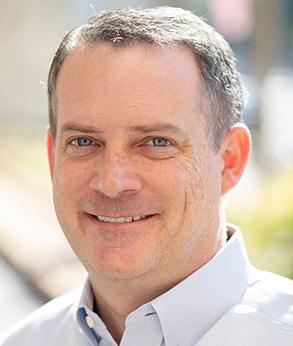

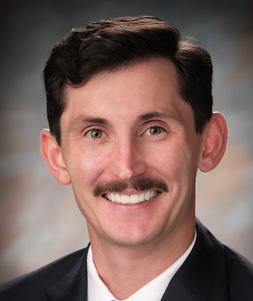
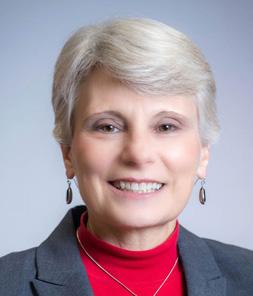
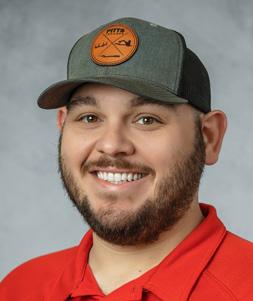
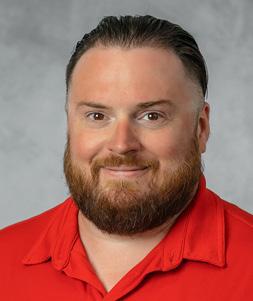

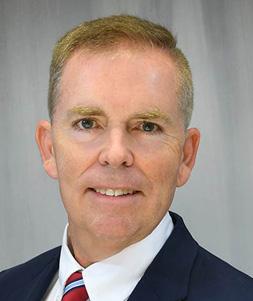

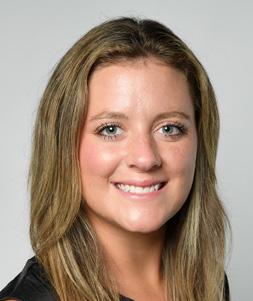
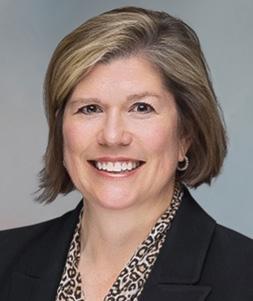
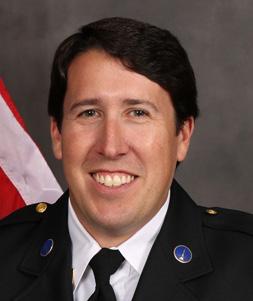
Jeff Windham has been named managing partner of Aldridge Borden in Montgomery.
Wilkins Miller LLC has added Taylor Boyington, Michael Hopkinson and Avery Johnston. The firm has offices in Mobile and Fairhope.
The U.S. Department of Agriculture has appointed Twinkle Cavanaugh as state director for USDA Rural Development and Monica Carroll to lead Alabama’s Farm Service Agency.
Rachel DeBose has joined the Alabama Sustainable Agriculture Network as manager of farmer programs.
United Community has named Jason Phillippe as president of its Alabama and Florida Panhandle markets. Phillippe succeeds David Nast, who has been promoted to chairman of the Alabama market.
Landon Woodall has joined Cadence Bank as president of its Montgomery market.
SmartBank has added Amanda Zirlott to its Mobile branch as a treasury management officer.
by ERICA JOINER WEST

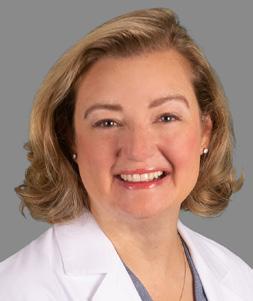
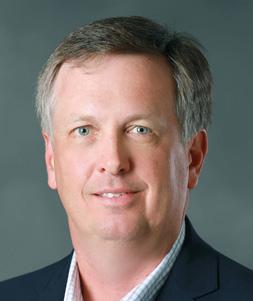
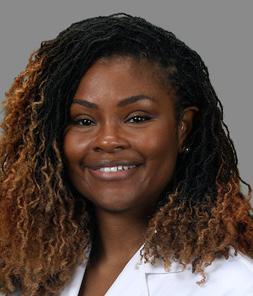
ServisFirst Bank has added Jacob Abbott as assistant vice president, commercial banking officer at its Huntsville location.
Mac Caddell, president and CEO of Caddell Construction, has been chosen as treasurer of Associated General Contractors of America
Kathy Murphy has been named president of Wallace Community College in Dothan. She previously served as president of Gadsden State Community College Alan Smith will serve as interim president at Gadsden State.
Paige Daniel has been chosen to head Highland Associates Inc., a subsidiary of Regions Financial Corp.
Chef Ben Rosen, of The Depot in Auburn, has won the Alabama Seafood Cook-Off. Rosen and his sous chef, Walker Hughes, will represent the state at the Great American Seafood Cook-off in New Orleans later this year.
Dr. Jennifer Pierce, a gynecologic oncologist at USA Health Mitchell Cancer Institute in Mobile, has been named Advocacy Champion by the Association for Clinical Oncology. In addition, USA Health Family Medicine has added Dr.
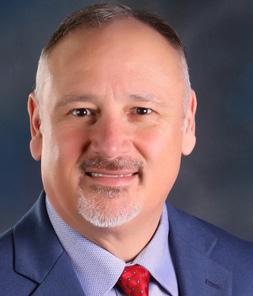

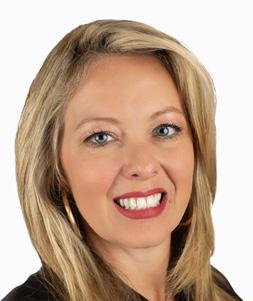
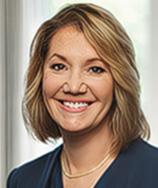
Alicia Evans. She will also serve as an assistant professor in the Frederick P. Whiddon College of Medicine.
Amie Vague has been chosen as Lightfoot, Franklin & White’s hiring partner. In addition, the firm has added Nicole Hardee to its Birmingham office.
Lee Bonner Friedman has joined Adams & Reese as government relations advisor and a member of the firm’s Intersection of Business & Government Practice Group. He will work out of the firm’s Mobile and Washington, D.C. offices.
Pitts Trailers has named Dustin Preslar as plant manager. In addition, the trailer manufacturer has promoted Brandon Fretwell to general manager.
The city of Tuscaloosa has appointed Richard Rush to lead its government relations, external affairs and crisis communication efforts. In addition, Mark Delk has been appointed chief of Tuscaloosa Fire Rescue.
Montgomery Mayor Steven Reed has received the 2025 D3 Leadership in Diversity Award from the National Urban League.
Daniel Dennis has joined REMAX as senior vice president of sales and service. Dennis previously worked with Roberts Brothers Inc. in Mobile for more than a decade.

By SCOTTY E. KIRKLAND
Fewer innovations did more to connect Alabamians to the broader world than the radio. By the 1920s, new perspectives and access to music, sports and educational programming were suddenly available.
Within two decades of the medium’s commercial availability, radio stations and their ubiquitous towers began to dot the Yellowhammer landscape. And yet during radio’s golden age, there was just one manufacturer of the devices in the entire state.
The man who made beautiful, early radios in Alabama was a Tennessean. Ernest W. House was born in Nashville in 1882. By 1900, he was living in Birmingham alongside his mother and grandmother. In 1921, he ran a typewriter repair business in a small shop in the Farley Building. At one point, he also worked as a stenographer for a local judge.
Although he lacked formal training as an engineer, radio technology captivated
House, and he was an early experimenter with the devices. His daughter Lenora recalled: “He got so enthused over the fact that you could pick up a signal over the air on a little thing like that, that he just started learning about it on his own.”
By 1923, Ernest and his wife, Alice, were hosting “radio parties,” piping in programs from stations in surrounding states, some of which originated from faraway places like New York and Cuba.

House and other early radio owners found fewer Alabamabased options. Alabama Power Co. launched the state’s first radio station, WSY, in 1922. Conceived as a means of communicating to far-flung employees, the station also broadcast news and entertainment programs in the evenings. When the station ceased operations in 1925, the
There were several different models of the Radio Products Corp.’s Superflex. Photos courtesy of the Alabama Historical Radio Society.
company donated its equipment to Alabama Polytechnic Institute (now Auburn University). The college used the equipment to help launch WAPI, relocating the station to Birmingham in 1928.
Early radios were difficult to tune. Most had a series of three or more dials that had to be carefully adjusted to locate stations. As he tinkered, House conceived a different solution to this conundrum: a basic regenerative electric circuit to manipulate the tuner. It took time.
“I remember the night Papa knew he had perfected the circuit,” his daughter remembered in 1990. “It was 3 o’clock in the morning.”
From that success in the small hours of the morning came Ernest House’s greatest contribution to the science of radio receivers. In 1925, he founded the Radio Products Corp. alongside Birmingham businessmen W. T. Estes and Jelk Cabiness. In August of that same year, he applied for a successful patent on his “radio receiving circuits.”
House named his new radio the “Superflex” and trumpeted its ease of use and clarity. “The ability of this wonderful circuit to let you listen to just ONE STATION at a time, even if another is as close as one half-mark away on the dial, will win your instant admiration,” read a company brochure. “Hear One – You’ll Buy It.”
With its hand-rubbed walnut finish and intricate gold detailing, the Superflex was a presentation piece. The company offered receivers in both tabletop and console models. Such artistry and innovation came at a price, however. Simpler models cost between $80 and $100. The larger console model that topped out at just over $210 would cost nearly $4,000 today.
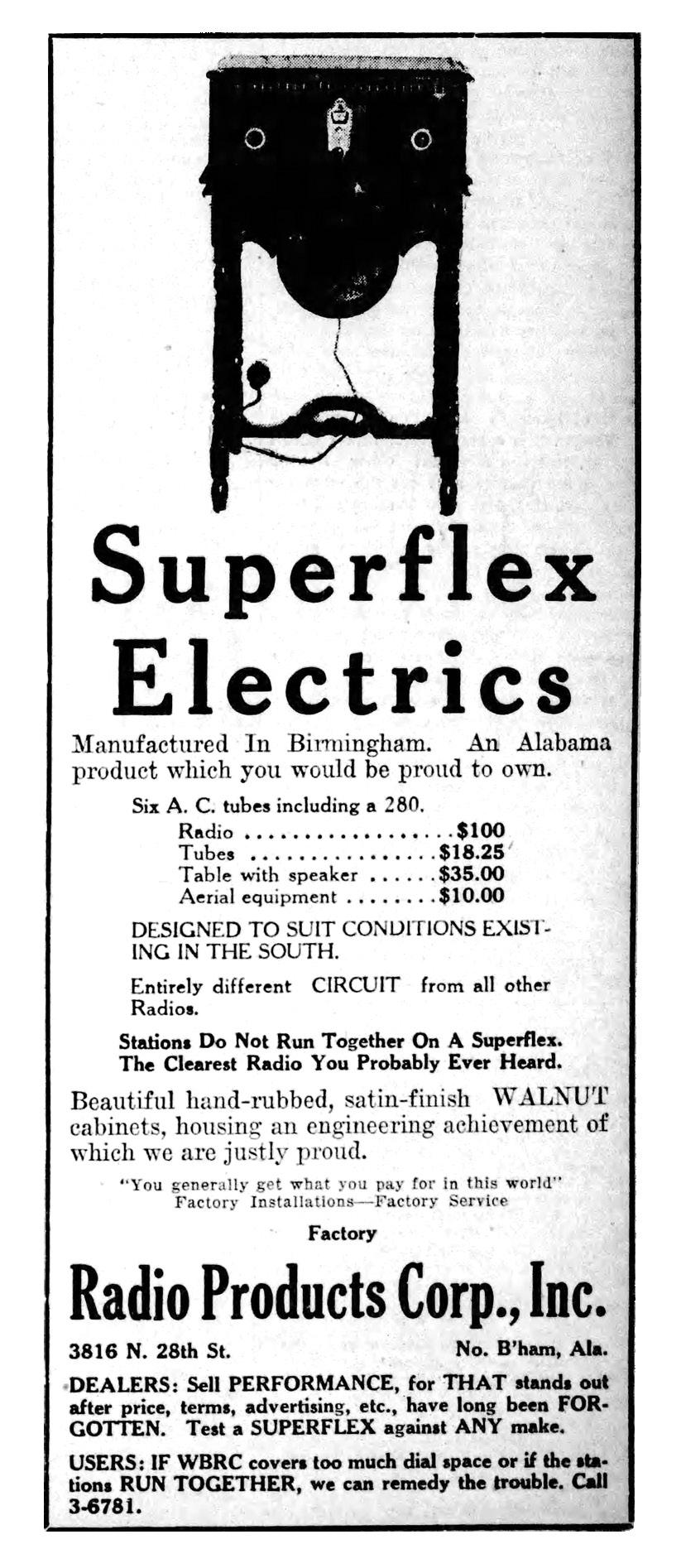
knocked Tunney to the mat but failed to quickly retreat to a neutral corner so the count could begin. Tunney rallied and won the fight — Dempsey’s last — by unanimous decision.
Two years later, the resourceful House tried to convince Alabama to put Superflex radios on a state contract. A few lines in Gov. Bibb Graves’ 1929 New Year’s message prompted the effort. Graves rightly discerned radio’s educational potential and was an early advocate for its expansion. “Radio has transformed the ether of the heavens into an agency of service to mankind,” he wrote, and called for the inclusion of radios in Alabama’s public buildings, especially its schools.
“We believe we might be in position to undertake this proposition as a factory, for our State,” House wrote to the governor. He further suggested that the Radio Products Corp., as the state’s only manufacturer, could also assist with installation and upkeep.
House’s proposition went unanswered. The governor’s lofty idea for radios in every classroom ran headlong into the cold, cash-strapped truth of the state’s financial situation. With the onset of the Great Depression just a few months later, even fewer radio enthusiasts could likely afford luxury items like the Superflex.
Work slowed at the plucky little factory along 28th Street North. As funds became scarce, its advertisements vanished from local newspapers and trade magazines. The Radio Products Corp. quietly faded away without fanfare. Ernest W. House remained in Birmingham for the rest of his life, working as a building contractor and tinkering with radios.
“Buy Performance,” one ad reasoned. “This will stay with you long after price…[has] long been forgotten.”
In the fall of 1927, the Radio Products Corp. participated in a city-wide event to air a ringside broadcast of a boxing match between Jack Dempsey and Gene Tunney. WBRC, a Birmingham-based station founded in 1925, aired the match. Atop their building, the makers of Superflex mounted three 11-foot-tall loudspeakers. As many as 4,000 people listened to the broadcast from the Radio Products Corp. Across the WBRC listening area, some 250,000 listened to the instant-classic known as the “Long Count Fight.” In the seventh round, Dempsey
The precise number of Superflex radios produced is not recorded. The only two models known to still exist are both in the capable hands of the Alabama Historical Radio Society in Birmingham. Some of the society’s finest pieces are displayed in a small museum on the first-floor atrium of Alabama Power’s Birmingham headquarters, a fitting location given the company’s historic connection to radio in the state. It is even more appropriate that a pristine model of the Superflex, perhaps the finest that remains, is today cared for by people just as enthusiastic about radio as Ernest House was a century ago.
Scotty E. Kirkland is a freelance contributor to Business Alabama. He lives in Wetumpka.
AAA Cooper Transportation ........................ 58, 61
Abbeville Christian Academy ...........................64
Abbeville Fiber 58, 61
Abbeville Methodist Church 71
Abbeville Municipal Airport 58, 69
Abbeville, City of 64
Abbott, Jacob 73
Adams & Reese 73
Addicus Private Equity LLC 11
Adkisson, Jimmy 20
Advantage Consulting & Solutions 67
Adventureland Theme Park, Dothan 64, 71
AIDT 52
Alabama Building Industry Hall of Fame 64
Alabama College of Osteopathic Medicine 20, 58, 64, 67
Alabama Community College Association 64
Alabama Community College System 67
Alabama Crop Improvement Association 58
Alabama Department of Commerce 8, 52
Alabama Farm Service Agency 73
Alabama Forestry Commission 52
Alabama Historical Radio Society 74
Alabama Home Builders Self Insurers Fund 64
Alabama Hospital Association 20
Alabama Industrial Development Training 52
Alabama Industries for the Blind 10
Alabama Kidney Foundation 64
Alabama Launchpad 9
Alabama Leadership Initiative 64
Alabama League of Municipalities 64
Alabama Polytechnic Institute 74
Alabama Power Co. 9, 52, 58, 74
Alabama Recycling Coalition 43
Alabama Register of Historic Places 71
Alabama Rural Healthcare Association 64
Alabama School of Cybertechnology and Engineering 64
Alabama School of Healthcare Sciences 11
Alabama Sustainable Agriculture Network 73
Alabama Travel Council 64
Albertville, City of 9
Aldridge Borden 73
Alfred Saliba Family Services Center 64
Allegiant Air 10
Allen, Amy 15
Alleyway Entertainment Venue, Albertville 9
Allied Motion 58
American College of Healthcare Executives 64
American Council of Engineering Companies of Alabama 78
American Equity Underwriters 78
American Institute of Certified Planners 64
American Institute of Certified Public Accountants 64
A guide to businesses (bold) and individuals (light) mentioned in this month’s issue of Business Alabama.
Asphalt Contractor Magazine ..........................78
Conecuh Sausage Co. Inc. .................................48
Congressional Medal of Honor Society ...............8
Construction Partners Inc. 78
Corndodgers Farm, Headland 71
Cotton Mills Products Co. 79
Cottonwood, Town of 64
Covenant Steel 58
CSX Rail 69
Cureton, Colton 64
Daniel, Paige 73
Dare, Patti 9
Davis Architects 9
Davis, Kirk L. 64
Davis, Neil 9
DeBose, Rachel 73
Delk, Mark 73
Dempsey, Jack 74
Dennis, Daniel 73
Depot, The, Auburn 73
Deutsche Messe AG 52
Ditto Landing, Huntsville 9
Doerr, Christoph 52
Dothan Area Botanical Gardens 71
Dothan Area Chamber of Commerce 58, 64
Dothan Area Young Professionals 64
Dothan City School 64
Dothan Civic Center and Opera House 71
Dothan Downtown Redevelopment Authority ..64
Dothan Driving Range and Golf Shop ...............71
Dothan Houston County Library System ...........64
Dothan Industrial Development Board ....... 58, 64
Dothan National Golf Club and Hotel ................71
Dothan Opera House .......................................69
Dothan Police Foundation ................................64
Dothan Regional Airport ............................ 58, 64
Dothan Steel ...................................................58
Dothan Warehouse ..........................................58
Dothan, City of .................................... 55, 58, 64
Dothan/Wiregrass Building Hall of Fame ..........64
Doug Tew Therapeutic Recreation Center, Dothan............................................71
Drinkard, Bobby Jon 52
Drummond Family ..........................................11
DSI Security Services ........................................61
Dunbarton Corp...............................................58
E.R. Porter Hardware Museum .........................71
Eastgate Park, Dothan......................................71
Economic Development Association of Alabama 64
Economic Development Partnership of Alabama 58
Edmundite Missions, Selma 27 Embrace Alabama Kids 64 Encompass Health Rehabilitation Hospital of Dothan 62 Engineered Systems Inc. 58
W.T. 74 Evans, Alicia 73
Evonik Corp. 8
Scott 64 Federal Emergency Management Agency 27
Tamera 8
Group 11
Town of 78
Cedric 43
Providence Hospital 15
St. Vincent’s Health System 15
Saliba Realty 64
Comfort Systems USA Southeast 61 Command Alkon 78
Hospital 55, 58, 62
Jesse 10
Johnston, Avery 73
Jones, Al 52
Jordan, John 27
Joseph Monument and Memorial, Dothan 71
Kennesaw State University 64
Kentucky Fried Chicken/Yum Brands Inc. 48
Key Fire Hose Corp. 58
Kimberly-Clark Corp. 8
King, Jeremy D. 27, 31
Kingdom College 67
Köckler, Jochen 52
KW Plastics 43
Lake Eufaula 71
Landing Inc. 11
Landmark Park, Dothan 71
Laurel Oaks Behavioral Health Center 62
Lawrence Medical Center .................................20
Lawson State Community College ....................10
Leadership Alabama ........................................64
Leadership Dothan ..........................................64
Leapfrog Group ...............................................62
Lee Builders ......................................................9
Liberty University............................................64
Lifepoint Health ..............................................10
Lightfoot, Franklin & White ..............................73
LIGNA 2025 Trade Show ...................................52
Lineaj .............................................................10
Live Nation......................................................11
Madison, City of ..............................................11
Main Street Alabama .......................................64
Main Street Anniston .......................................78
Margaritaville Resort, Orange Beach 8
Marine, Lori 20
Matex Hose 58
Mauldin, Macke 31
Mayo Clinic 8
McEachern, Chad 27
McFadden, Ian E. 64
McLane Trucking 58, 61
McNair, Ellen 8
Mercedes-Benz U.S. International 8
Merkerson, S. Epatha 10
Michelin North America Inc. 58, 61 Miller, Bakari 52
Mississippi State University 64 Mobile Arena 11
Mobile Chamber of Commerce 8 Mobile, City of 11
Mobile, Port of 52
Modern American Recycling and Radiological Services 12 Montgomery TechLab 10
Montgomery Whitewater
Sessions,
Sessions,
Shaver,
Shoupe, Brandon 64
Simpson, Jim 9
SmartBank 73
SmartLam North America 58, 69 Smith, Alan 73 Smith, Rachel 69
Southeast Alabama Regional Planning and Development Commission 64
Southeast Dance Co. 71
Southeast Gas 52, 64
Southeast Health 20, 55, 58, 62, 64
Southeast Regional Directors Institute 64
Southern Ag Carriers 58
Southern Alabama Regional Council on Aging 64
Southern Cross Ranch 71
Southern Energy Credit Union 9
Southern Nuclear Operations Co. 61
Southern Research 10
Southern Roots Nut Co. 58, 69
Southern Whitewater Development Group 78
Southwest Airlines 36
Sozo Children 78
Sozo Trading Co. 78
SpectraCare Health Systems Inc. 62
Sports Illustrated 12
Statue of Liberty Replica, Abbeville 71
Stimpson, Sandy 11
Stone Building Co. 9, 78
Stone Martin Builders 9
Stone Martin Commercial 9
Stringer, George 64
Summerford Pallet 58
Summerford Trucking 58
Sykes, Melinda 64
Talladega College ............................................10
Tenet Healthcare .............................................15
Tew, Daniel 64
Thomas Hospital .............................................11
Titomic Limited .................................................9
Titomic USA .......................................................9
Tom Syrup Farm, Headland ..............................71 Toyota Field.....................................................11
TriDelta Systems........................................ 58, 61
Troy University .......................................... 43, 64
Troy University Dothan Campus ................. 64, 67 Troy, City of .....................................................43
Trump, President Donald 31
Tunney, Gene 74
Turner, John M. 31
Tuscaloosa Regional Medical 20
Tuscaloosa, City of 9, 12, 73
Twitchell Corp. 61
Tyson, Thomas 52
Scrap
ServisFirst
U.S. Army 58
U.S. Coupling & Accessories 58
U.S. Department of Agriculture 48, 73
U.S. Department of Commerce 31
U.S. Department of Defense 10
U.S. Department of Housing and
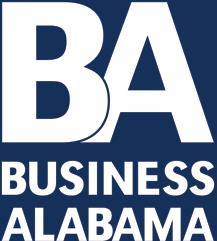

Alabama’s Legal Elite
Sports = Serious Business
Alabama’s Public Companies & CEO Paychecks
Geographic Spotlight: Limestone & Morgan Counties SEPTEMBER

by ERICA JOINER WEST

Montgomery Whitewater Park has received the 2025 Grand Prize Engineering Excellence Award presented by the American Council of Engineering Companies of Alabama, as well as receiving the ACEC National Recognition Award for its design and economic impact. Goodwyn Mills Cawood and Calibre-S2O provided engineering services on the project. Southern Whitewater Development Group developed the 120-acre facility.
The town of Ardmore Water Works and Sewer Board has been presented the Excellence in System Partnership award from the U.S. Environmental Protection Agency’s George F. Ames Performance and Innovation in the SRF Creating Environmental Success program.
Austal USA has earned the American Equity Underwriter’s Excellence in Safety Award for 2024, the sixth such award this decade. Austal also won safety kudos from the Shipbuilders Council of America.
Construction Partners Inc., of Dothan, has been awarded a Silver Telly Award in the general-recruitment category for its Follow the Rock video.
Main Street Anniston has been officially designated a 2025 Accredited Main Street America program.
Regions Bank has been rated number one in customer satisfaction among traditional banks by the American Customer Satisfaction Index 2025 Finance and Insurance Study.
Geographic
Three Alabama companies, Stone Building Co., BL Harbert International and Brasfield & Gorrie, received Baldwin Group Build America Awards at the Associated General Contractors National Convention. The Baldwin awards highlight the nation’s most significant construction projects.
The Chamber of Commerce of West Alabama is celebrating 125 years of service. The chamber was founded in 1900.
Asphalt Contractor has named Command Alkon’s Material Supply with Ticket Accounting a Top 30 Editor’s Choice award winner. In addition, the company’s Batch AI has won the 2025 Concrete Contractor Top Products award.
Sozo Children, a Birmingham-based ministry serving vulnerable children in Uganda, is celebrating its 15th anniversary. The ministry’s upscale thrift store, Sozo Trading Co., has been in business 10 years.
The University of Alabama in Huntsville has been selected as an initial member of the Boeing Digital & Systems Engineering University Partnership. It is one of six universities selected and the only one from Alabama.
USA Health Providence Hospital’s Wound Care & Hyperbarics has received the Center of Distinction Award and the Robert A. Warriner III, M.D., Clinical Excellence Award from Healogics.

This photo from the Library of Congress shows what the caption calls a typical worker in Barker Cotton Mills in Mobile. Though undated, other photos from the mill are dated 1914. The mill opened in 1900 in a portion of Mobile that is now Prichard. The mill, then called Cotton Mills Products Co., burned in 1943.
Do you have a photo you’d like us to consider for Historic Alabama? Send it to Erica West at ewest@pmtpublishing.com.
July 2025:
Q: Each summer we rank Alabama’s largest private companies by sales. The company at the top has been there for three of the past five years. What company? Careful, these are all contenders.
A) Brasfield & Gorrie
B) Coca-Cola Bottling Co. United
C) Ebsco Industries
D) O’Neal Industries
June 2025 (one month ago):
Q: Sylacauga-based Pursell Agri-Tech has partnered with Wastech Group to build a plant in Malaysia. What will the firms make?
A) Computer chips
B) Fertilizer
C) Socks
D) Wood pellets
Challenge yourself with these puzzlers from past issues of Business Alabama magazine. Beginning July 21, work the quiz online and check your answers at businessalabama.com.
July 2024 (one year ago):
Q: Many hospitals are trimming services. Bucking that trend, one beefed up its labor and delivery care to include a Level II neonatal nursery. Which hospital?
A) Andalusia Health
B) Cullman Regional
C) Mizell Memorial
D) Whitfield Regional
July 2020 (five years ago):
Q: Commerce Secretary Greg Canfield announced a startling 170% year-over-year increase in exports of a particular Alabama product to China. What product?
A) Chickens
B) Coal
C) Mercedes-Benz vehicles
D) Timber
July 2015 (10 years ago):
Q: Our July issue featured one of Alabama’s older family-owned businesses, based in Birmingham and selling its products coast-to-coast — from Frank Stitt’s restaurants to the Ritz-Carlton to Waffle House. What company?
A) Alabama Linen Supply
B) Chef Delight Kitchen Ware
C) Royal Cup Coffee
D) Sister Schubert’s
July 2000 (25 years ago):
Q: Three of Alabama’s cities were bracing for the impact of a major new auto plant. The cities are Lincoln, Talladega and Pell City. What’s the plant, now one of Alabama’s top three manufacturing employers?
A) Honda
B) Hyundai
C) Mazda Toyota
D) Mercedes-Benz
